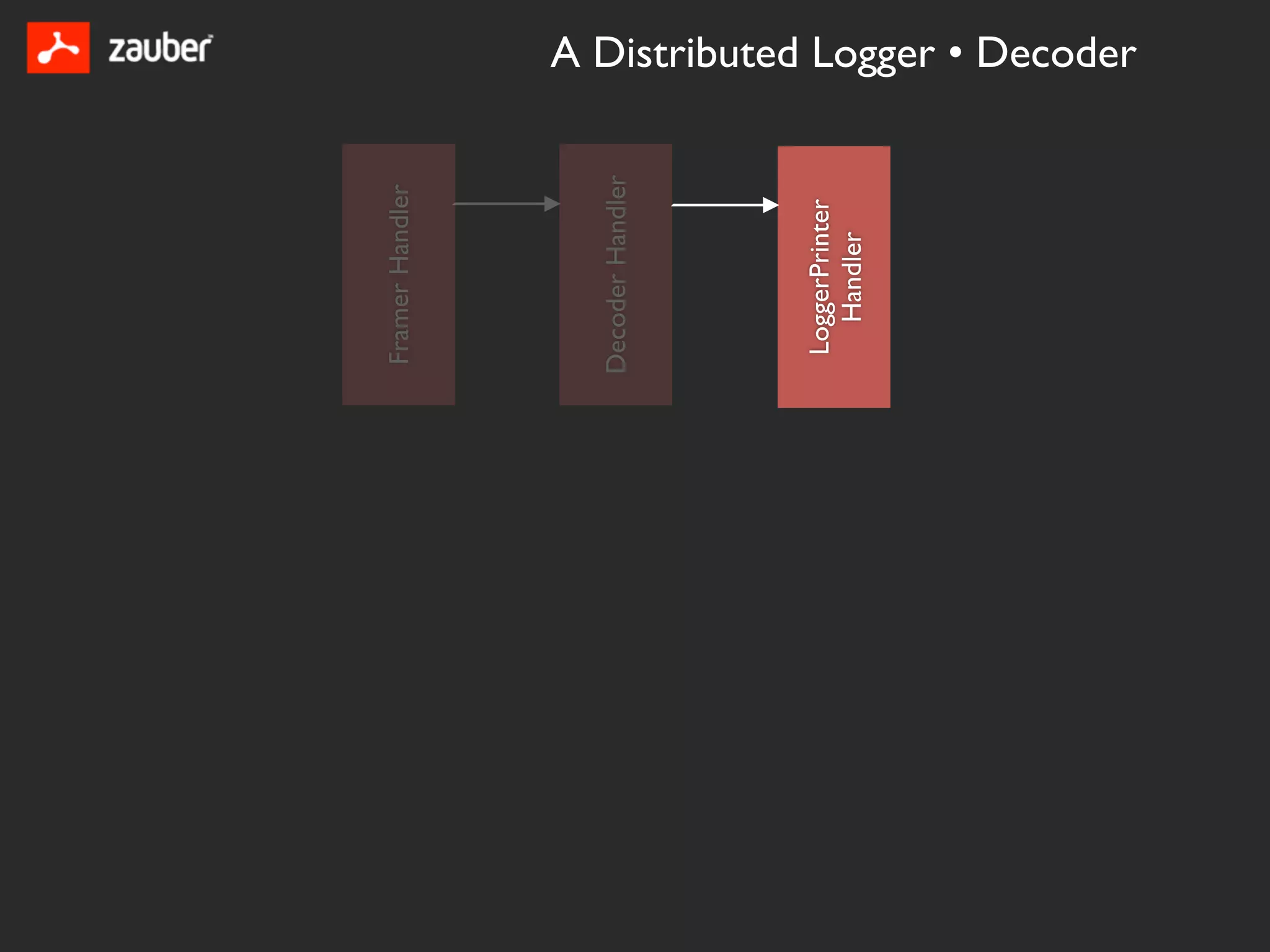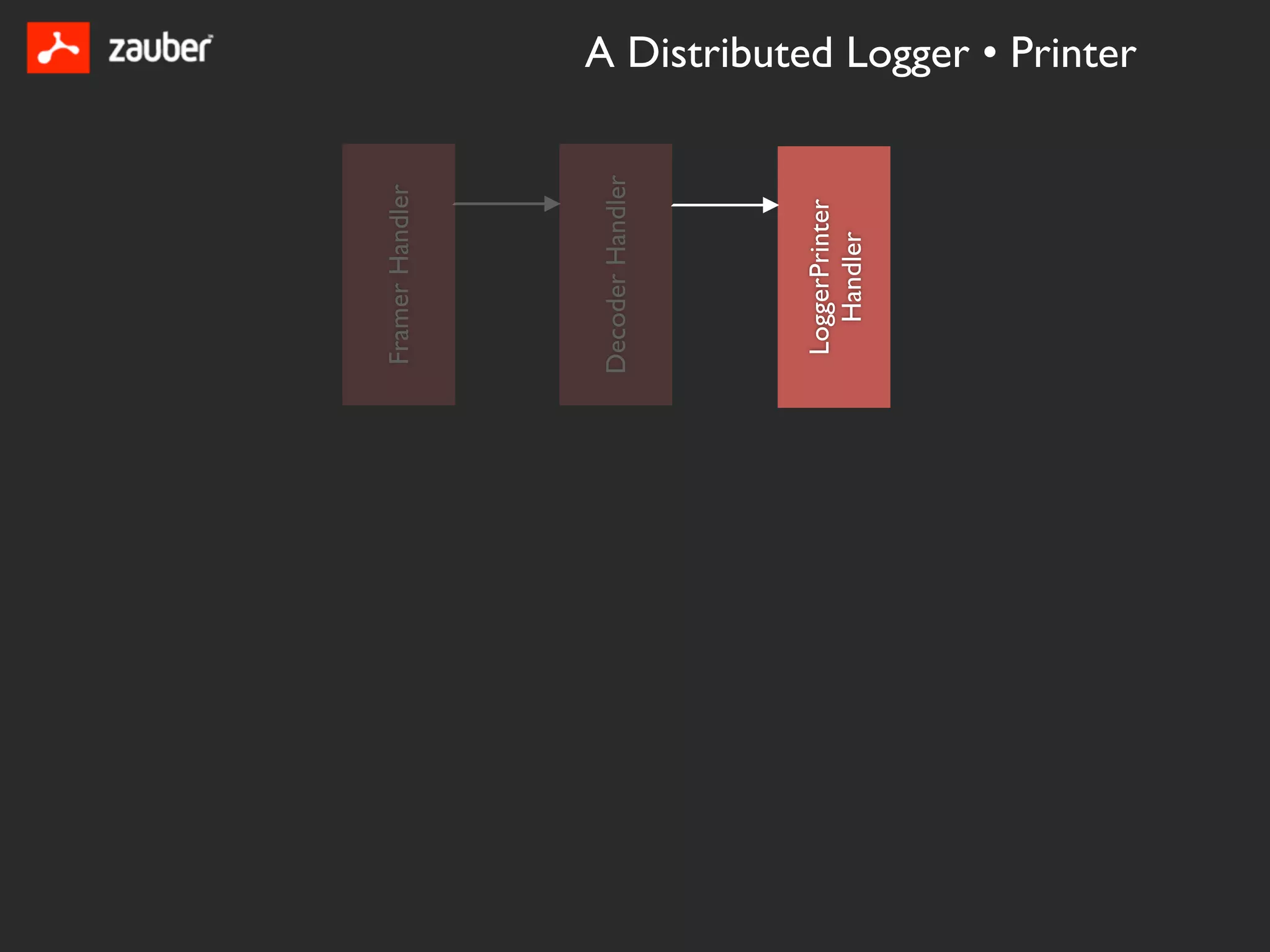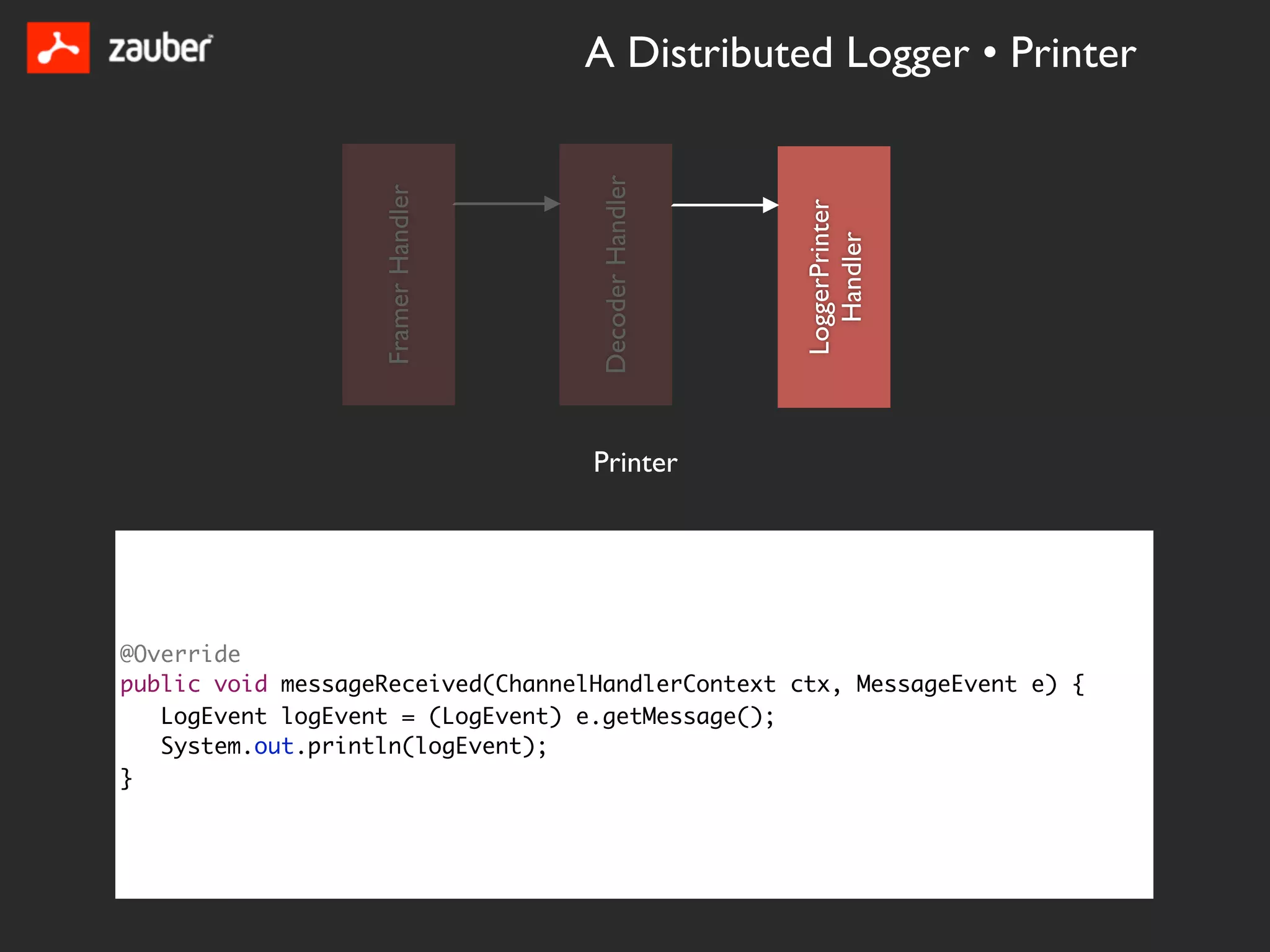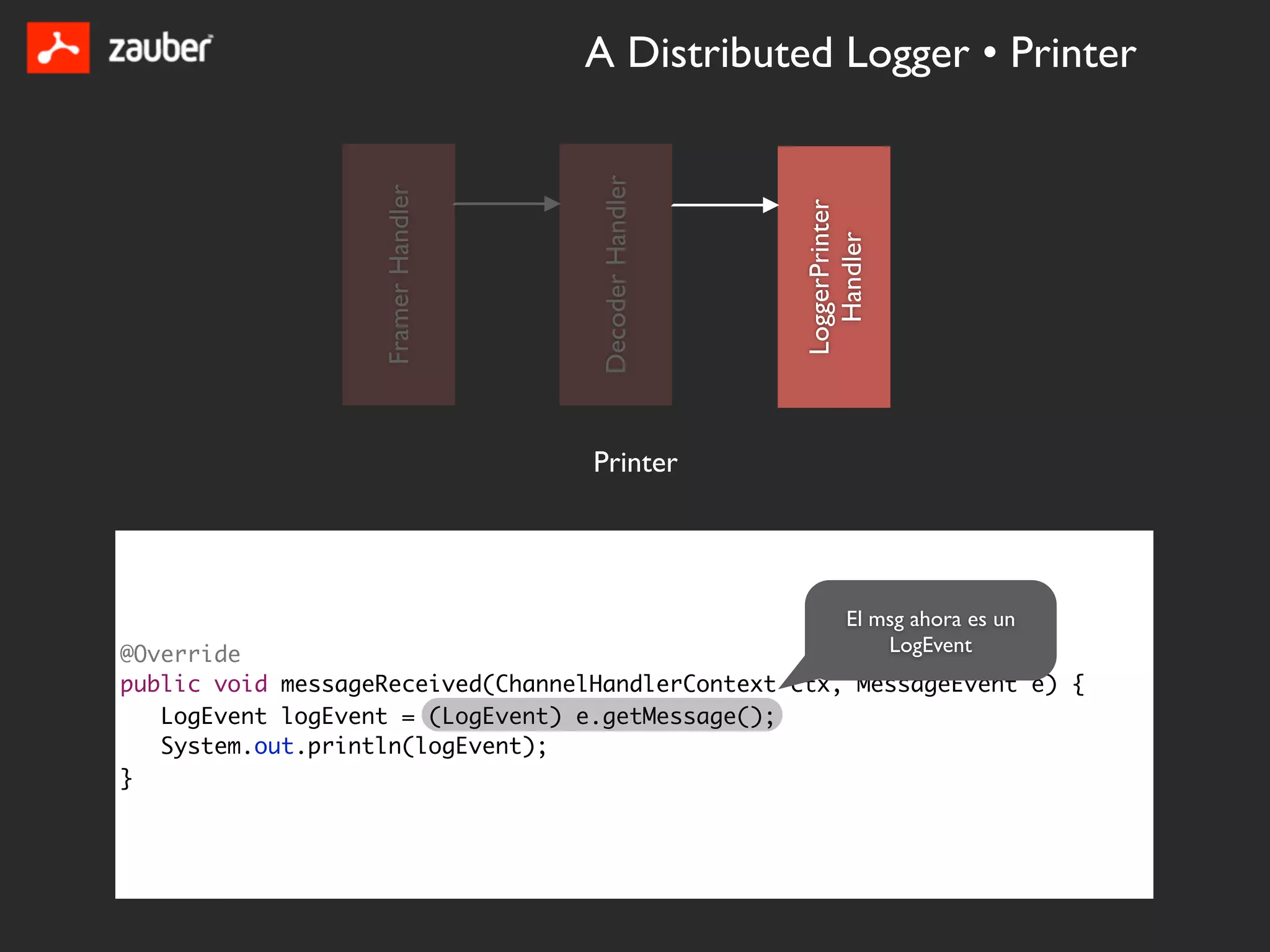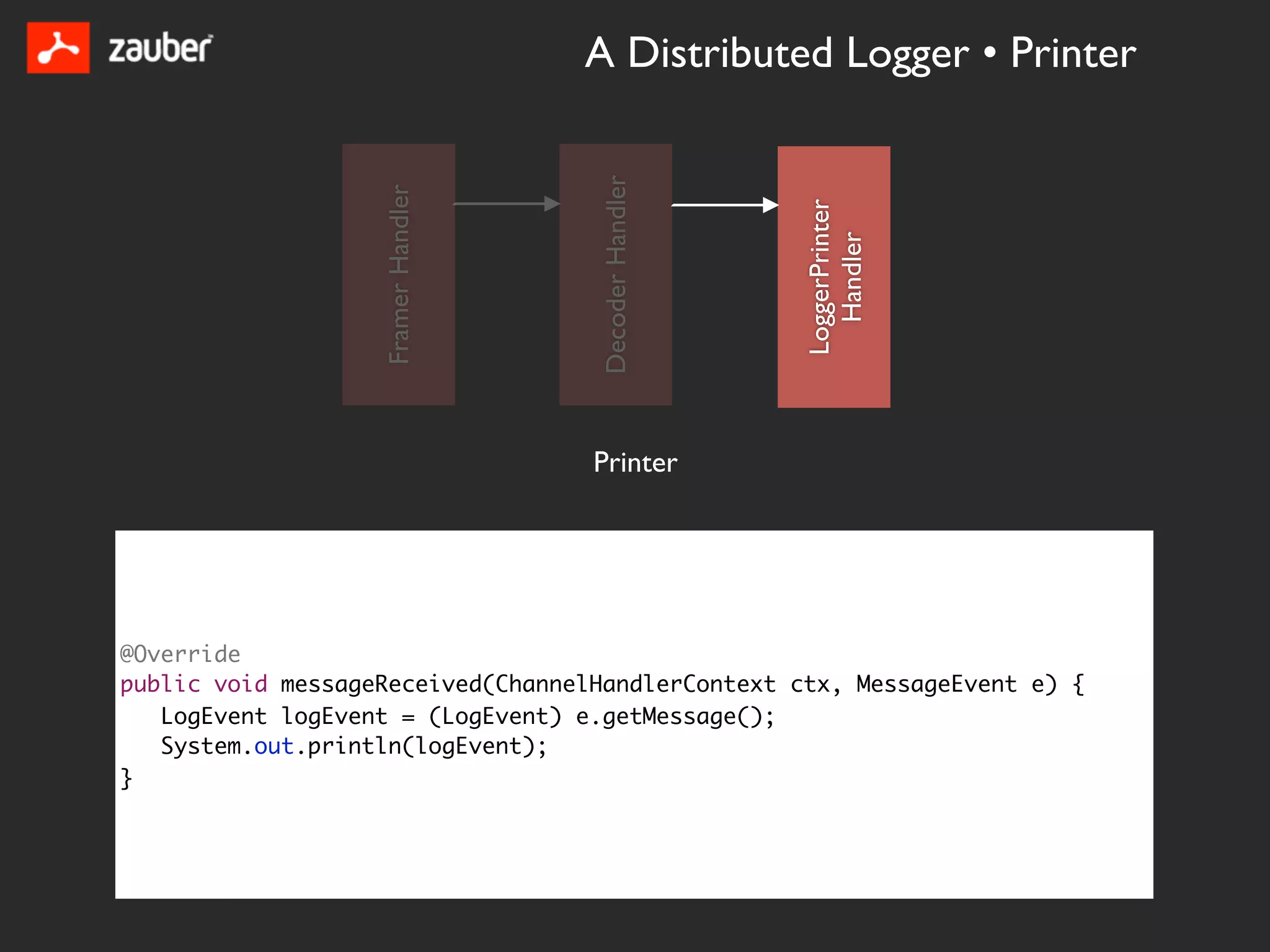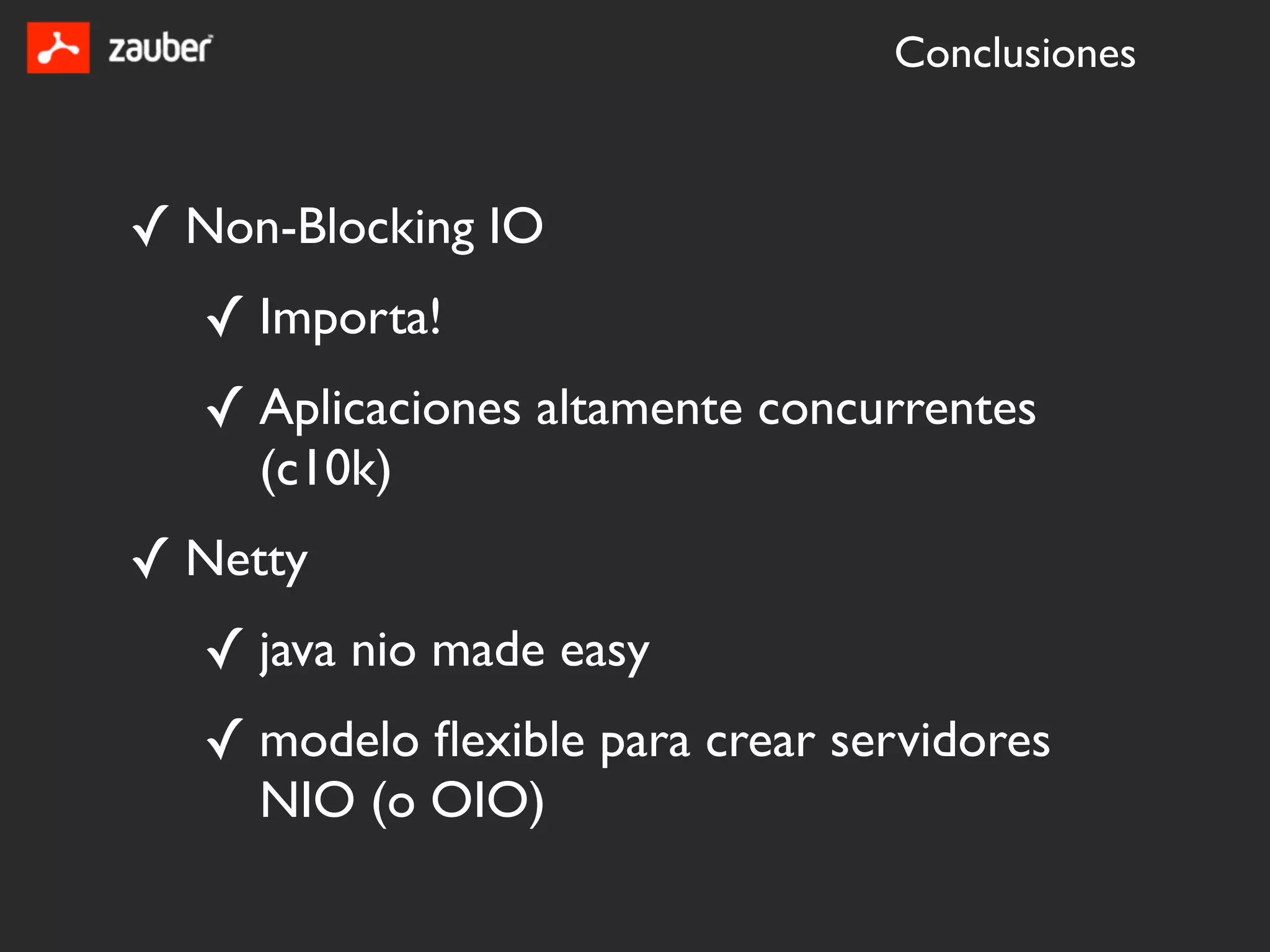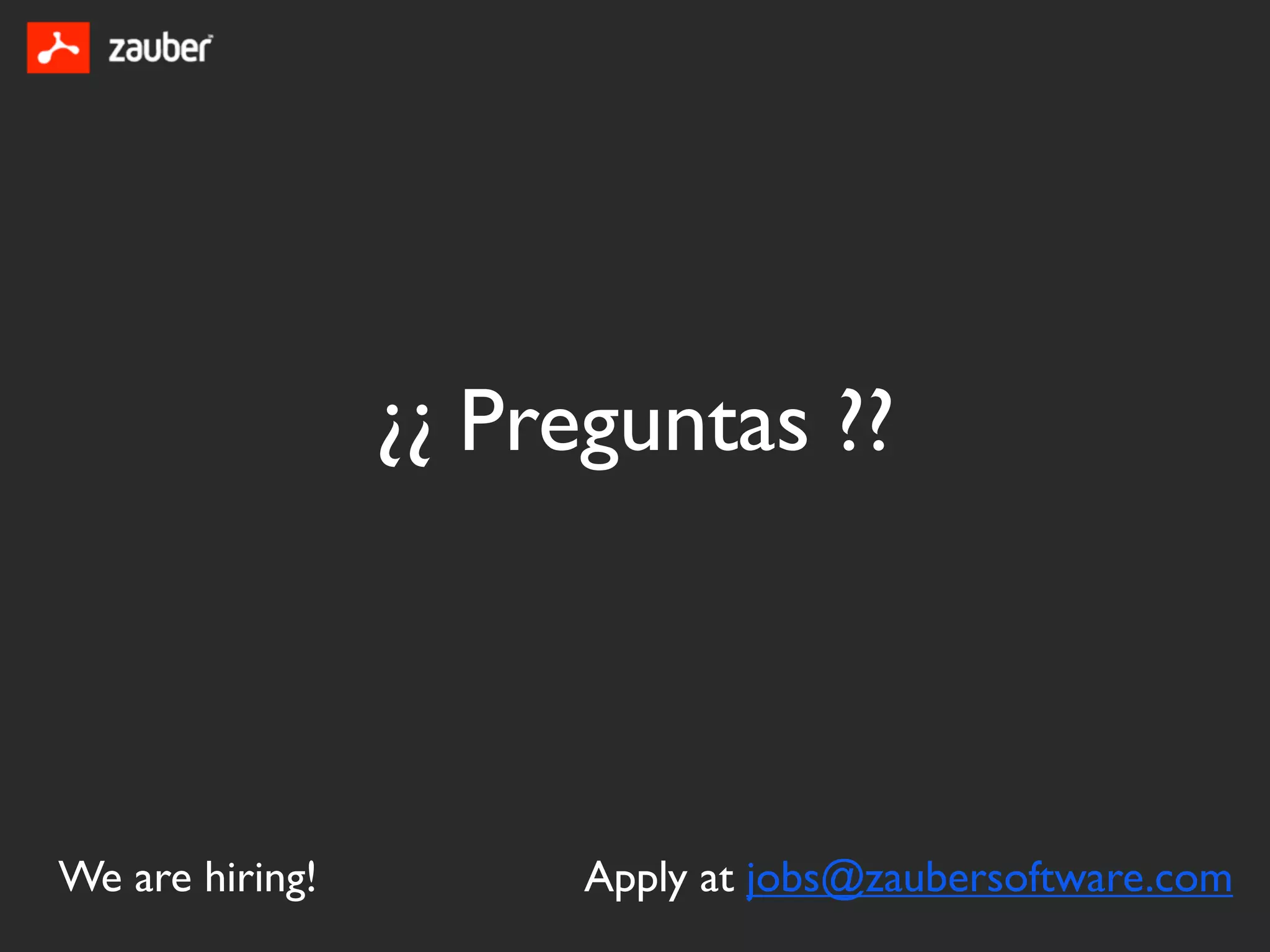This document discusses non-blocking I/O and the traditional blocking I/O approach for building servers. The traditional approach uses one thread per connection, blocking I/O, and a simple programming model. However, this can cause issues like shared state between clients, synchronization problems, inability to prioritize clients, difficulty scaling to thousands of connections, and challenges with persistent connections. The document explores using non-blocking I/O with Netty as an alternative.
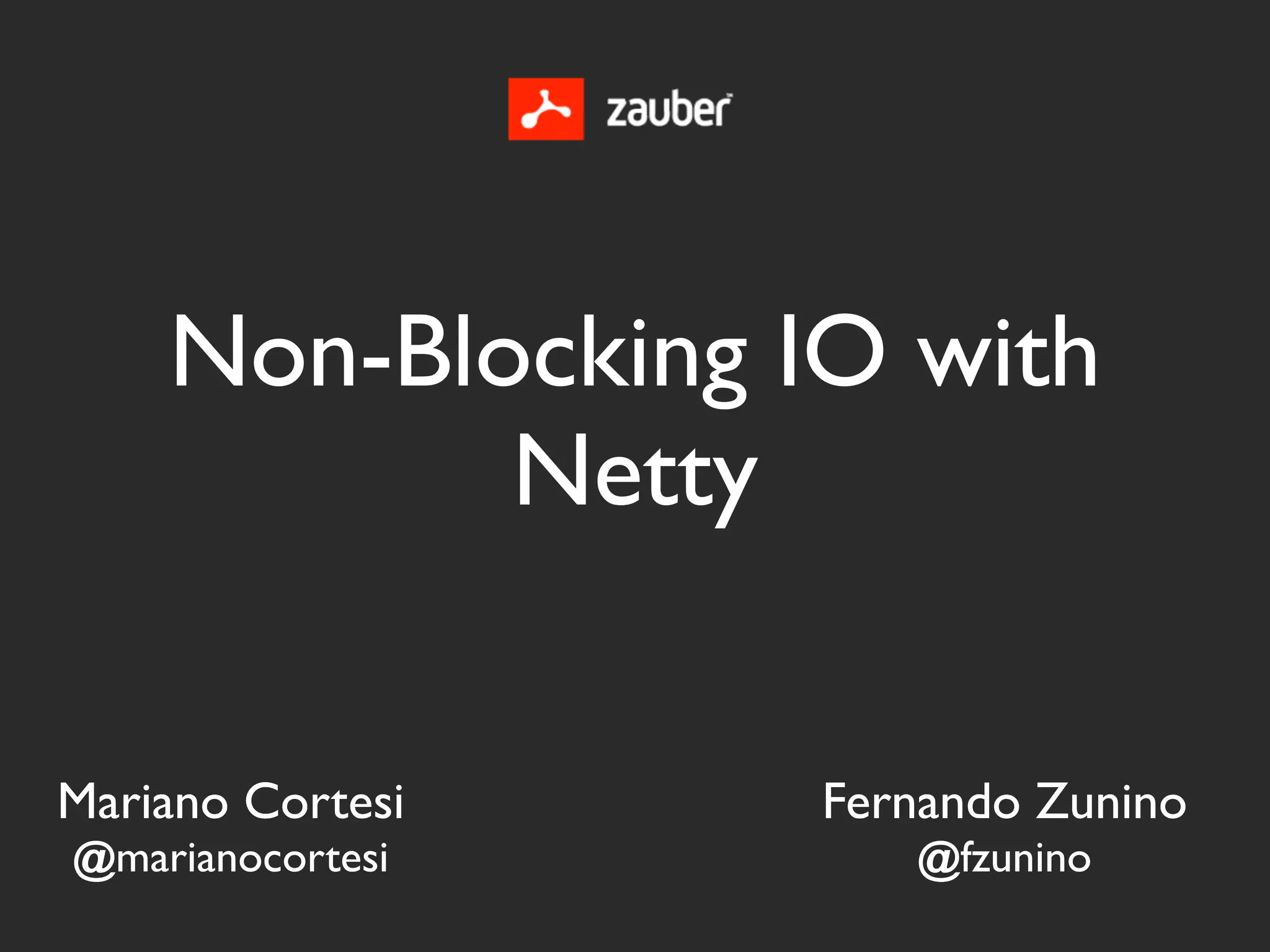
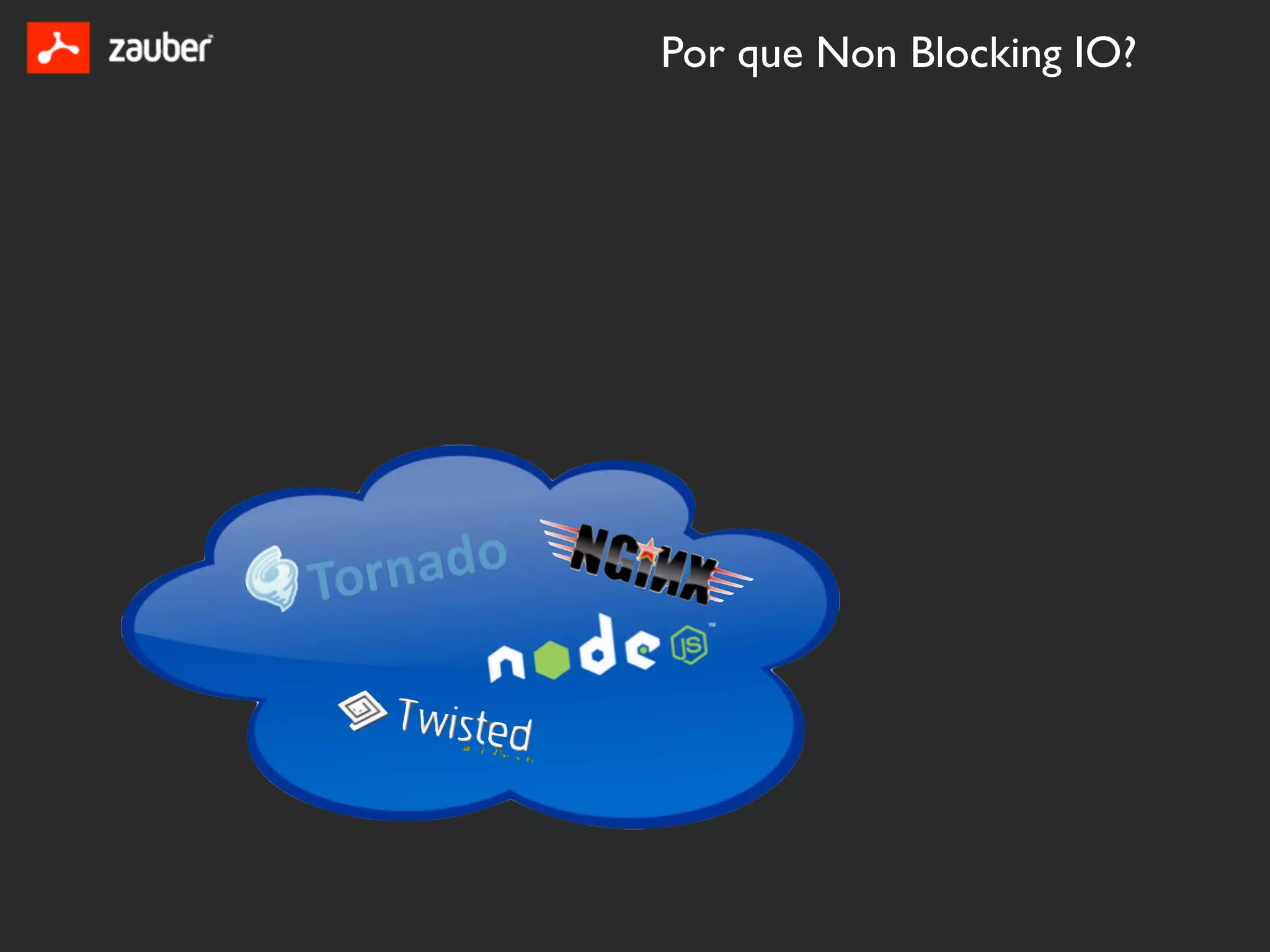
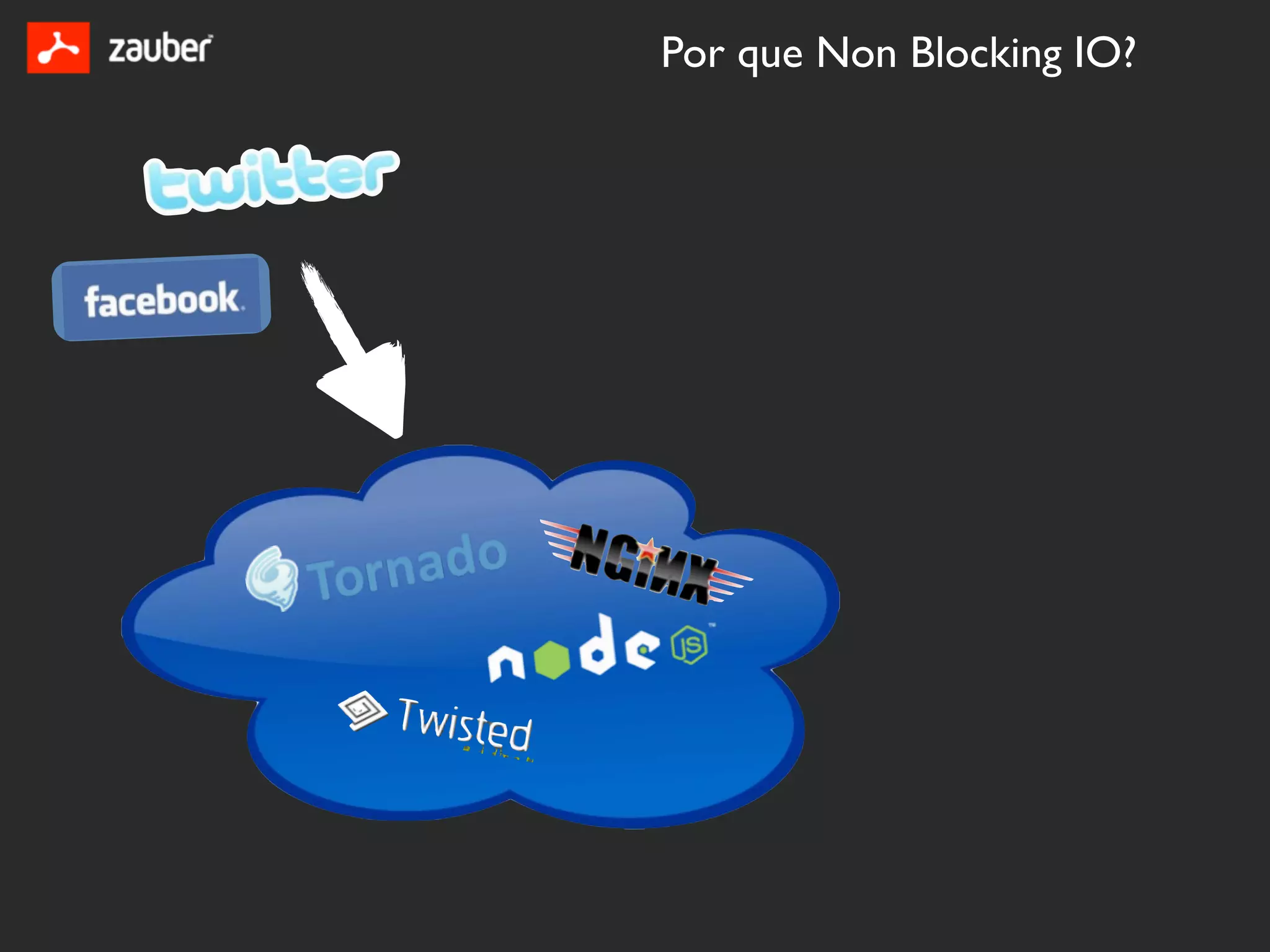
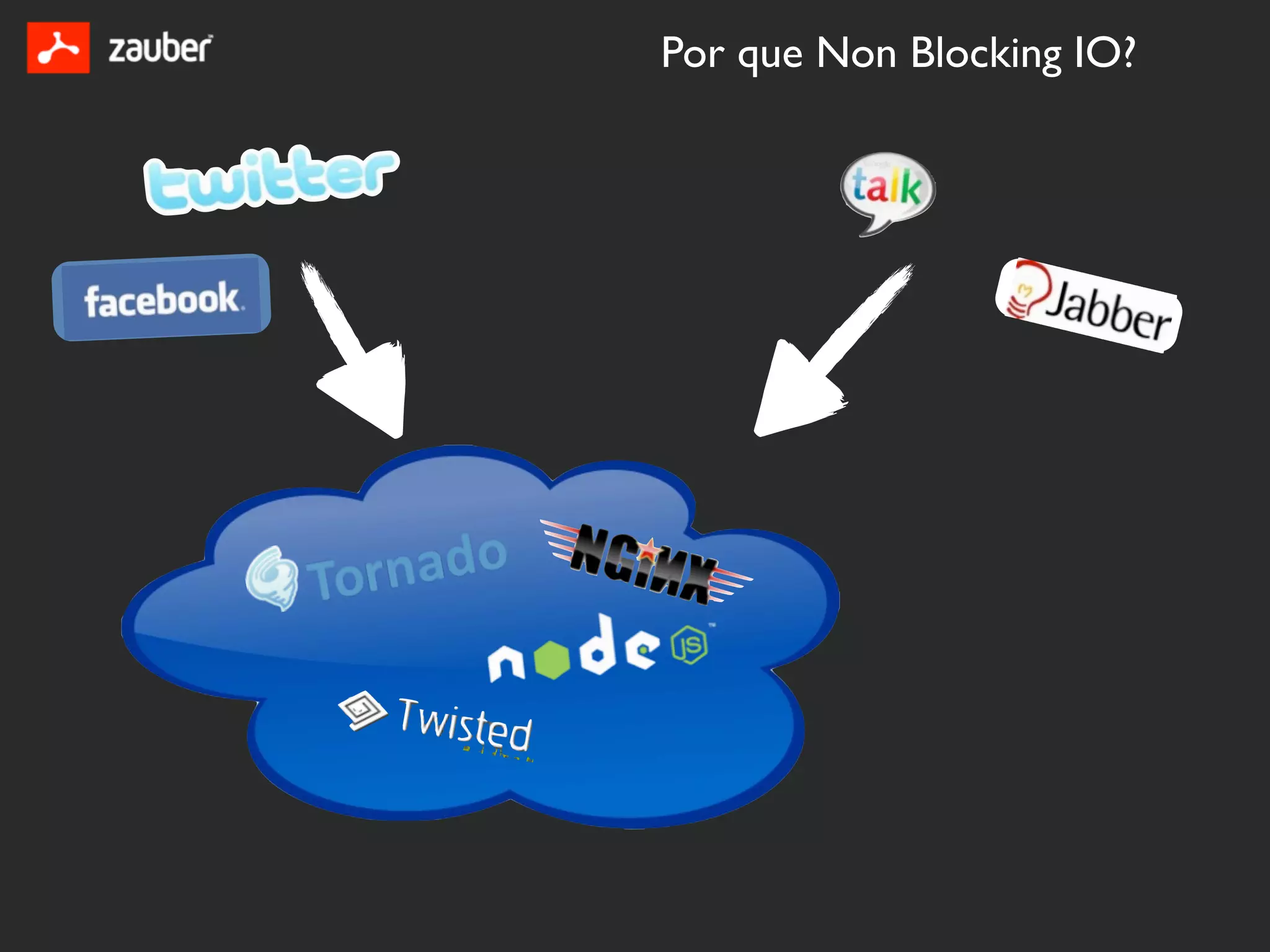
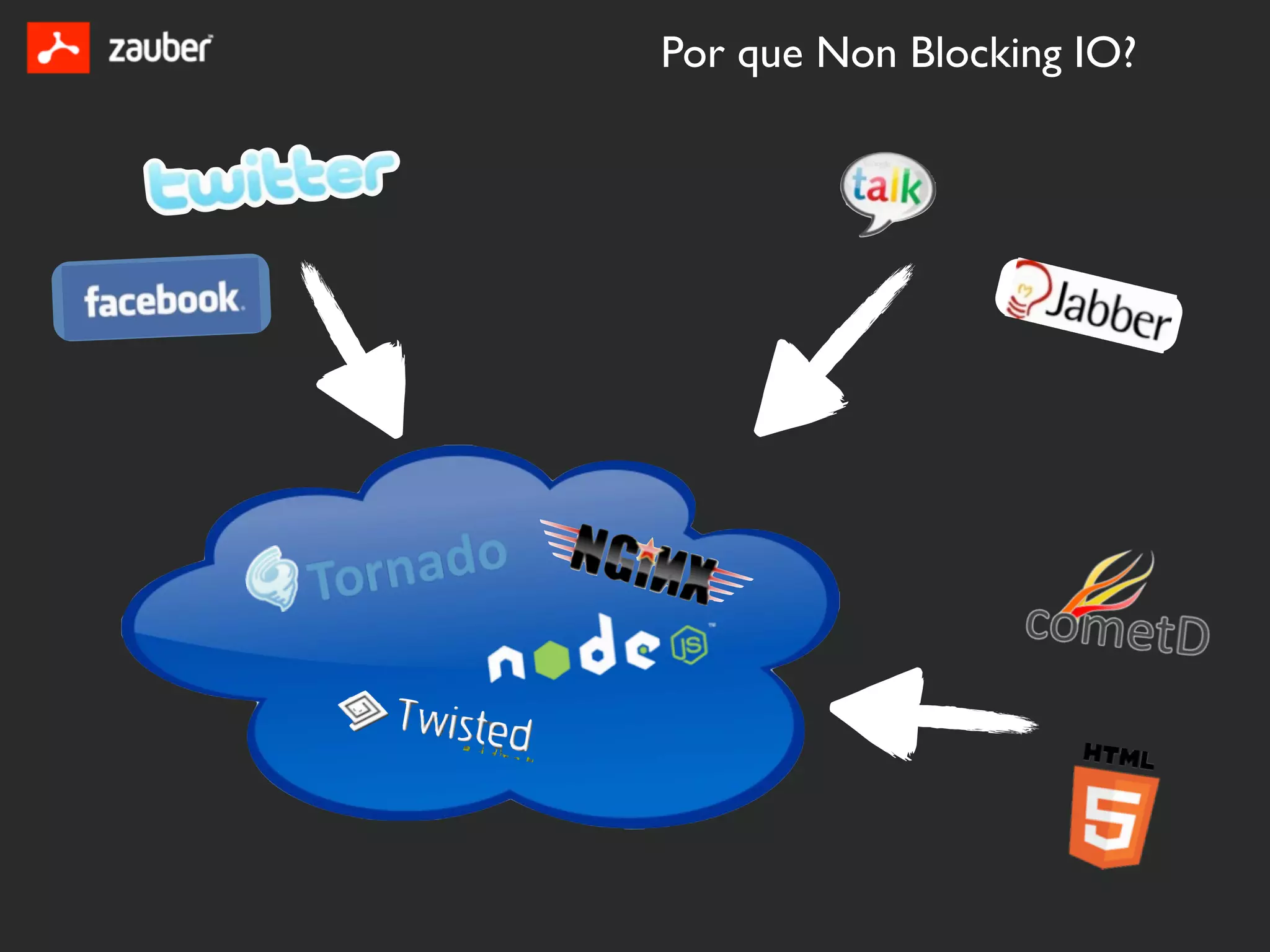
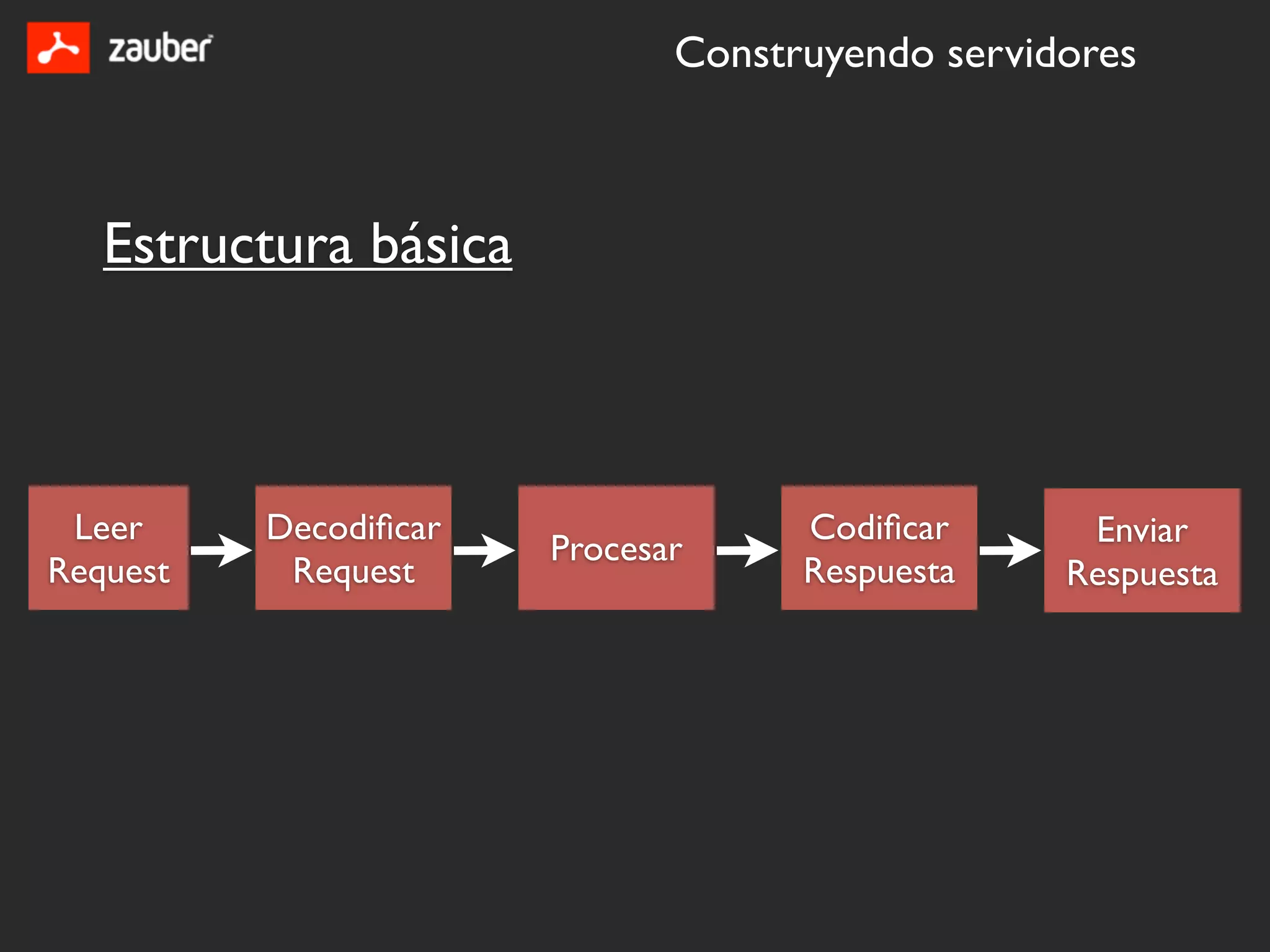
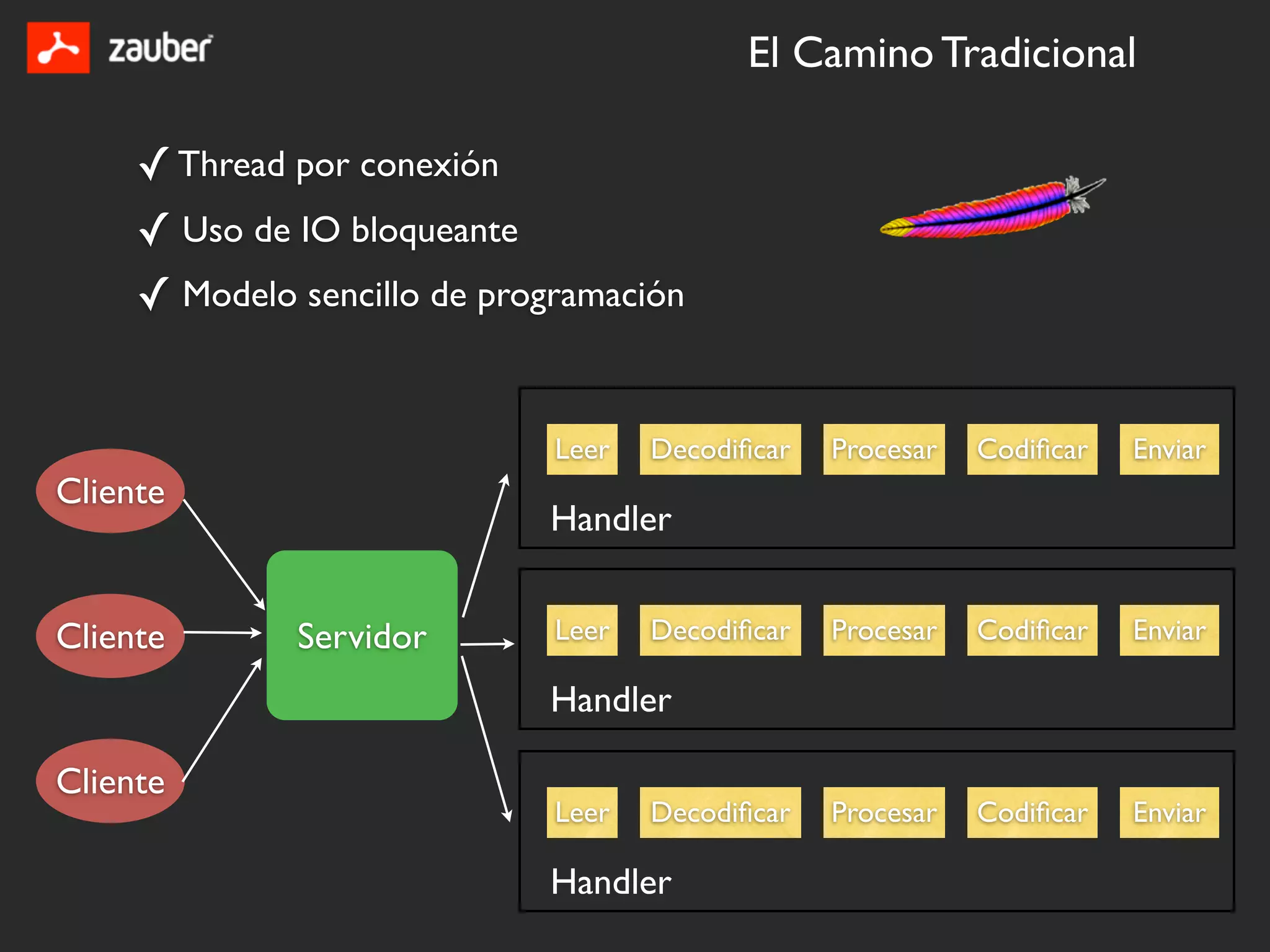
![An Echo Server • Java OIO public class ThreadPoolEchoServer { public static void main(String[] args) throws IOException { ServerSocket servSock = new ServerSocket(20007); Executor service = Executors.newCachedThreadPool(); while (!Thread.interrupted()) { Socket clntSock = servSock.accept(); service.execute(new EchoWorker(clntSock)); } } }](https://image.slidesharecdn.com/nonblockingiowithnetty-111102141510-phpapp02/75/Non-blocking-io-with-netty-8-2048.jpg)
![An Echo Server • Java OIO public class ThreadPoolEchoServer { Inicialización de socket para escucha public static void main(String[] args) throws IOException { ServerSocket servSock = new ServerSocket(20007); Executor service = Executors.newCachedThreadPool(); while (!Thread.interrupted()) { Socket clntSock = servSock.accept(); service.execute(new EchoWorker(clntSock)); } } }](https://image.slidesharecdn.com/nonblockingiowithnetty-111102141510-phpapp02/75/Non-blocking-io-with-netty-9-2048.jpg)
![An Echo Server • Java OIO public class ThreadPoolEchoServer { public static void main(String[] args) throws IOException { Inicialización de ServerSocket servSock = new ServerSocket(20007); pool de threads Executor service = Executors.newCachedThreadPool(); while (!Thread.interrupted()) { Socket clntSock = servSock.accept(); service.execute(new EchoWorker(clntSock)); } } }](https://image.slidesharecdn.com/nonblockingiowithnetty-111102141510-phpapp02/75/Non-blocking-io-with-netty-10-2048.jpg)
![An Echo Server • Java OIO public class ThreadPoolEchoServer { public static void main(String[] args) throws IOException { ServerSocket servSock = new ServerSocket(20007); Executor service = Executors.newCachedThreadPool(); while (!Thread.interrupted()) { Se acepta conexión Socket clntSock = servSock.accept(); service.execute(new EchoWorker(clntSock)); } } }](https://image.slidesharecdn.com/nonblockingiowithnetty-111102141510-phpapp02/75/Non-blocking-io-with-netty-11-2048.jpg)
![An Echo Server • Java OIO public class ThreadPoolEchoServer { public static void main(String[] args) throws IOException { ServerSocket servSock = new ServerSocket(20007); Executor service = Executors.newCachedThreadPool(); while (!Thread.interrupted()) { Socket clntSock = servSock.accept(); service.execute(new EchoWorker(clntSock)); } } Se ejecuta worker thread }](https://image.slidesharecdn.com/nonblockingiowithnetty-111102141510-phpapp02/75/Non-blocking-io-with-netty-12-2048.jpg)
![An Echo Server • Java OIO public class ThreadPoolEchoServer { public static void main(String[] args) throws IOException { ServerSocket servSock = new ServerSocket(20007); Executor service = Executors.newCachedThreadPool(); while (!Thread.interrupted()) { Socket clntSock = servSock.accept(); service.execute(new EchoWorker(clntSock)); } } }](https://image.slidesharecdn.com/nonblockingiowithnetty-111102141510-phpapp02/75/Non-blocking-io-with-netty-13-2048.jpg)
![An Echo Server • Java OIO public class EchoWorker implements Runnable { public EchoWorker(final Socket s) { this.socket = s; } public void run() { try { InputStream in = this.socket.getInputStream(); OutputStream out = this.socket.getOutputStream(); int recvMsgSize; byte[] receiveBuf = new byte[256]; while ((recvMsgSize = in.read(receiveBuf)) != -1) { out.write(receiveBuf, 0, recvMsgSize); } } catch (IOException e) { // ... } finally { try { this.socket.close(); } catch (IOException e) { // ... } } } }](https://image.slidesharecdn.com/nonblockingiowithnetty-111102141510-phpapp02/75/Non-blocking-io-with-netty-14-2048.jpg)
![An Echo Server • Java OIO public class EchoWorker implements Runnable { public EchoWorker(final Socket s) { this.socket = s; } Obtención de Streams de public void run() { entrada y salida try { InputStream in = this.socket.getInputStream(); OutputStream out = this.socket.getOutputStream(); int recvMsgSize; byte[] receiveBuf = new byte[256]; while ((recvMsgSize = in.read(receiveBuf)) != -1) { out.write(receiveBuf, 0, recvMsgSize); } } catch (IOException e) { // ... } finally { try { this.socket.close(); } catch (IOException e) { // ... } } } }](https://image.slidesharecdn.com/nonblockingiowithnetty-111102141510-phpapp02/75/Non-blocking-io-with-netty-15-2048.jpg)
![An Echo Server • Java OIO public class EchoWorker implements Runnable { public EchoWorker(final Socket s) { this.socket = s; } public void run() { try { InputStream in = this.socket.getInputStream(); OutputStream out = this.socket.getOutputStream(); int recvMsgSize; Se lee hasta que el cliente cierre la conexión byte[] receiveBuf = new byte[256]; (bloqueante) while ((recvMsgSize = in.read(receiveBuf)) != -1) { out.write(receiveBuf, 0, recvMsgSize); } } catch (IOException e) { // ... } finally { try { this.socket.close(); } catch (IOException e) { // ... } } } }](https://image.slidesharecdn.com/nonblockingiowithnetty-111102141510-phpapp02/75/Non-blocking-io-with-netty-16-2048.jpg)
![An Echo Server • Java OIO public class EchoWorker implements Runnable { public EchoWorker(final Socket s) { this.socket = s; } public void run() { try { InputStream in = this.socket.getInputStream(); OutputStream out = this.socket.getOutputStream(); int recvMsgSize; byte[] receiveBuf = new byte[256]; while ((recvMsgSize = in.read(receiveBuf)) != -1) { out.write(receiveBuf, 0, recvMsgSize); } Se reenvia lo leido al } catch (IOException e) { // ... cliente (bloqueante) } finally { try { this.socket.close(); } catch (IOException e) { // ... } } } }](https://image.slidesharecdn.com/nonblockingiowithnetty-111102141510-phpapp02/75/Non-blocking-io-with-netty-17-2048.jpg)
![An Echo Server • Java OIO public class EchoWorker implements Runnable { public EchoWorker(final Socket s) { this.socket = s; } public void run() { try { InputStream in = this.socket.getInputStream(); OutputStream out = this.socket.getOutputStream(); int recvMsgSize; byte[] receiveBuf = new byte[256]; while ((recvMsgSize = in.read(receiveBuf)) != -1) { out.write(receiveBuf, 0, recvMsgSize); } } catch (IOException e) { // ... } finally { try { this.socket.close(); } catch (IOException e) { // ... } el socket Se cierra } } }](https://image.slidesharecdn.com/nonblockingiowithnetty-111102141510-phpapp02/75/Non-blocking-io-with-netty-18-2048.jpg)
![An Echo Server • Java OIO public class EchoWorker implements Runnable { public EchoWorker(final Socket s) { this.socket = s; } public void run() { try { InputStream in = this.socket.getInputStream(); OutputStream out = this.socket.getOutputStream(); int recvMsgSize; byte[] receiveBuf = new byte[256]; while ((recvMsgSize = in.read(receiveBuf)) != -1) { out.write(receiveBuf, 0, recvMsgSize); } } catch (IOException e) { // ... } finally { try { this.socket.close(); } catch (IOException e) { // ... } } } }](https://image.slidesharecdn.com/nonblockingiowithnetty-111102141510-phpapp02/75/Non-blocking-io-with-netty-19-2048.jpg)
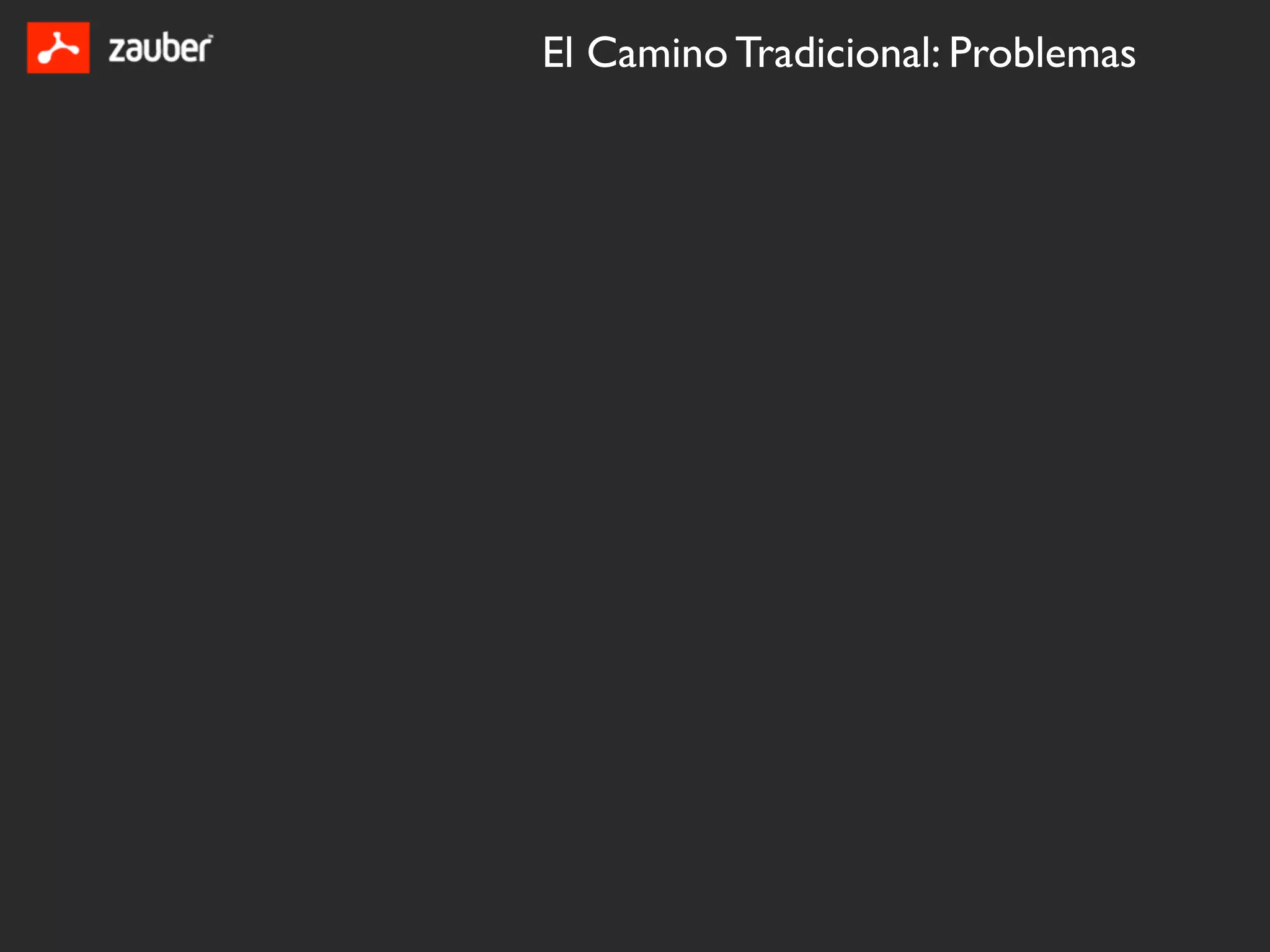
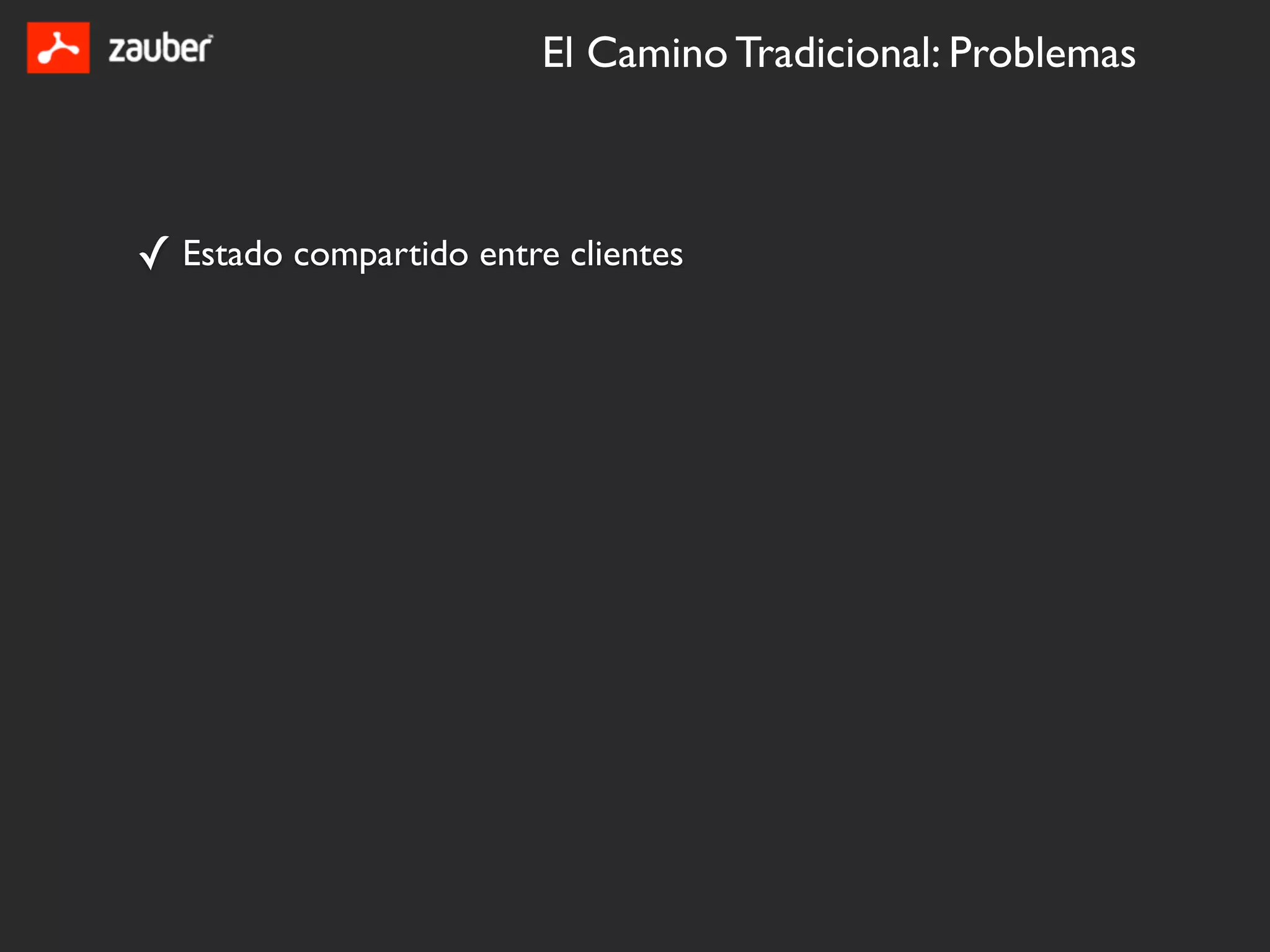
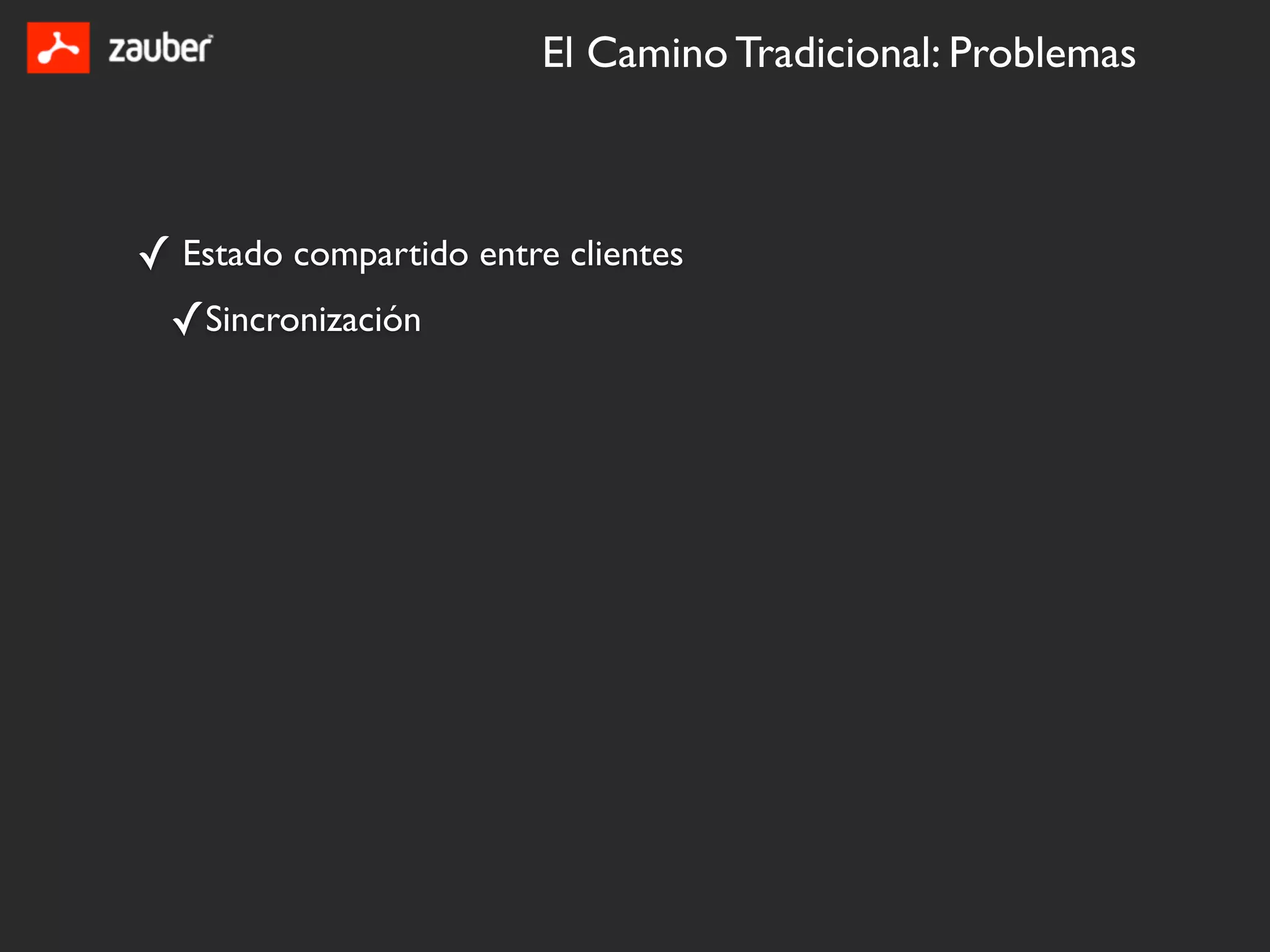
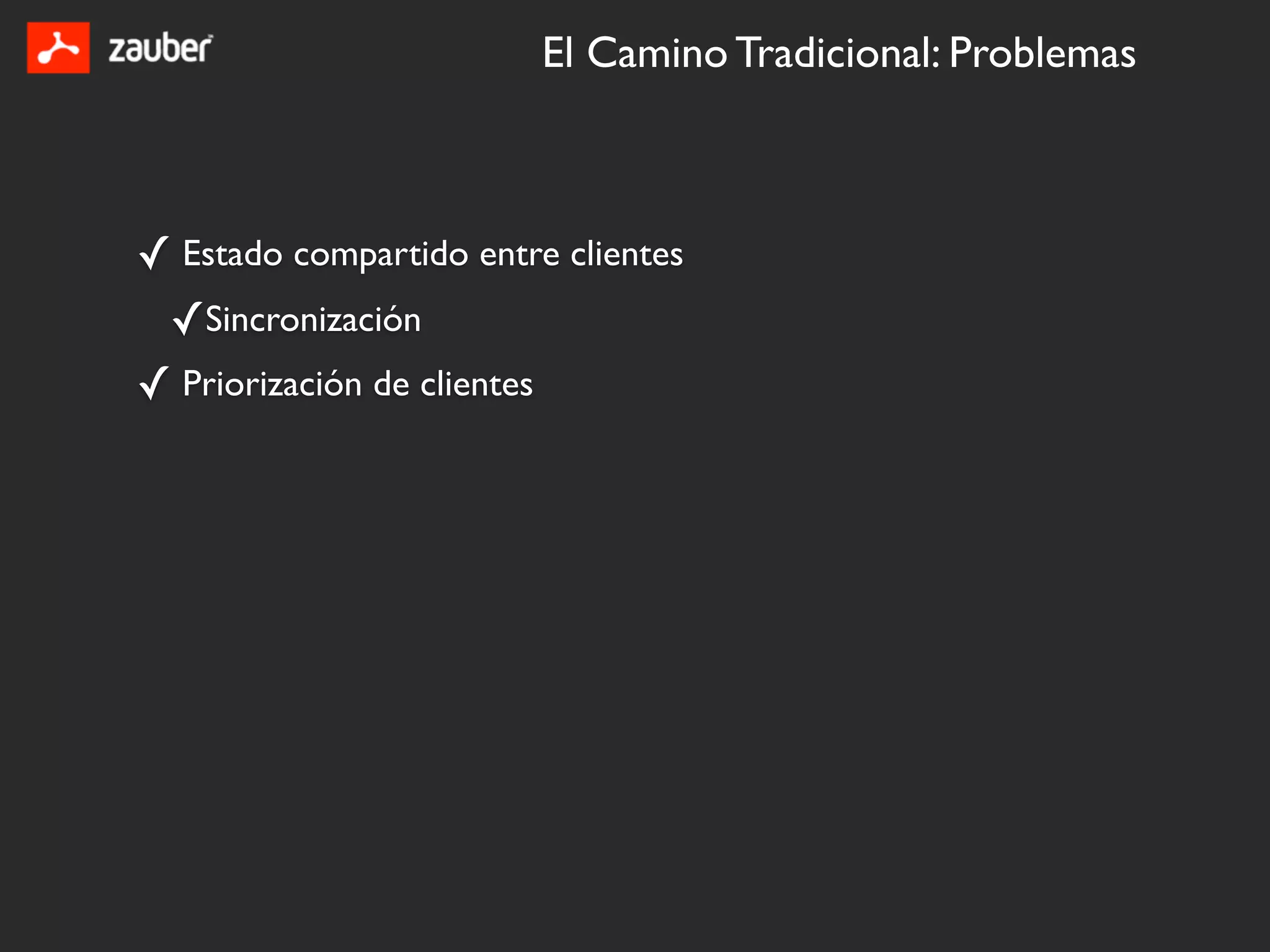
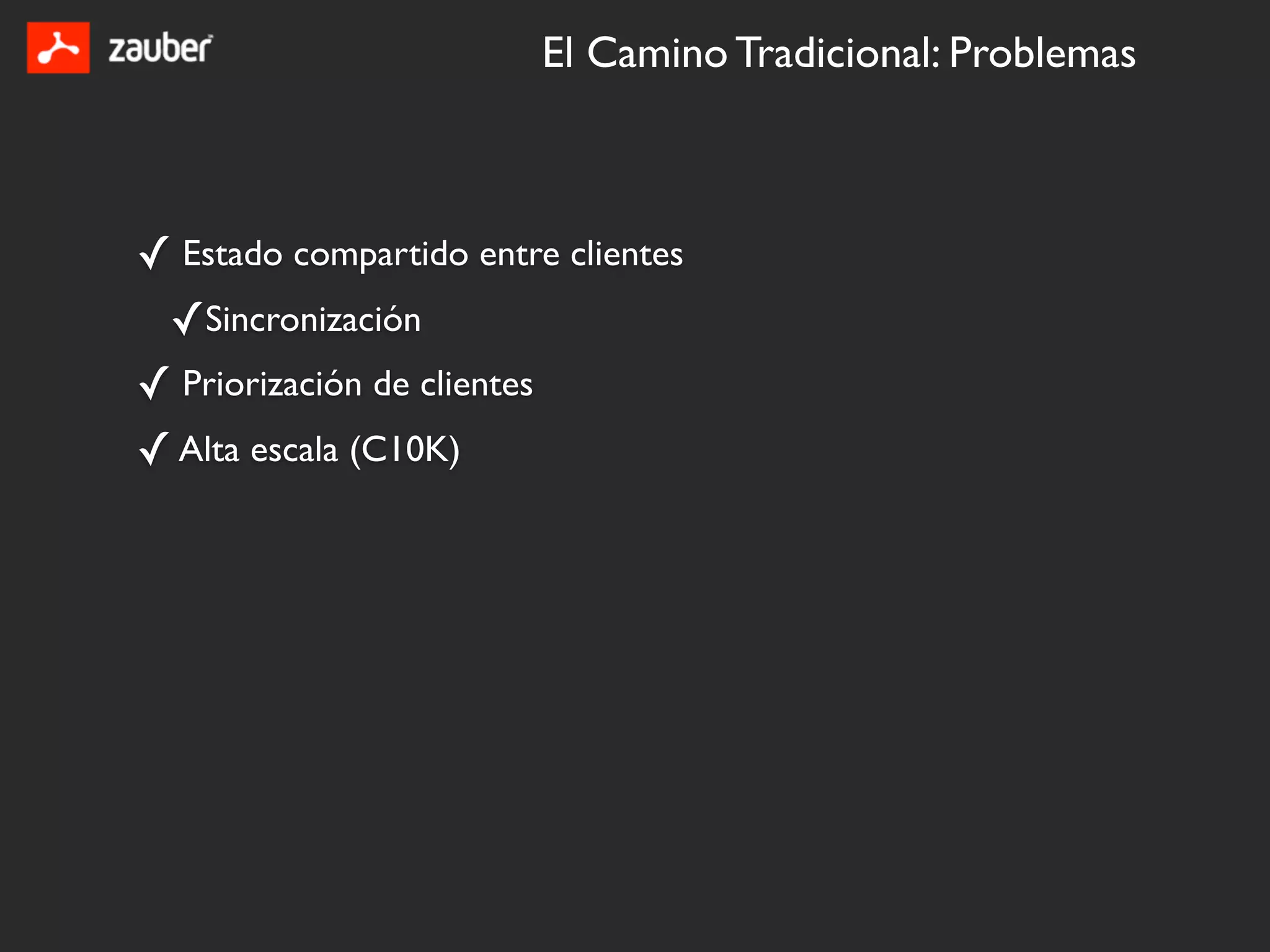
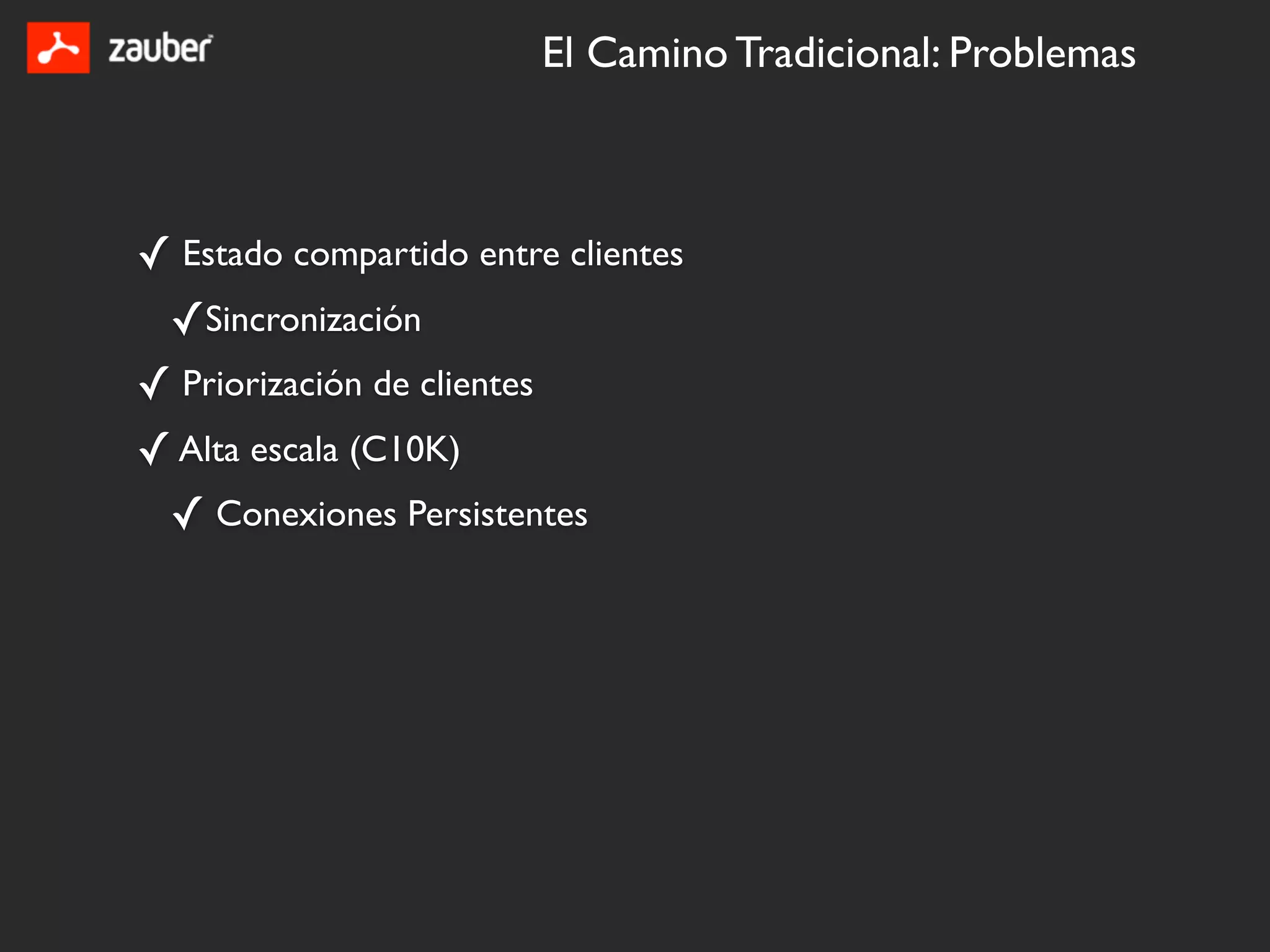
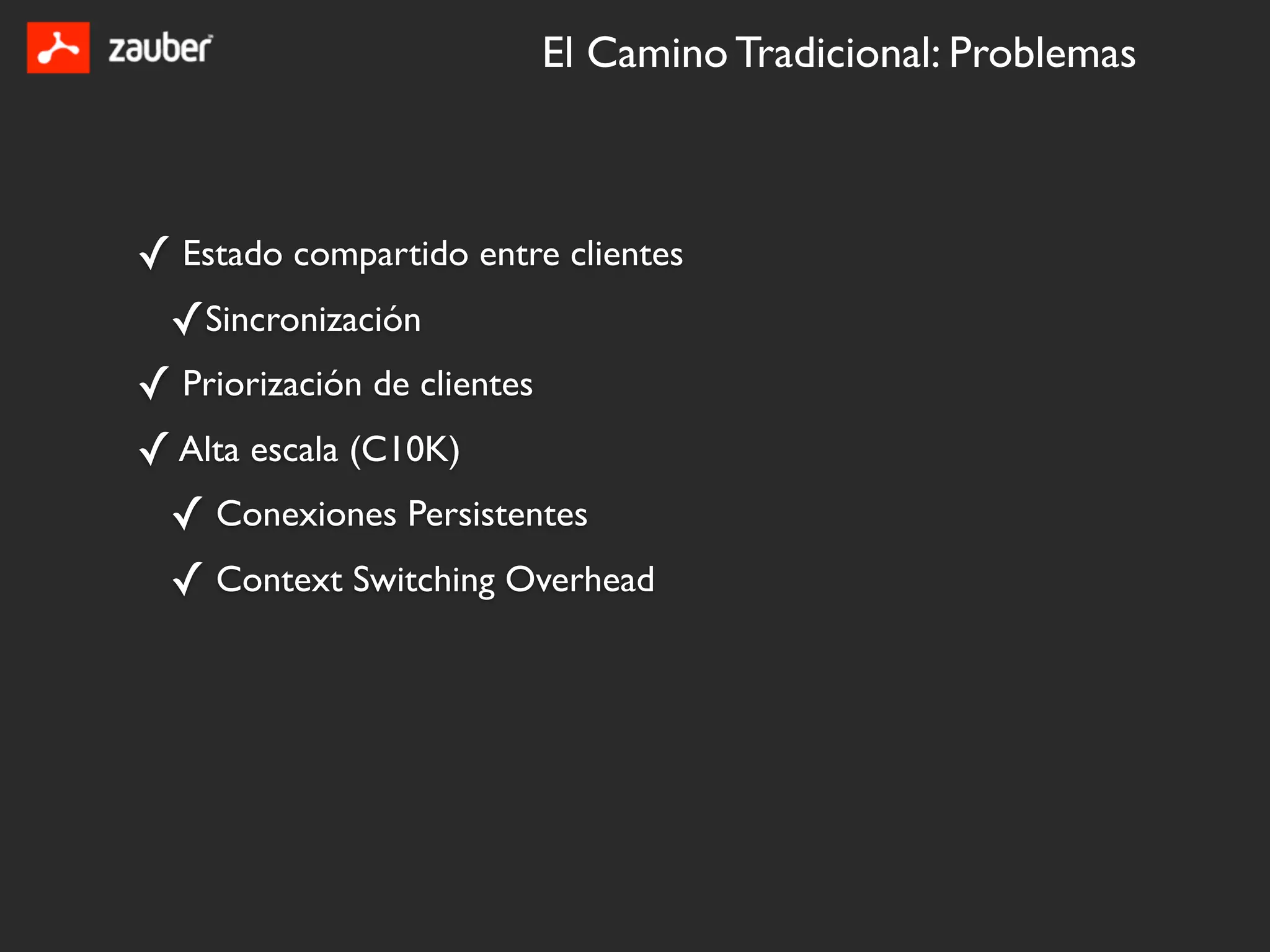
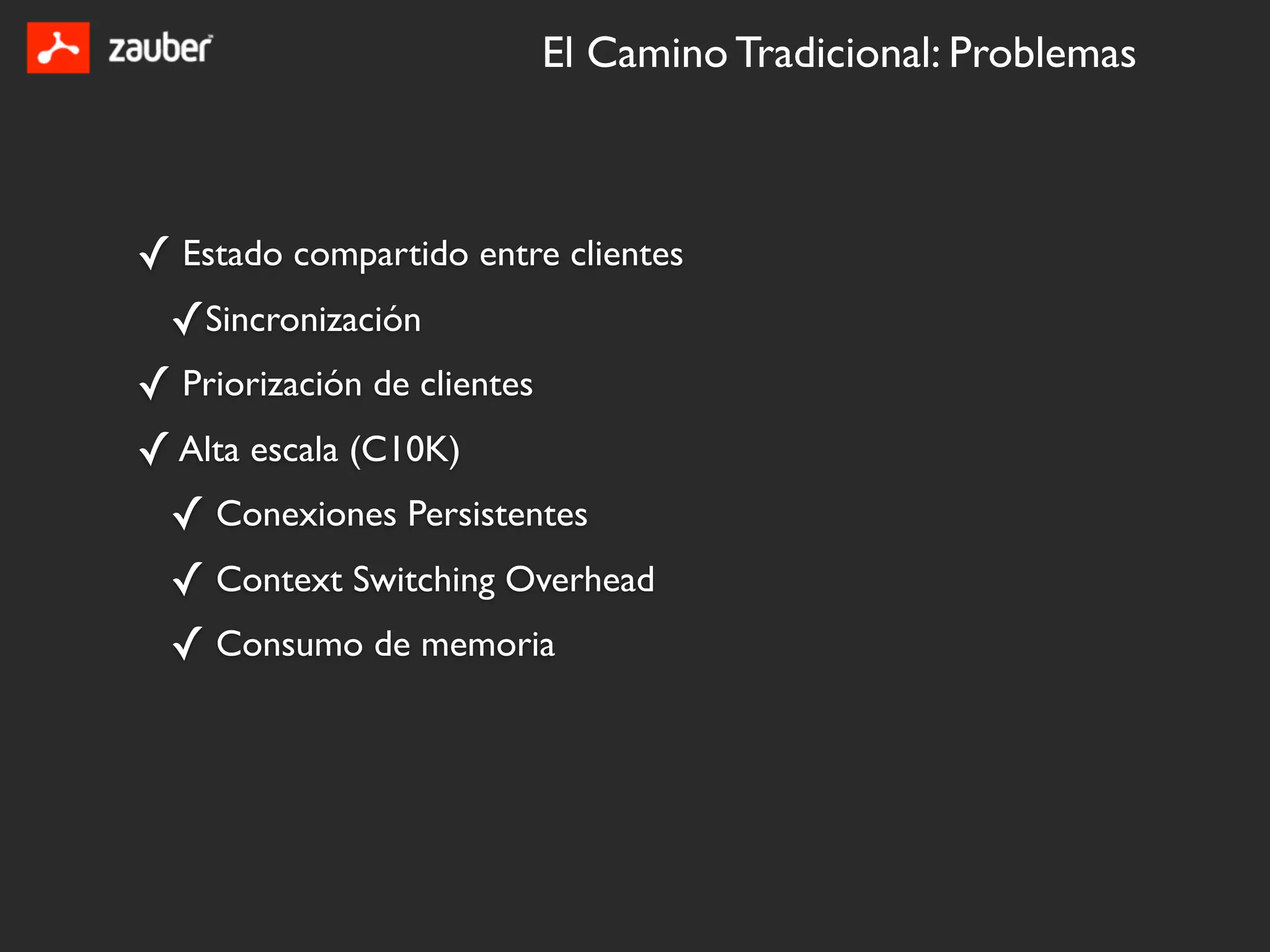
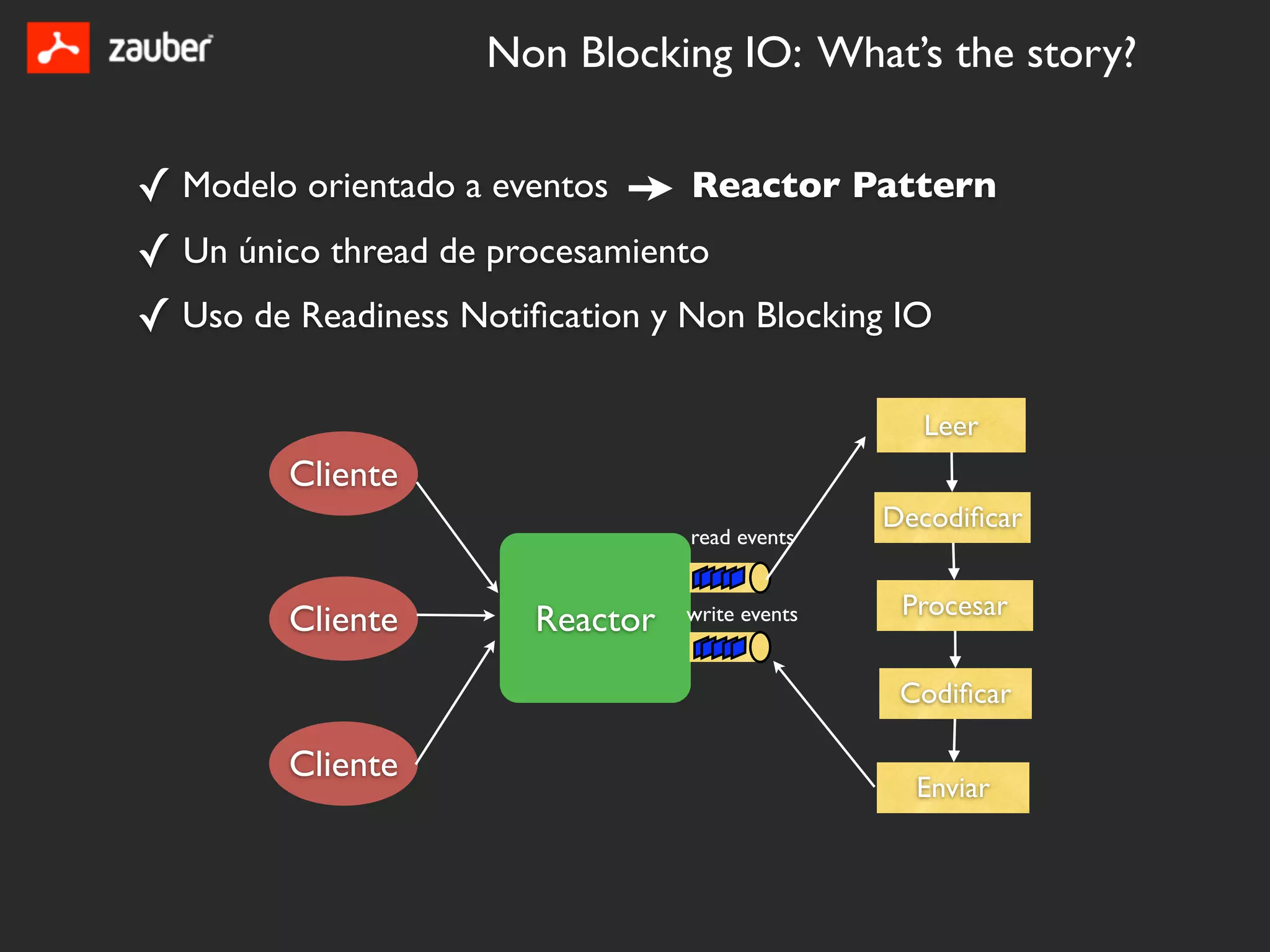
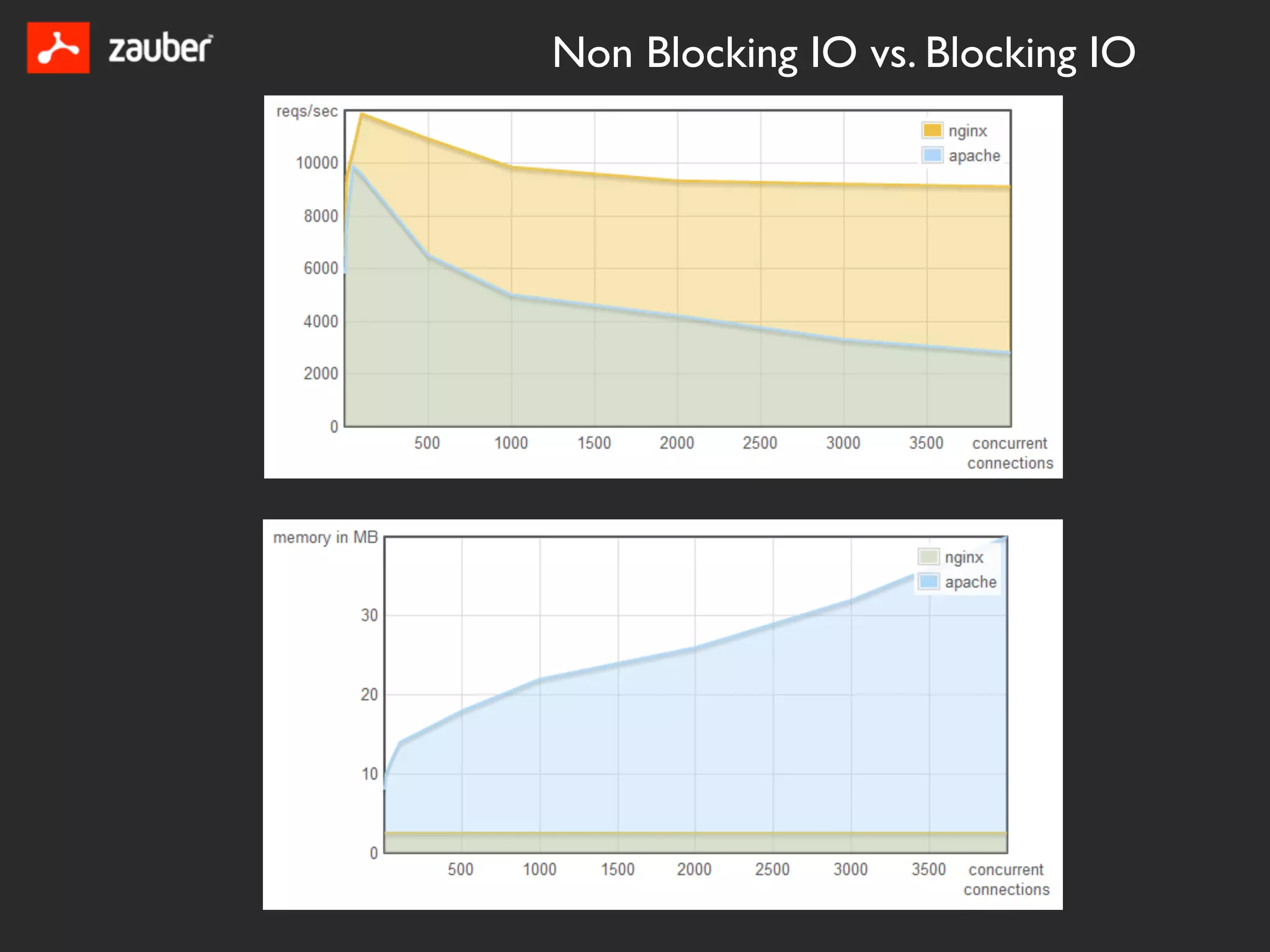
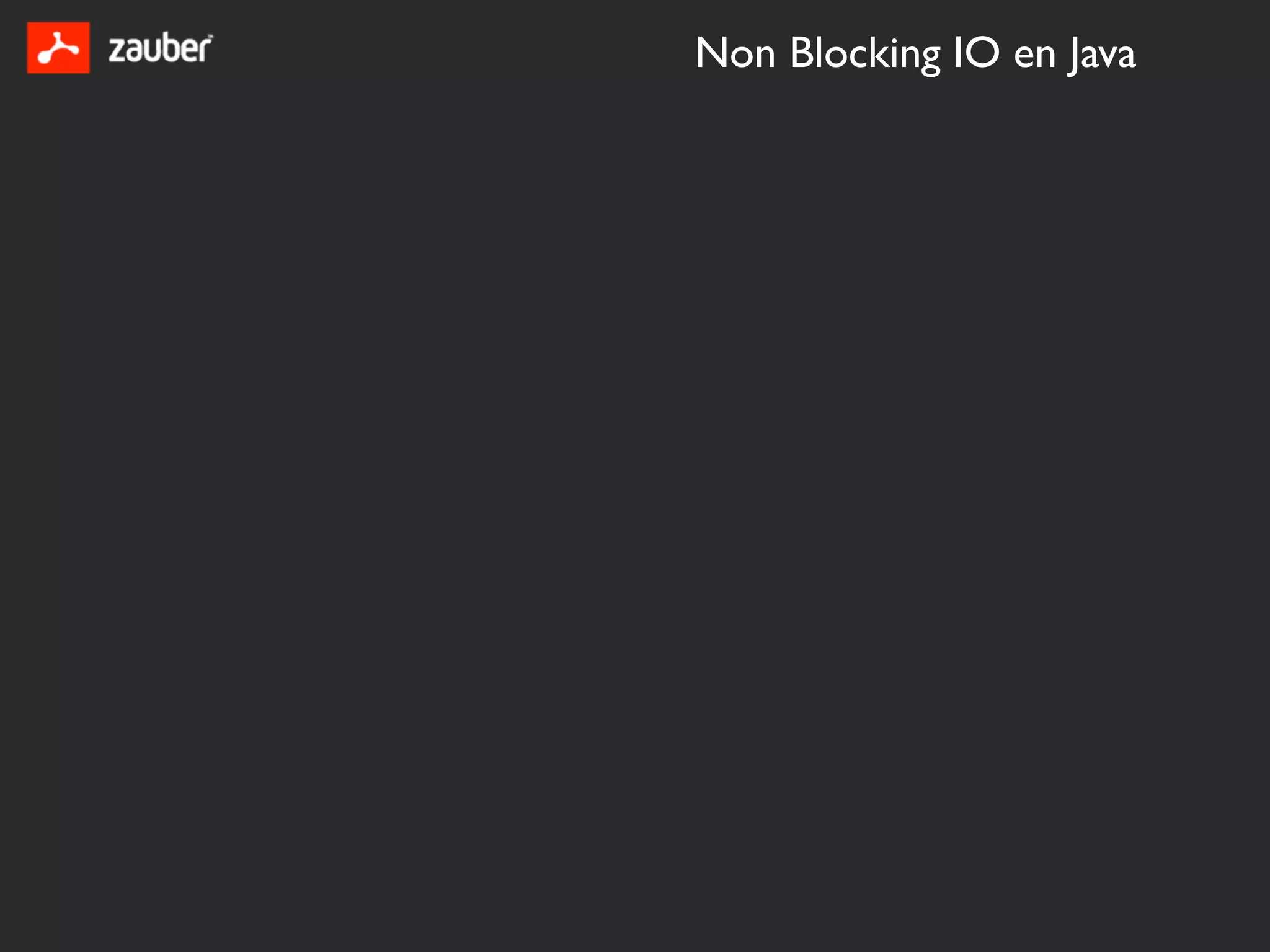
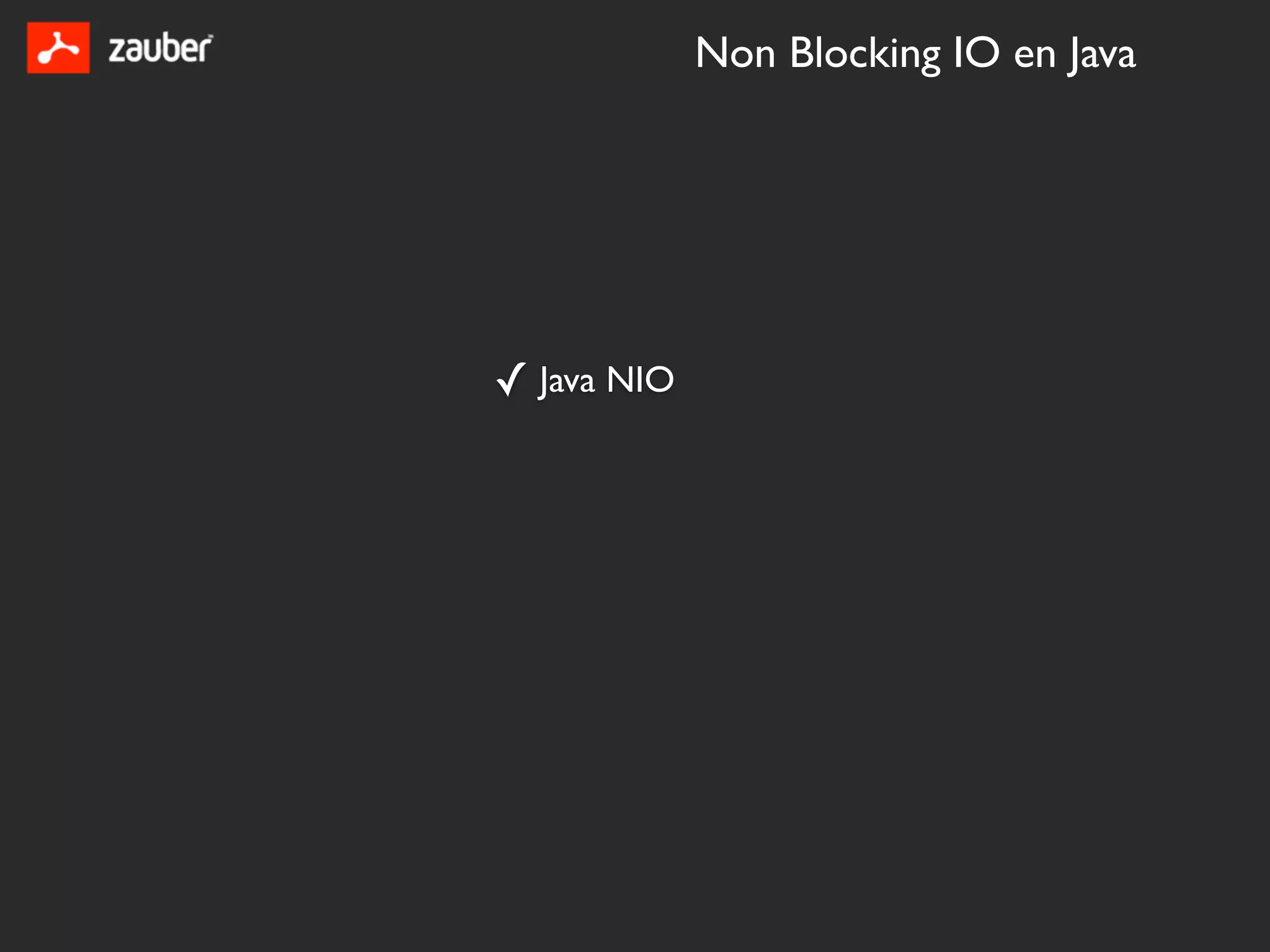
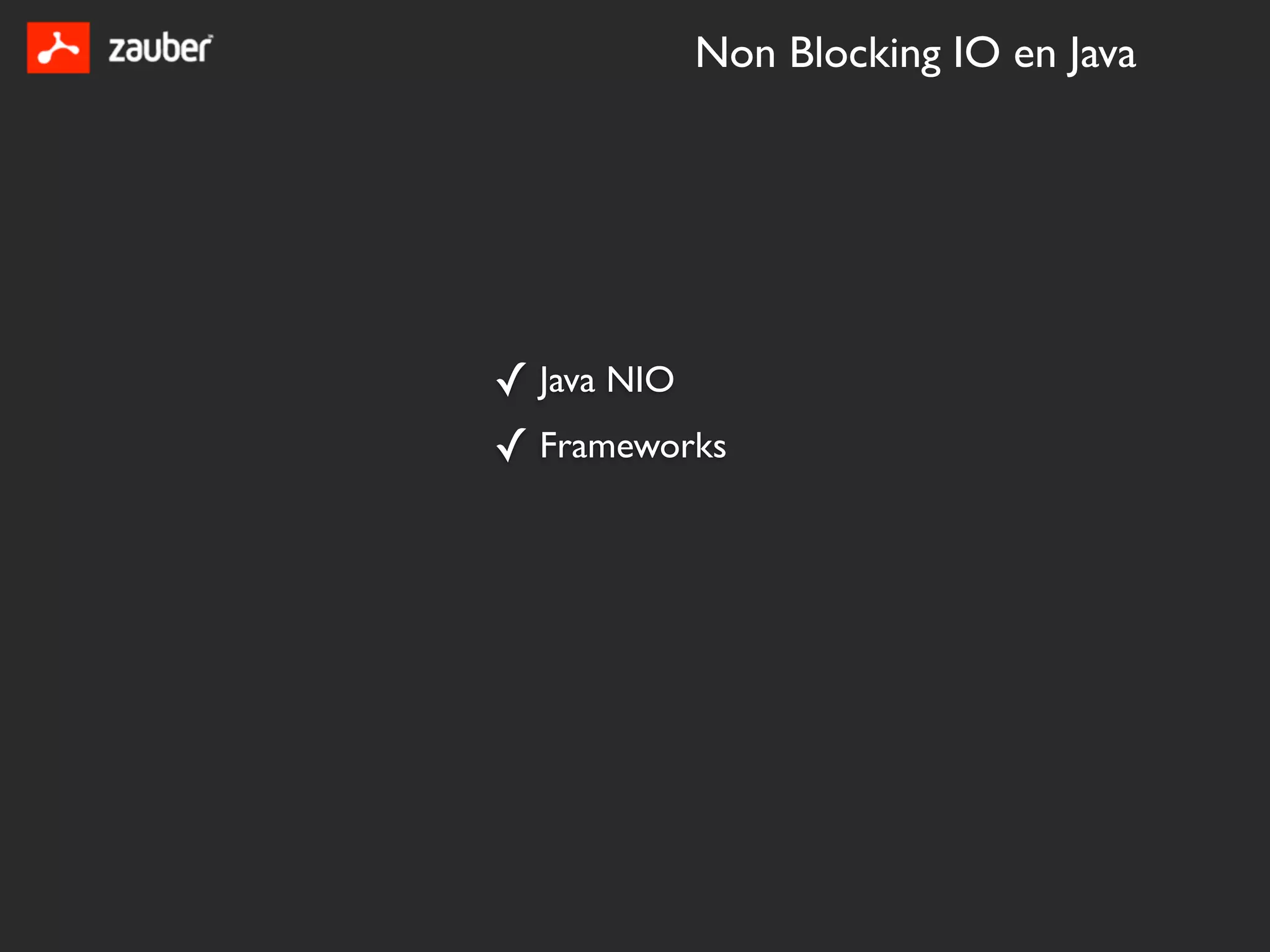
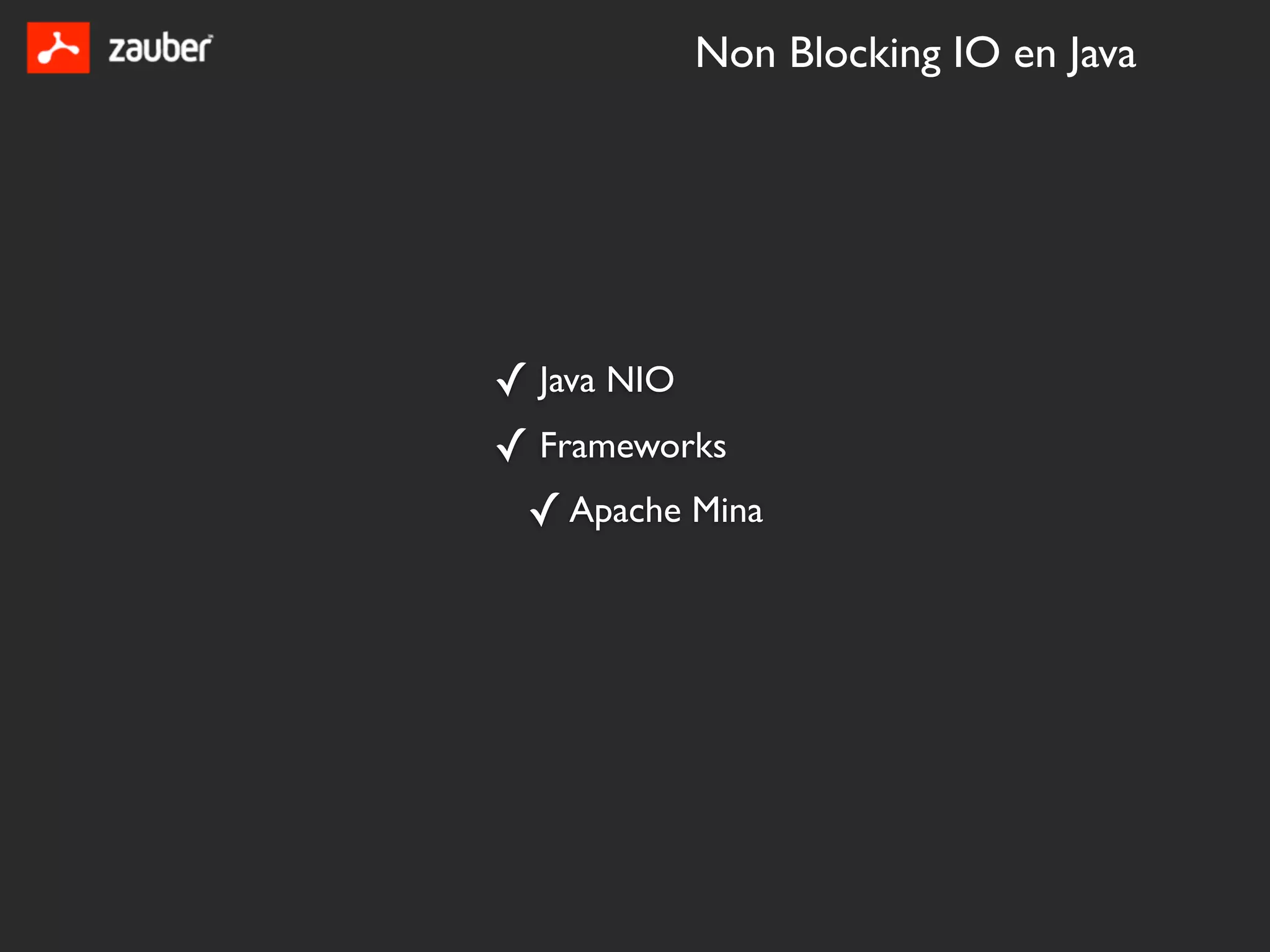
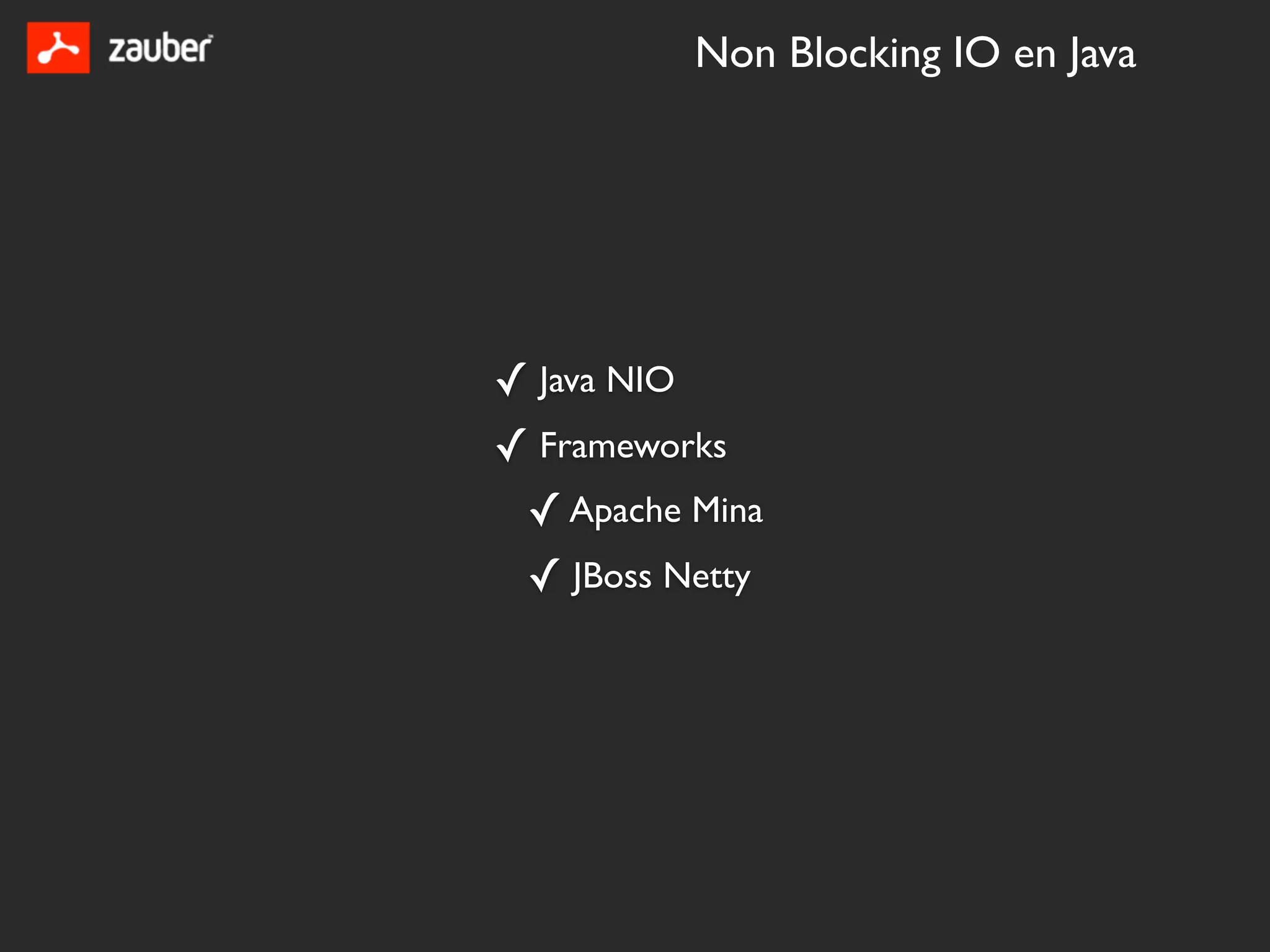
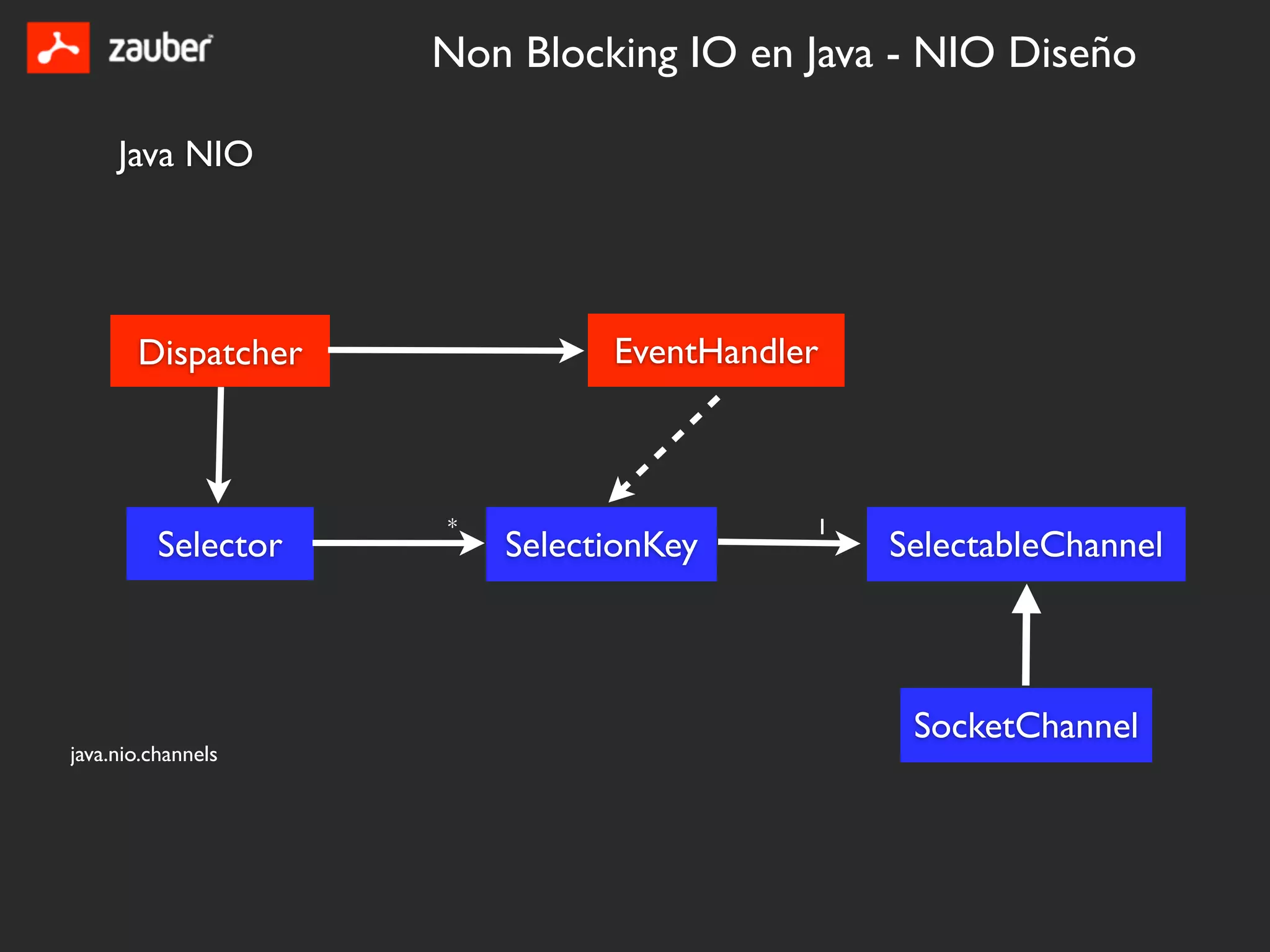
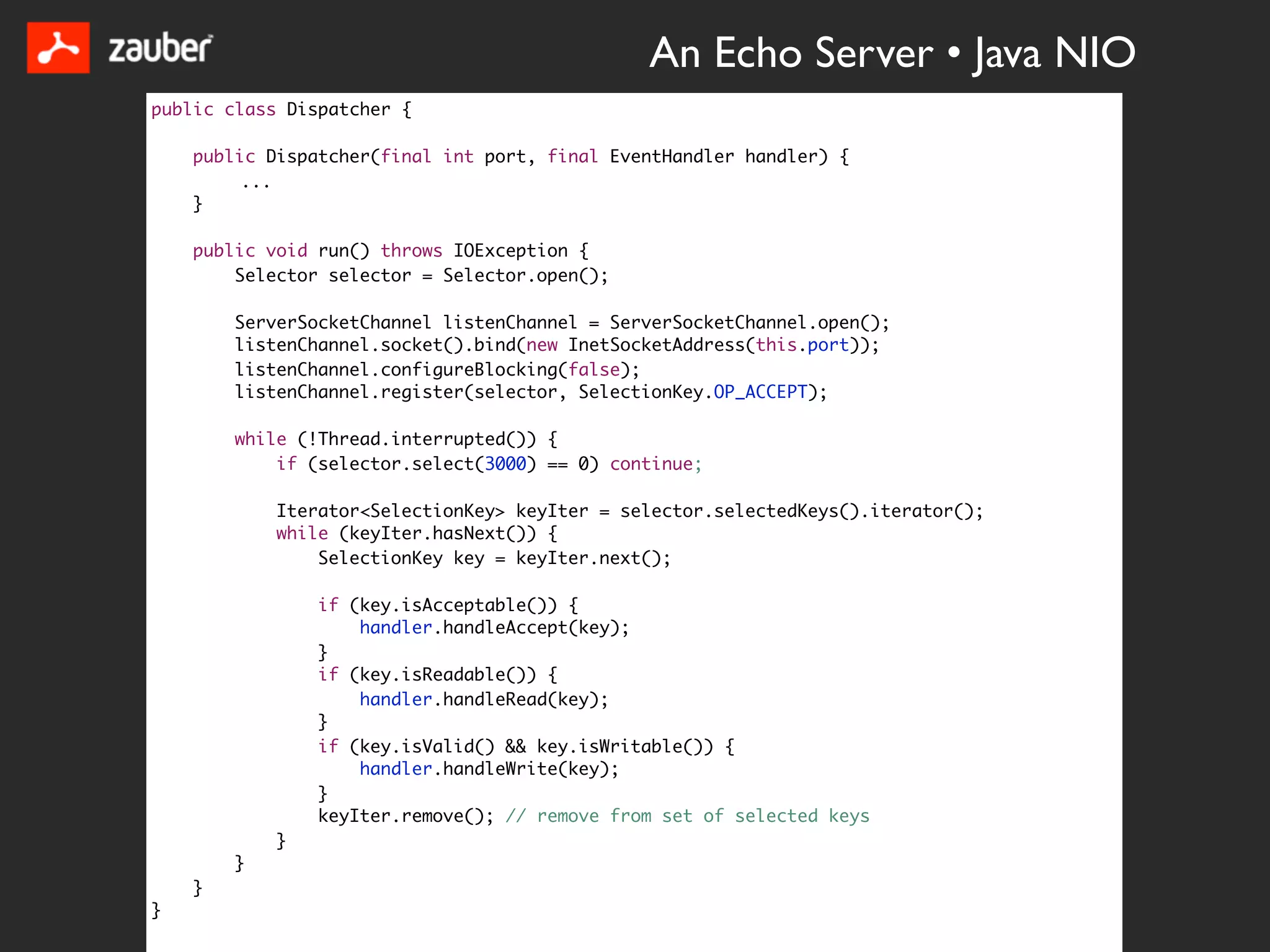
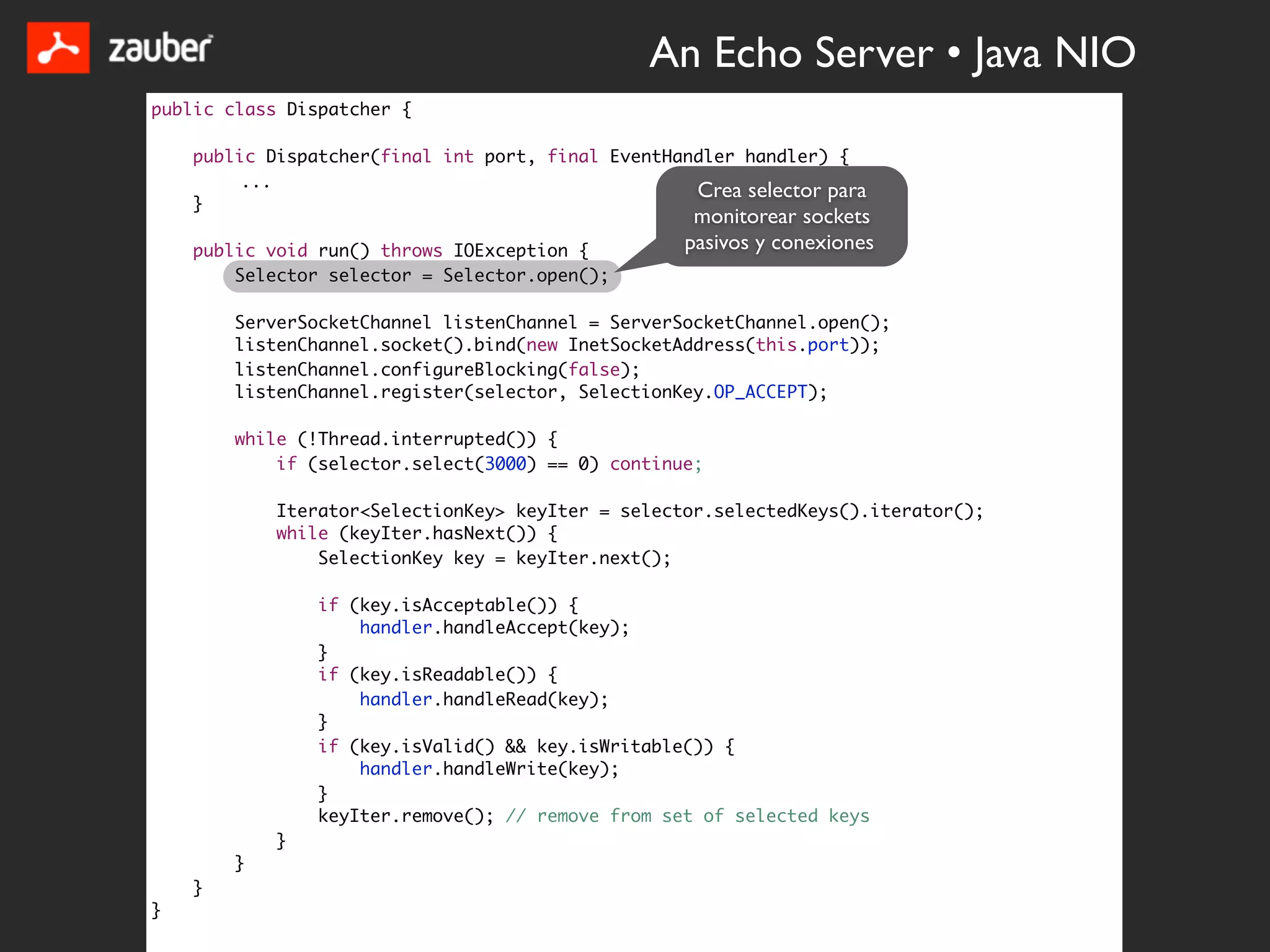
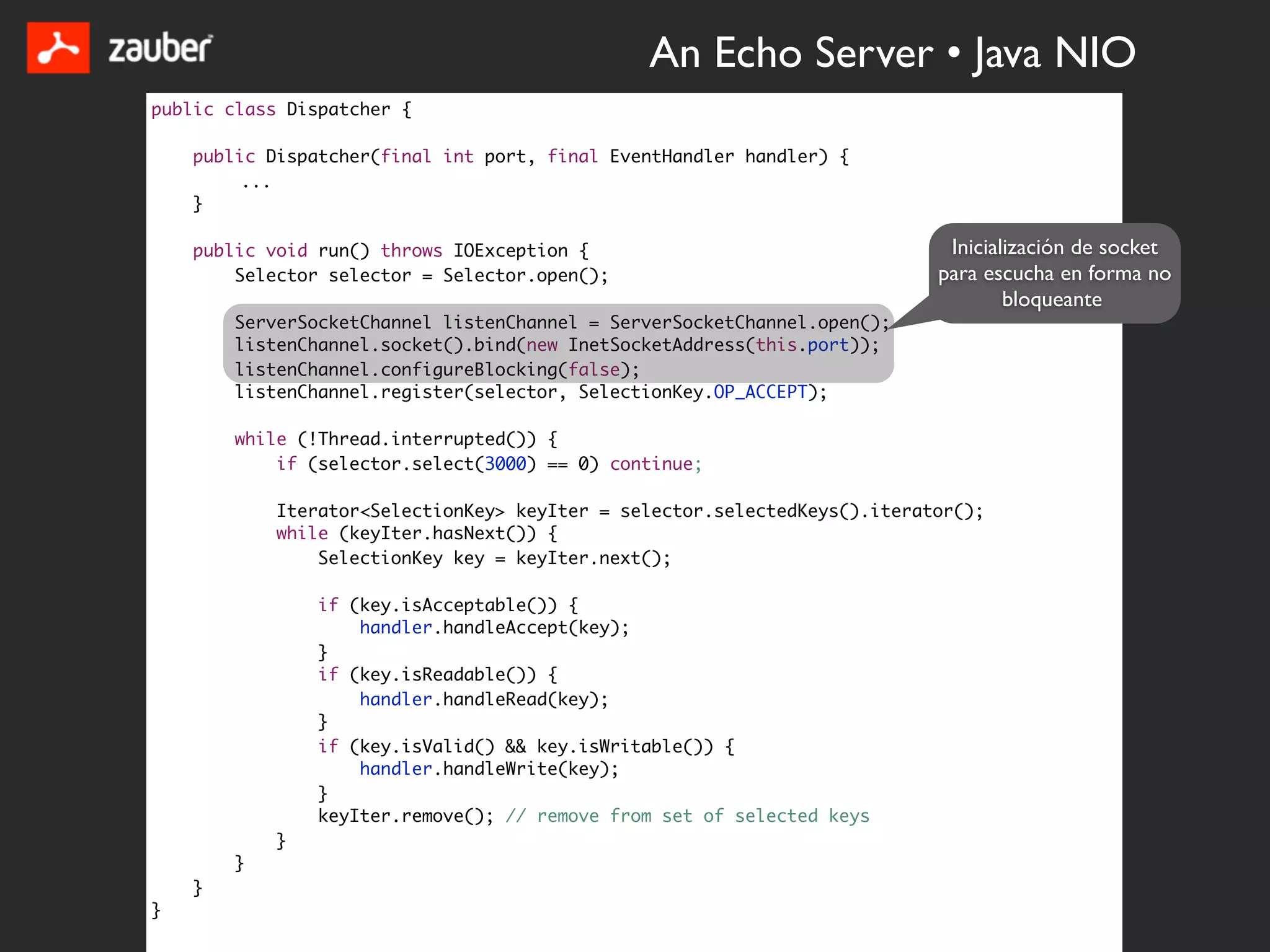
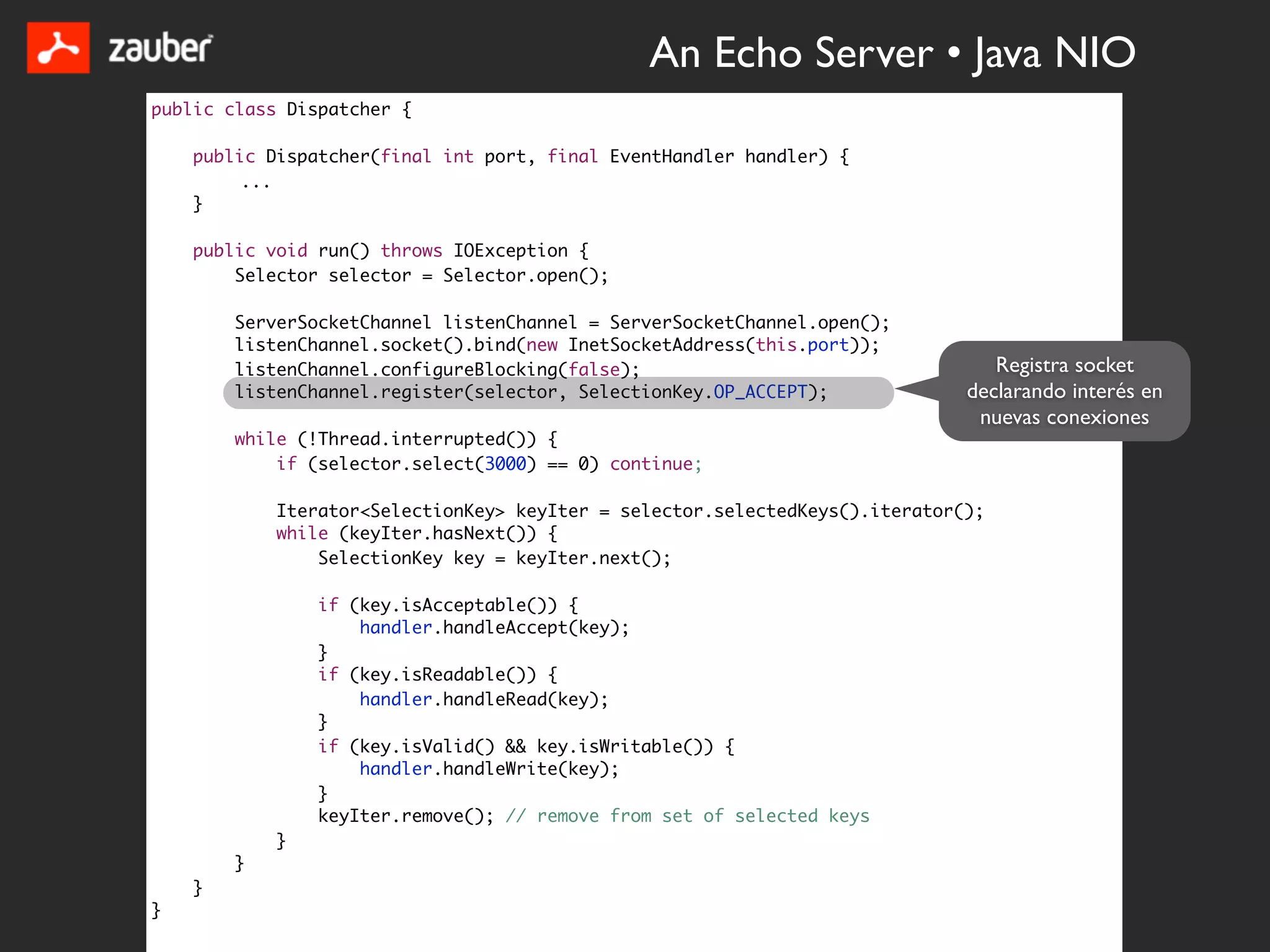
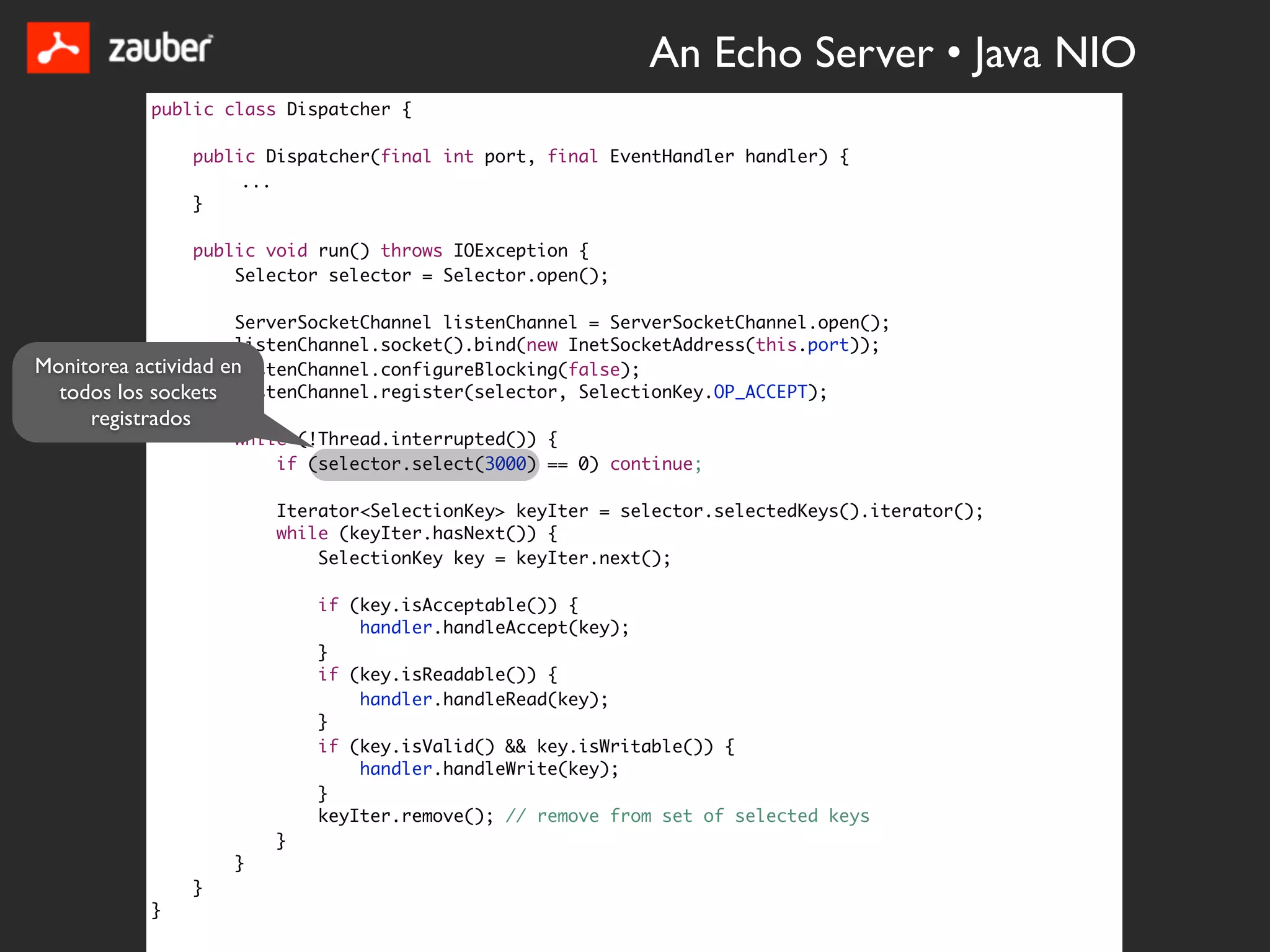
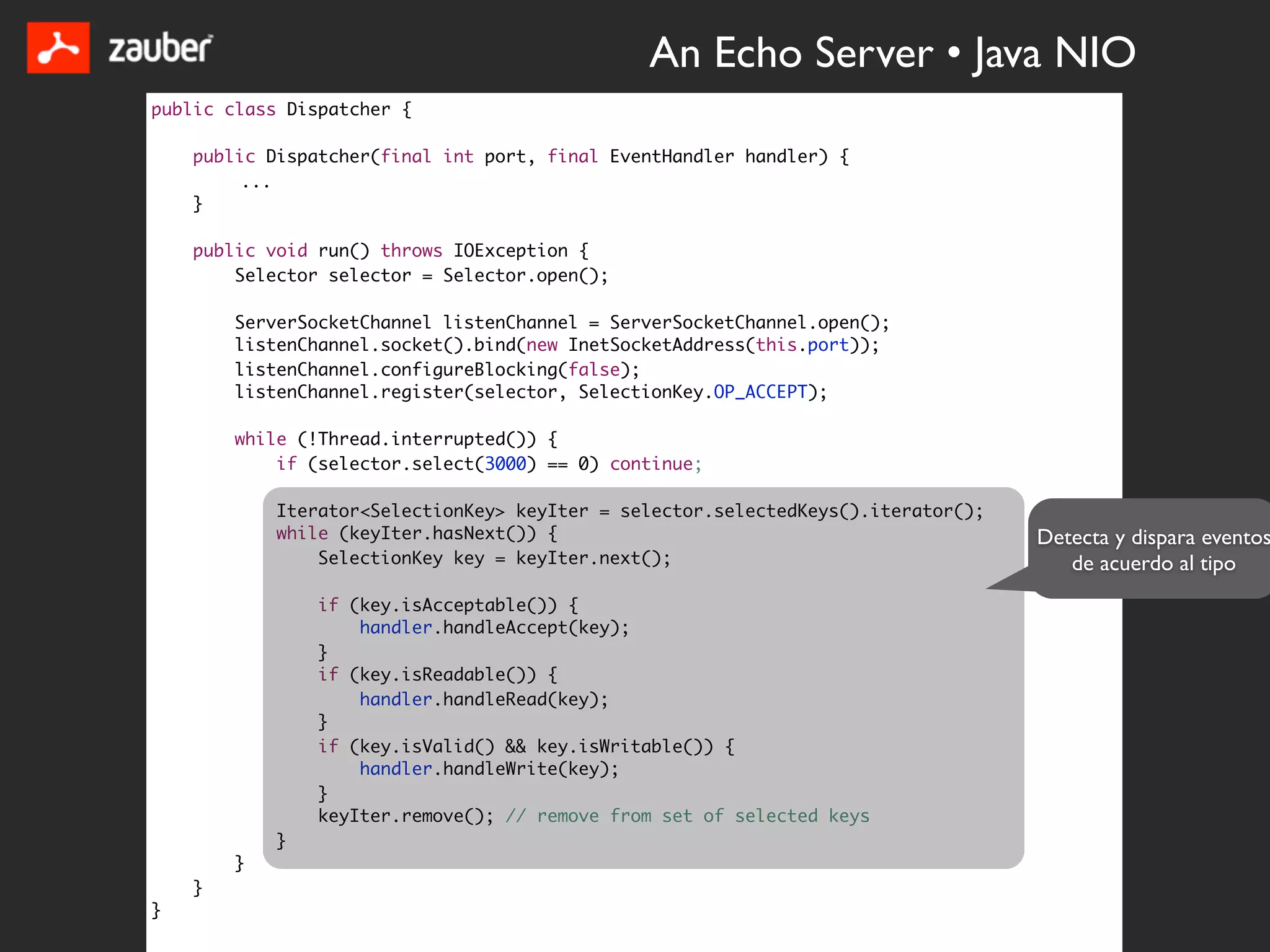
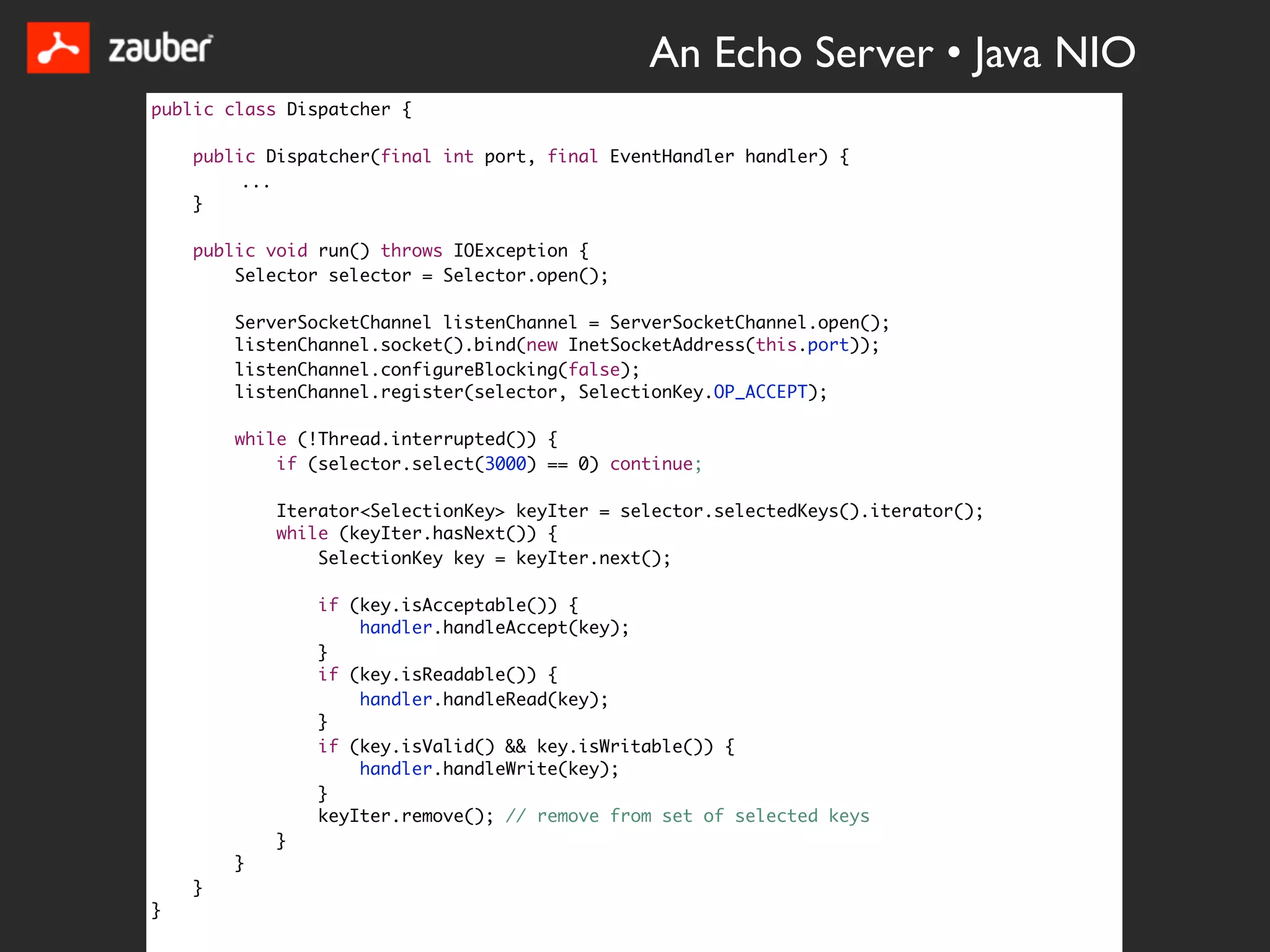
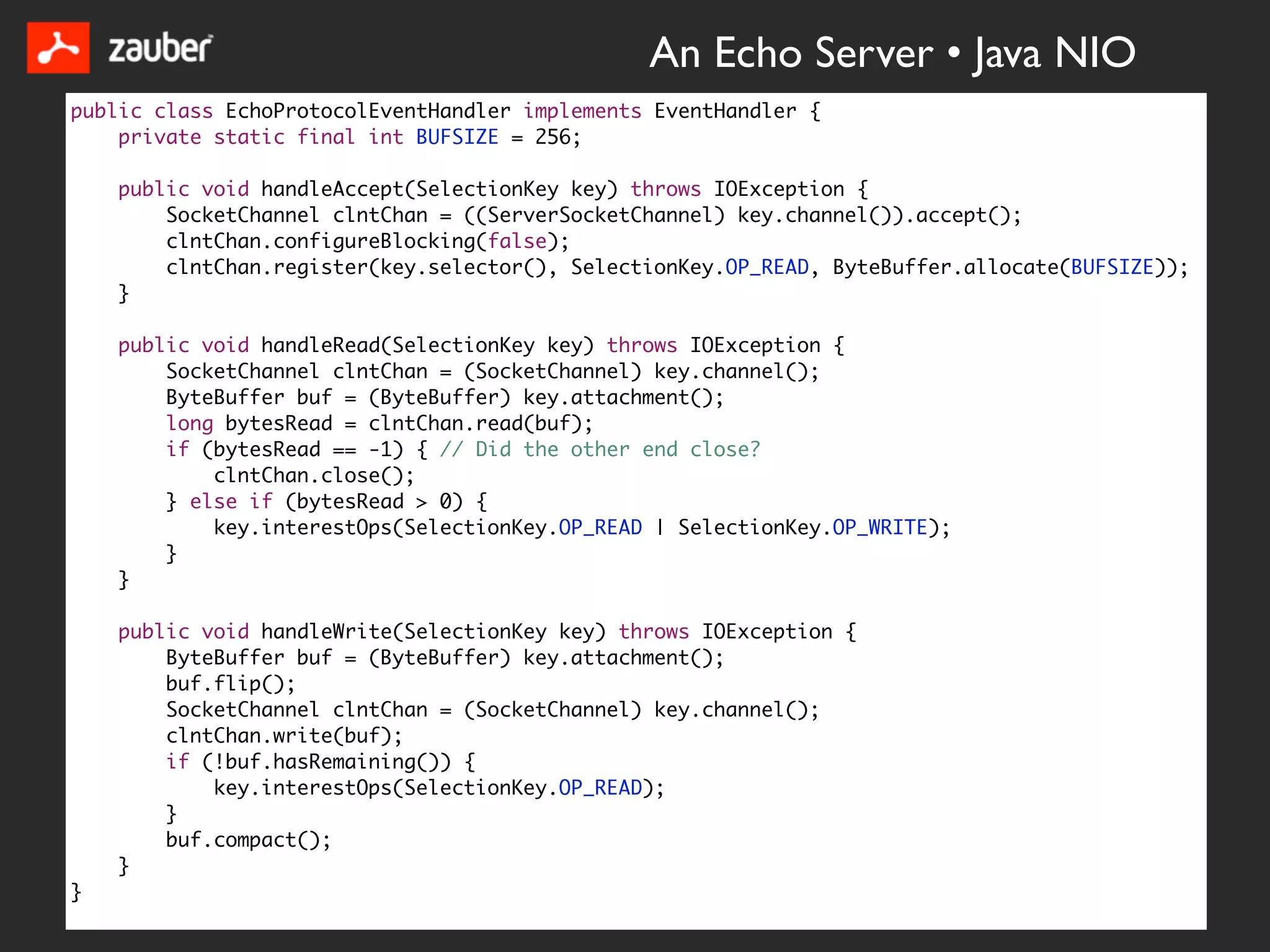
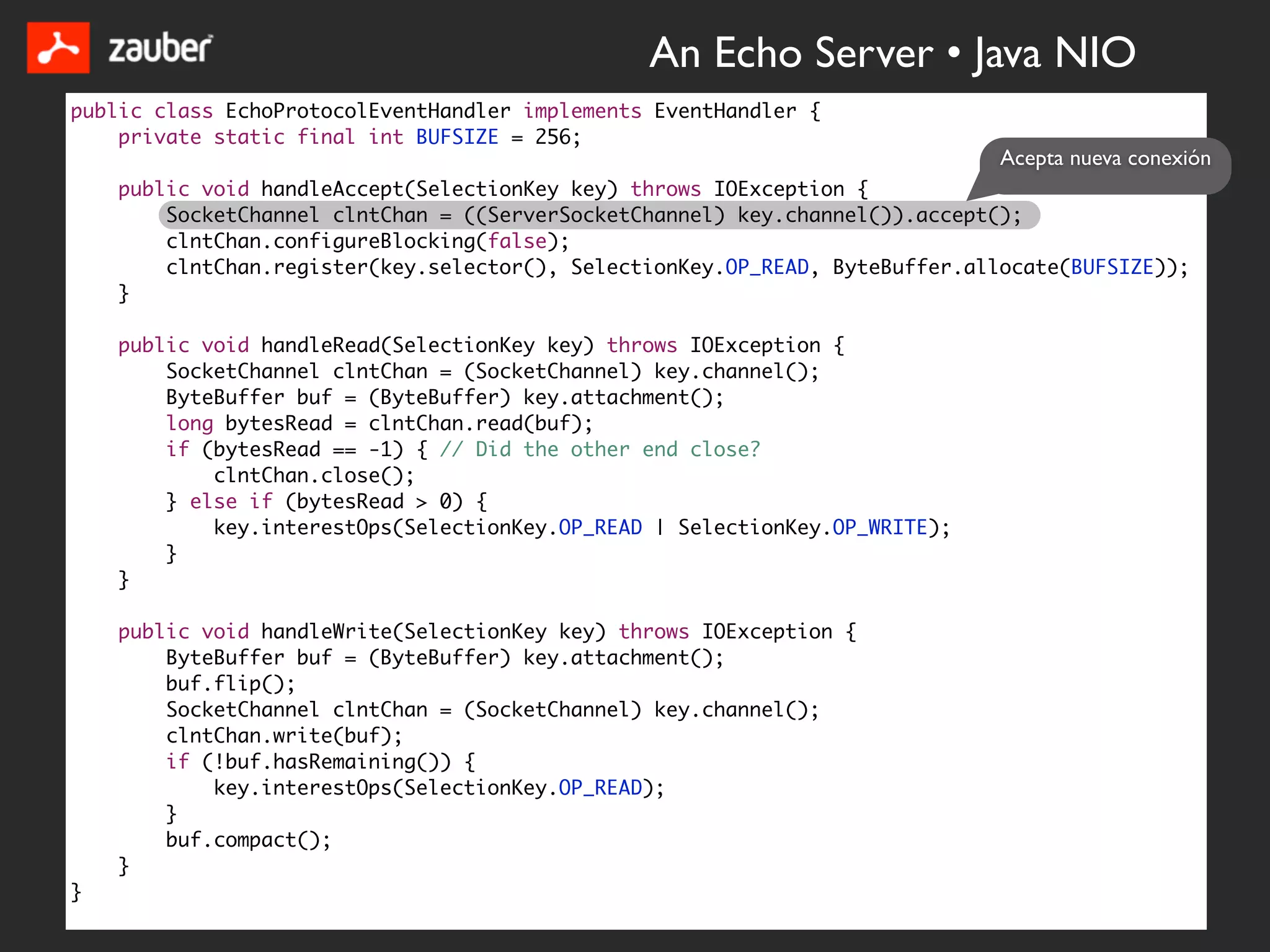
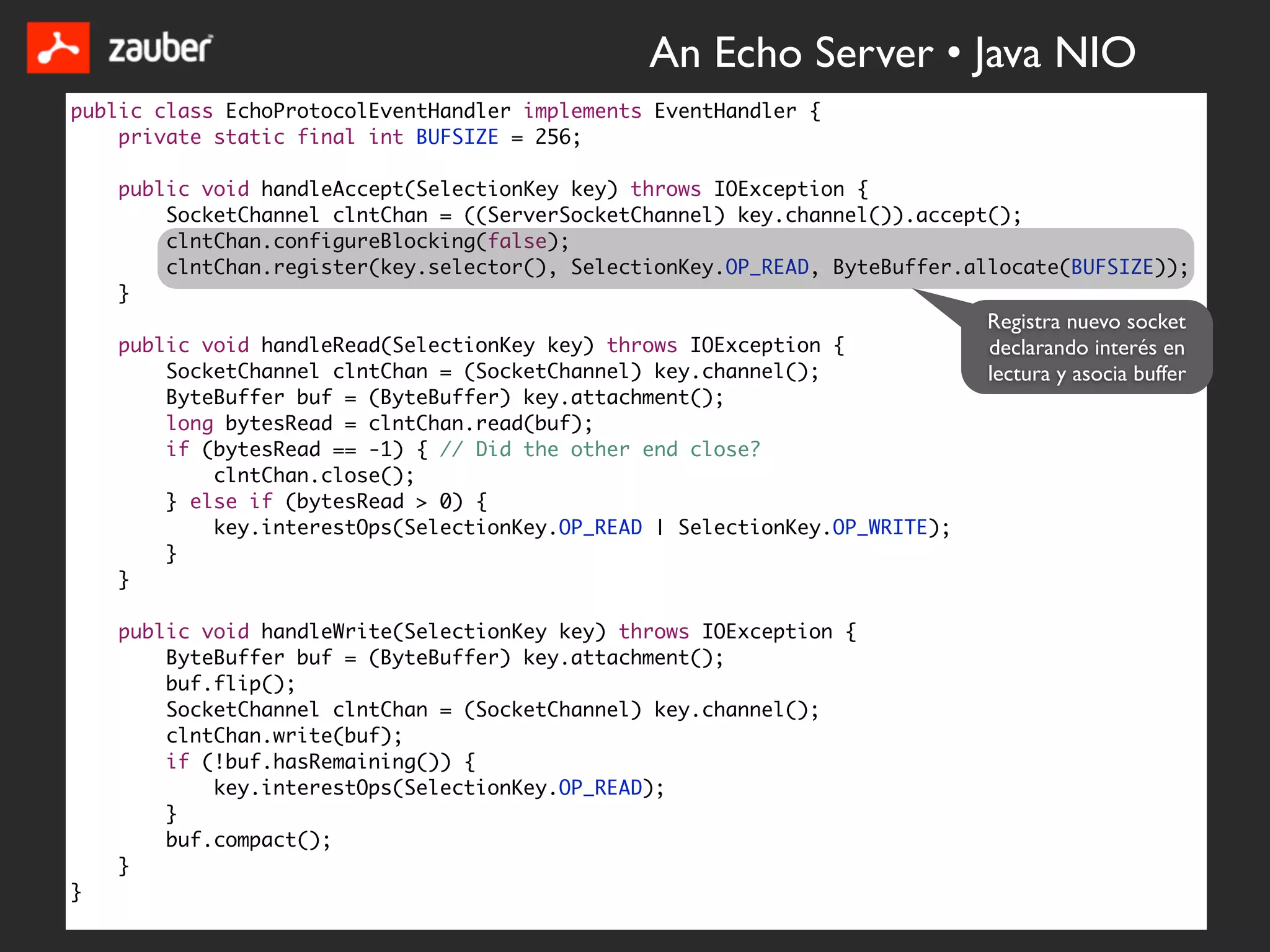
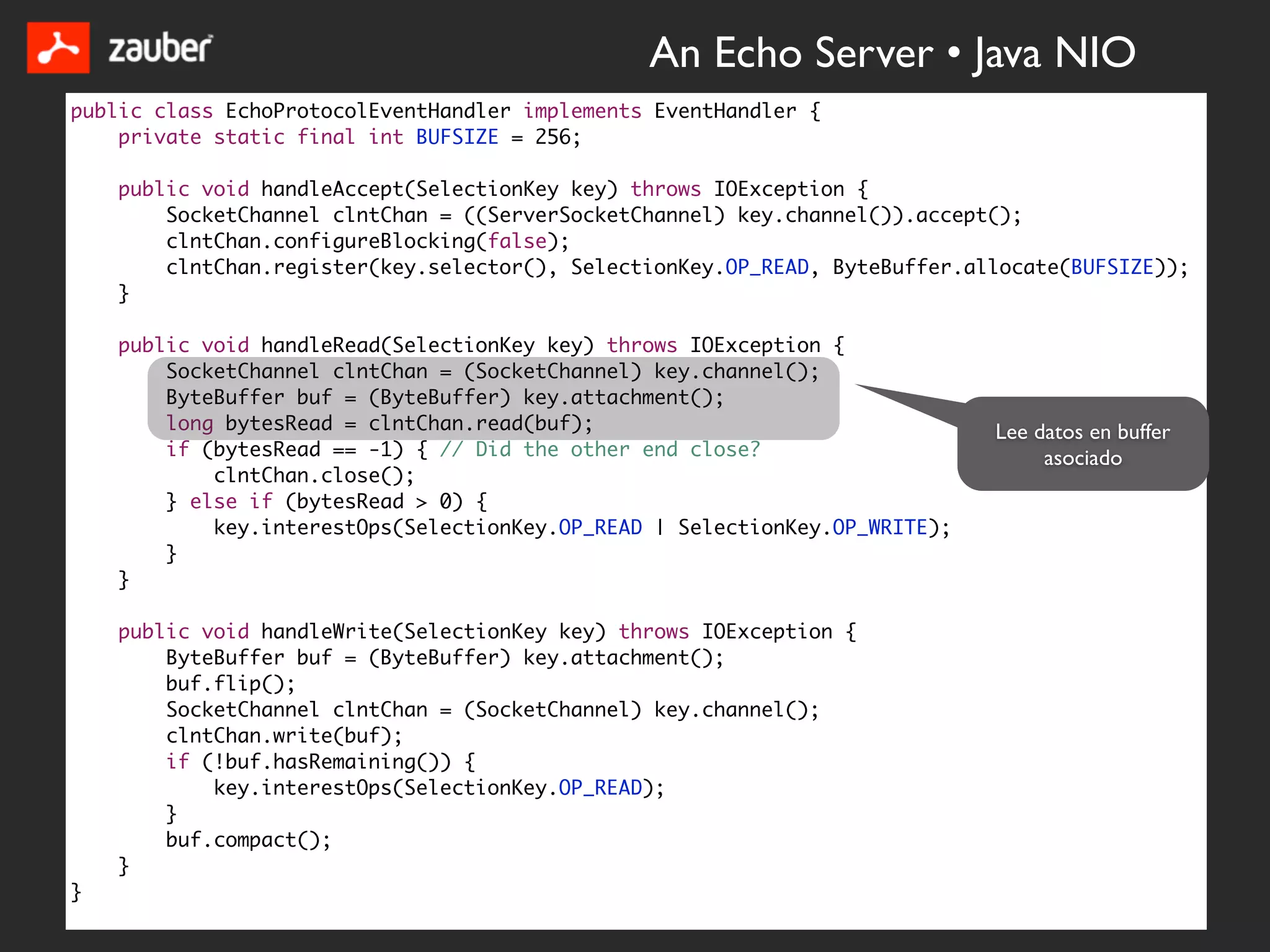
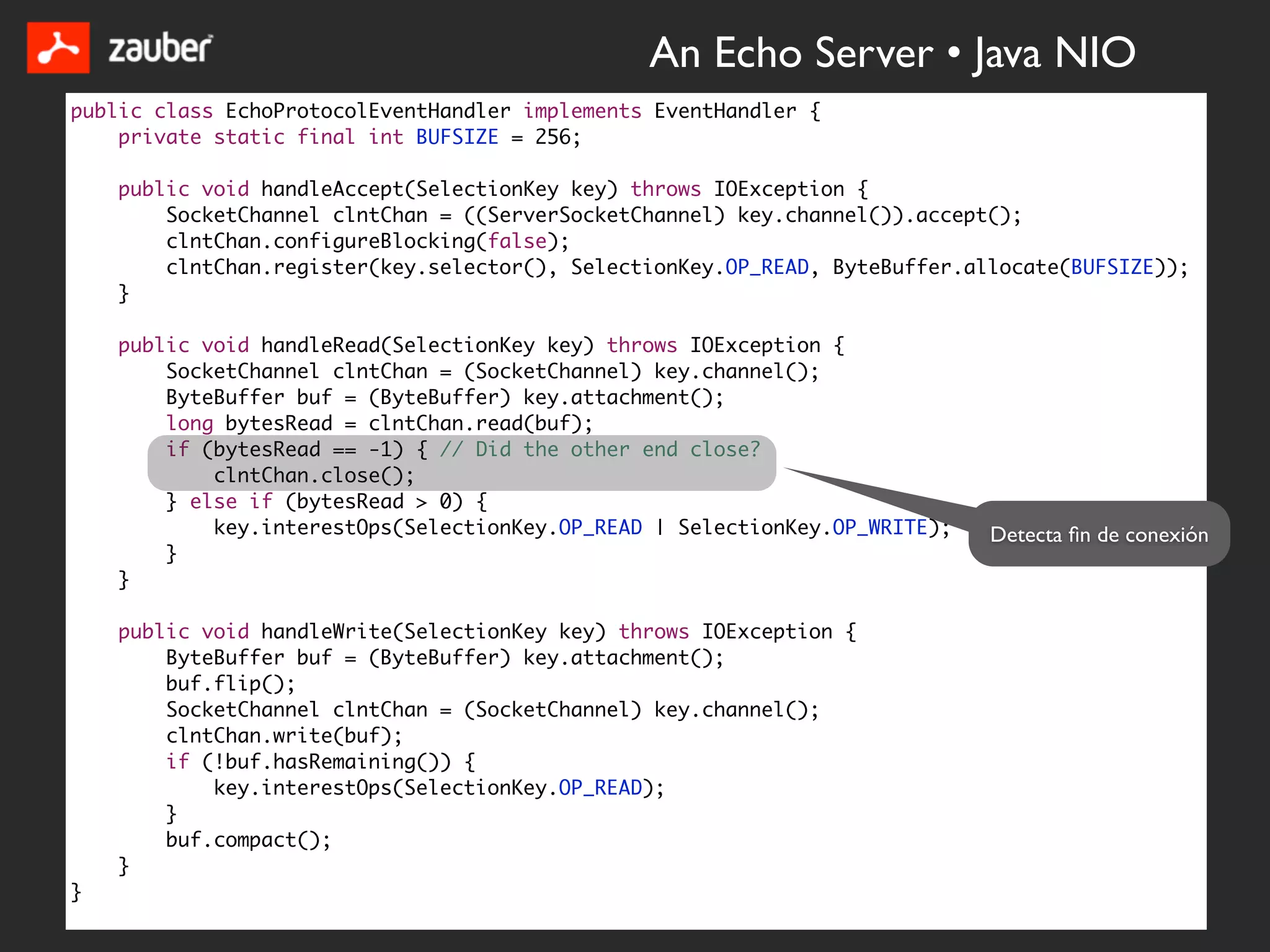
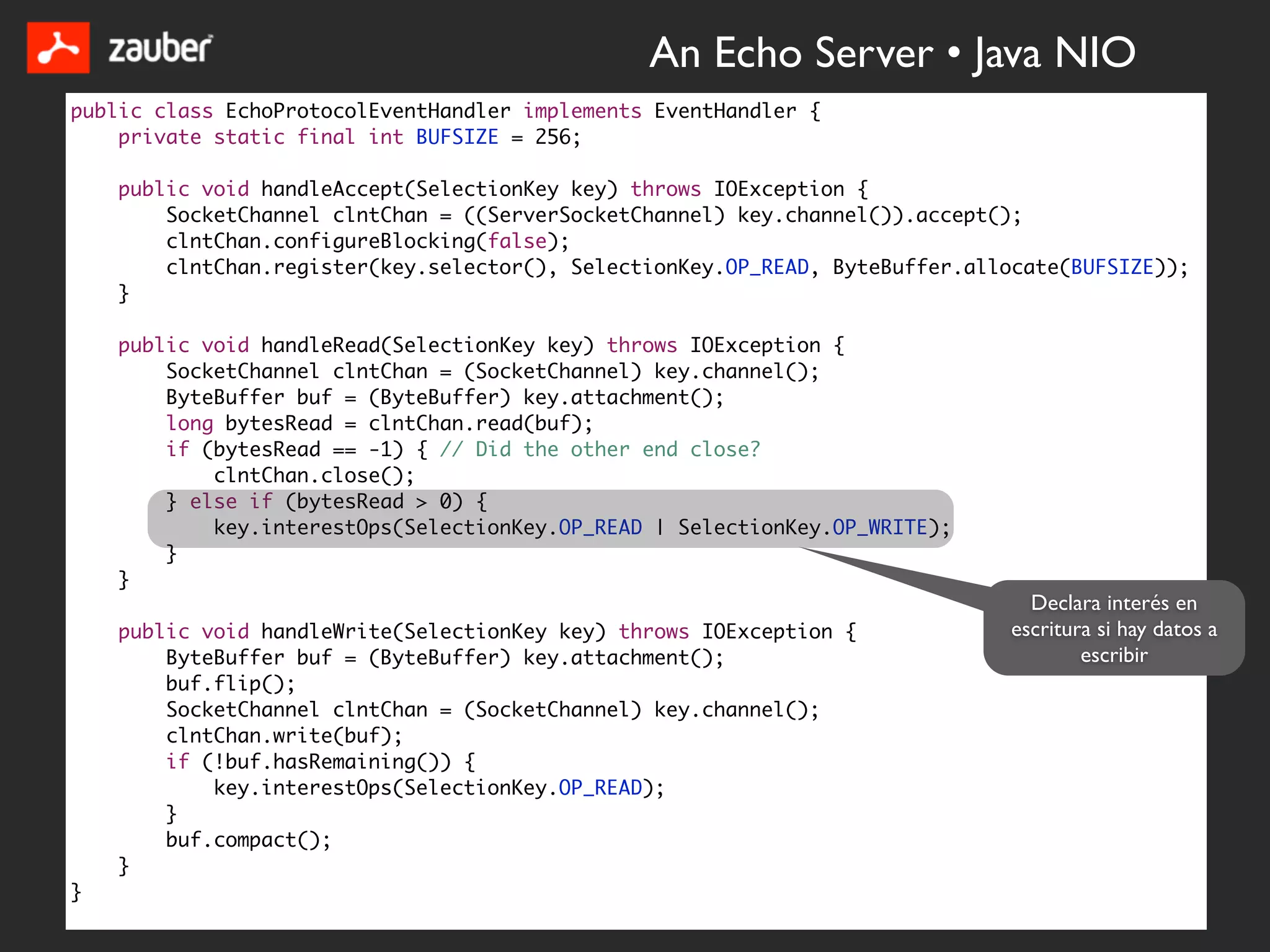
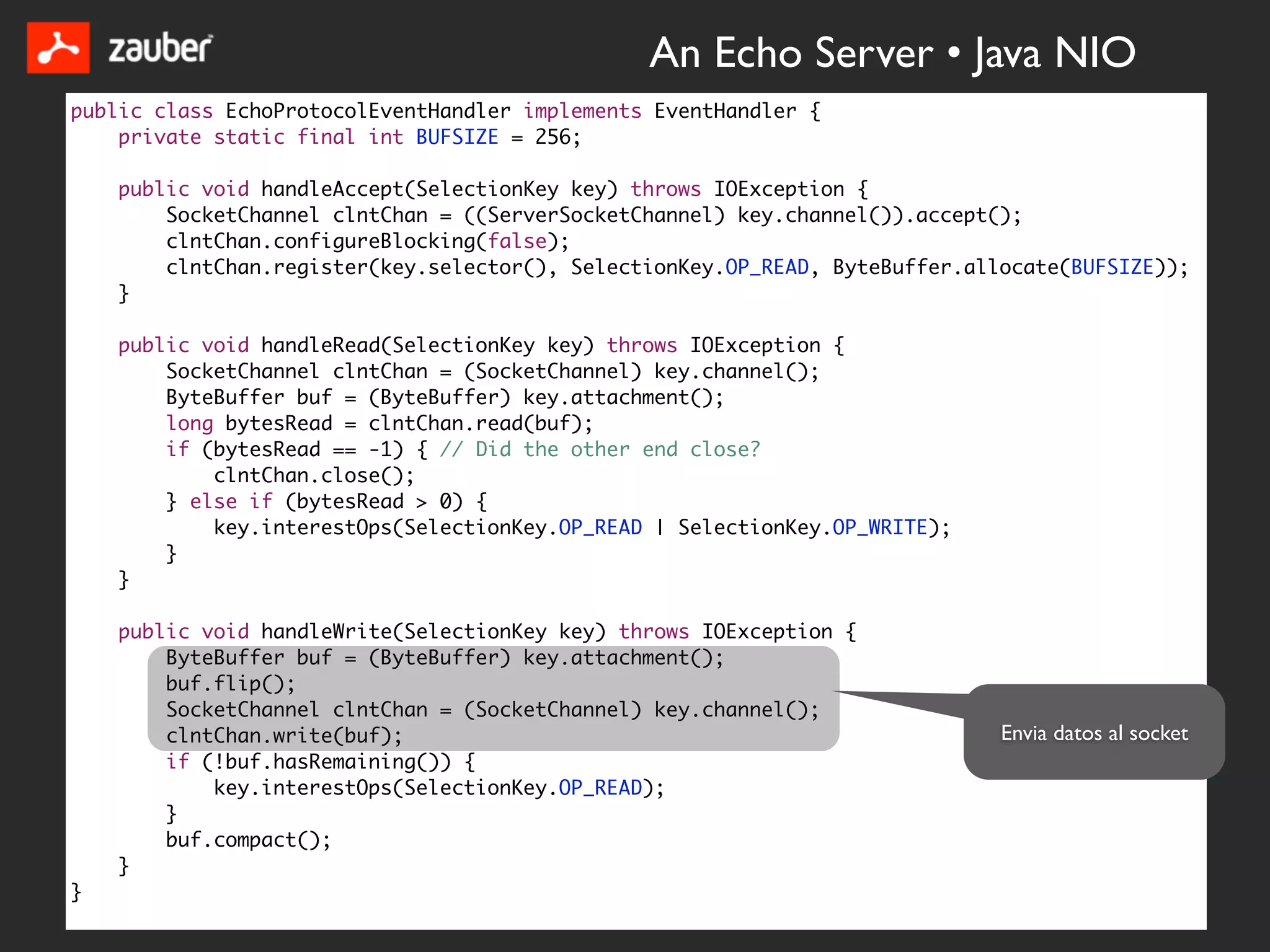
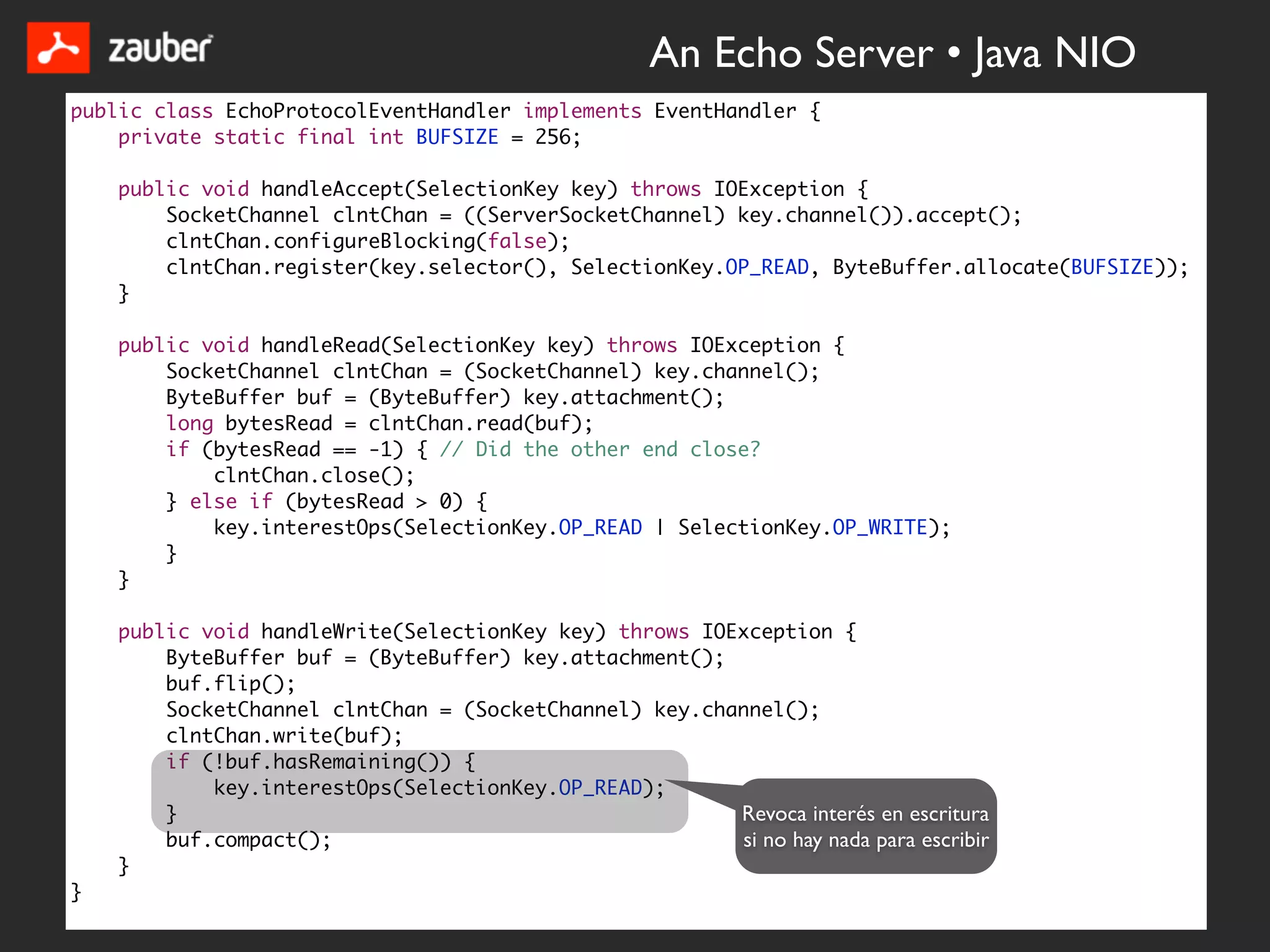
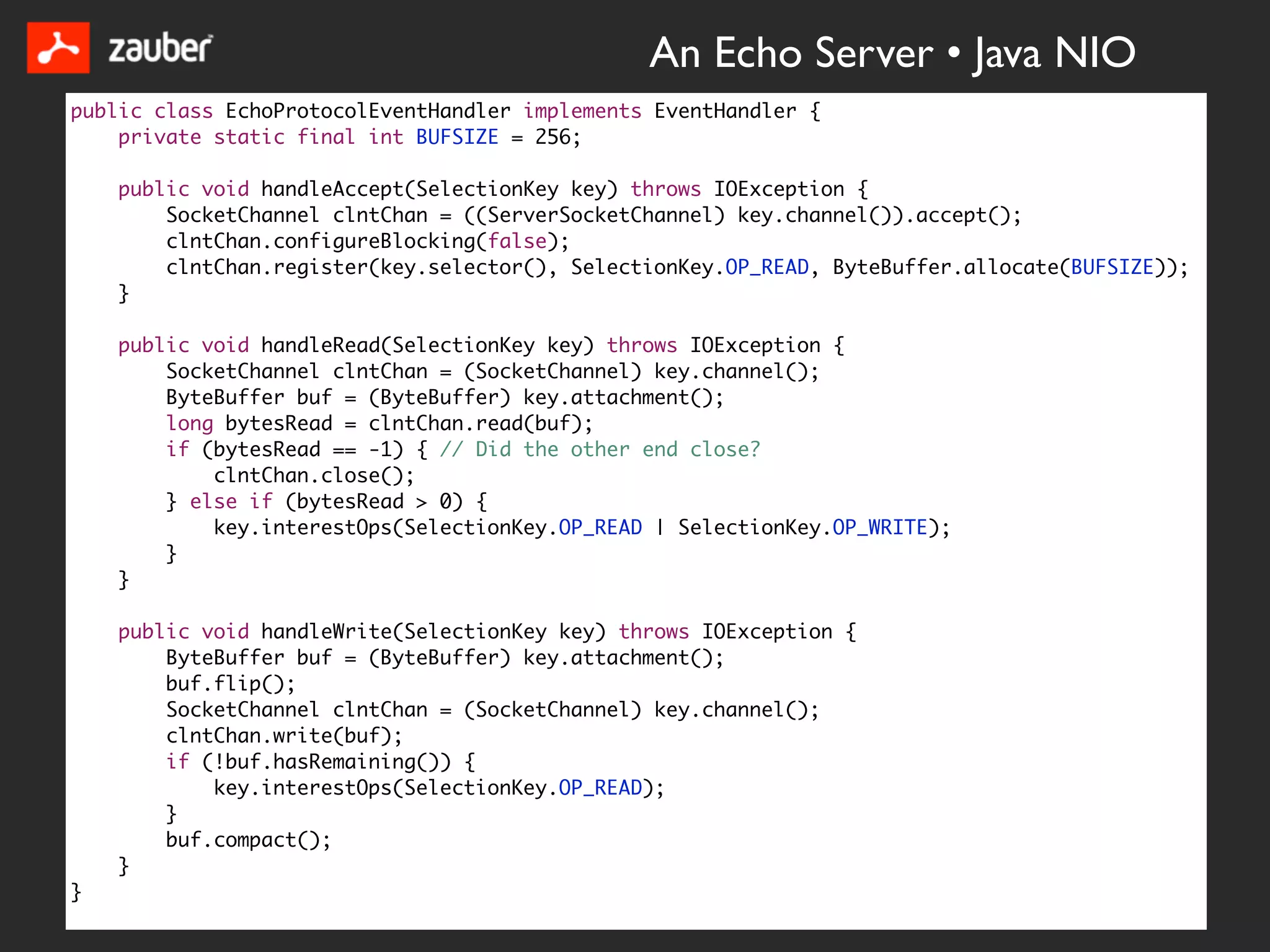
![An Echo Server • Java NIO public interface EventHandler { void handleAccept(SelectionKey key) throws IOException; void handleRead(SelectionKey key) throws IOException; void handleWrite(SelectionKey key) throws IOException; } public class NIOEchoServer { public static void main(String[] args) throws IOException { Dispatcher dispatcher = new Dispatcher(20007, new EchoProtocolEventHandler()); dispatcher.run(); } }](https://image.slidesharecdn.com/nonblockingiowithnetty-111102141510-phpapp02/75/Non-blocking-io-with-netty-52-2048.jpg)
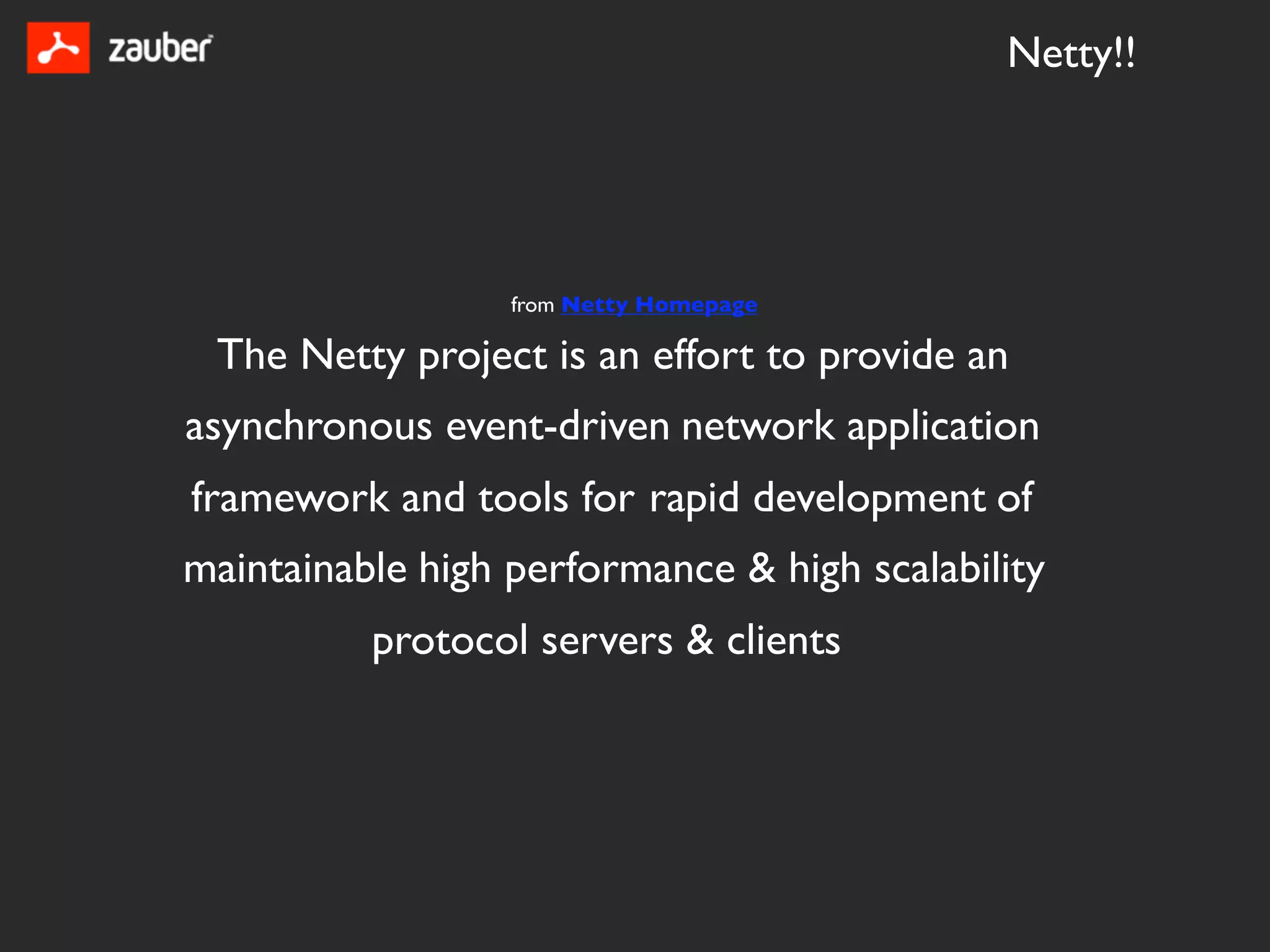
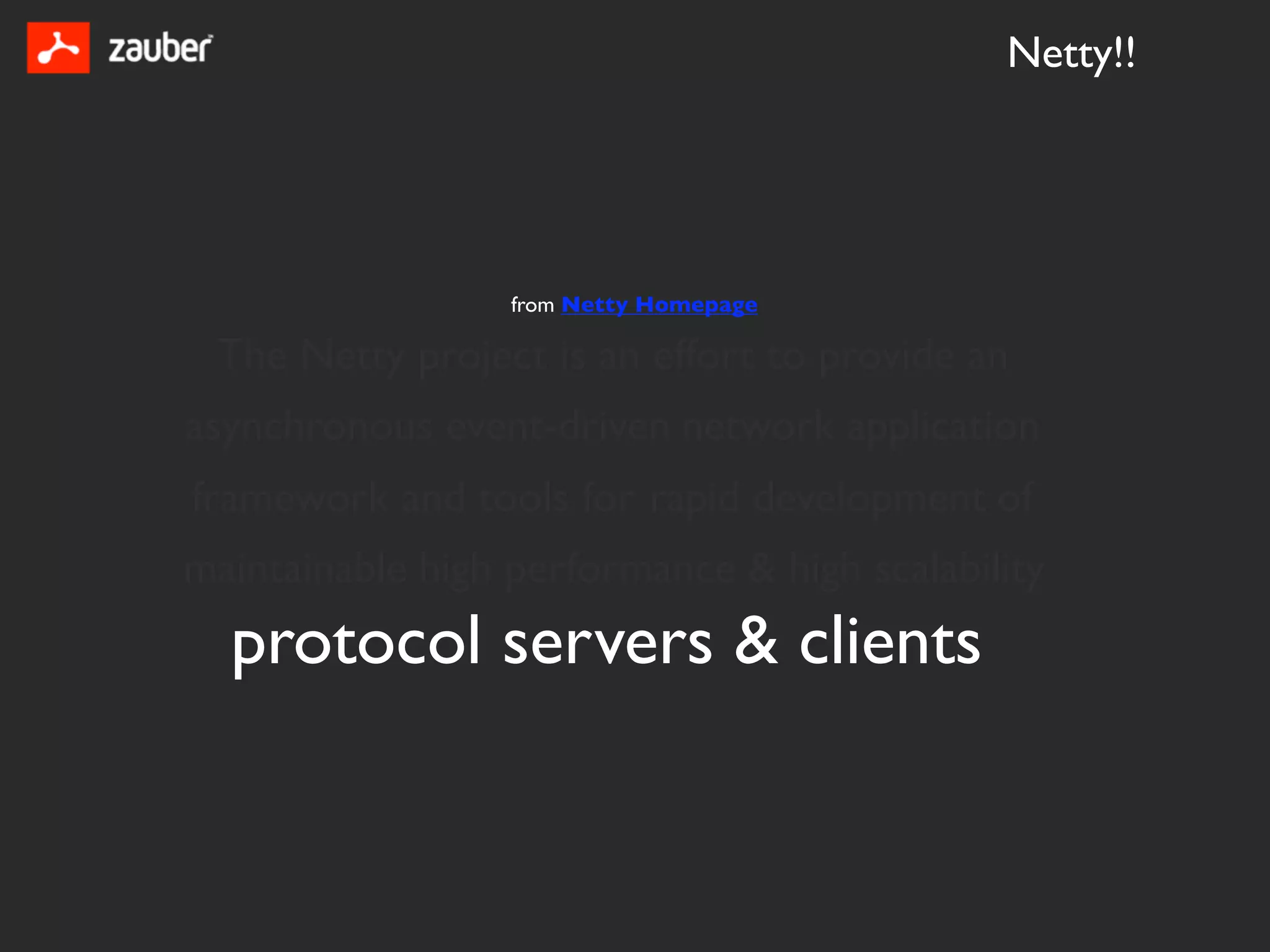
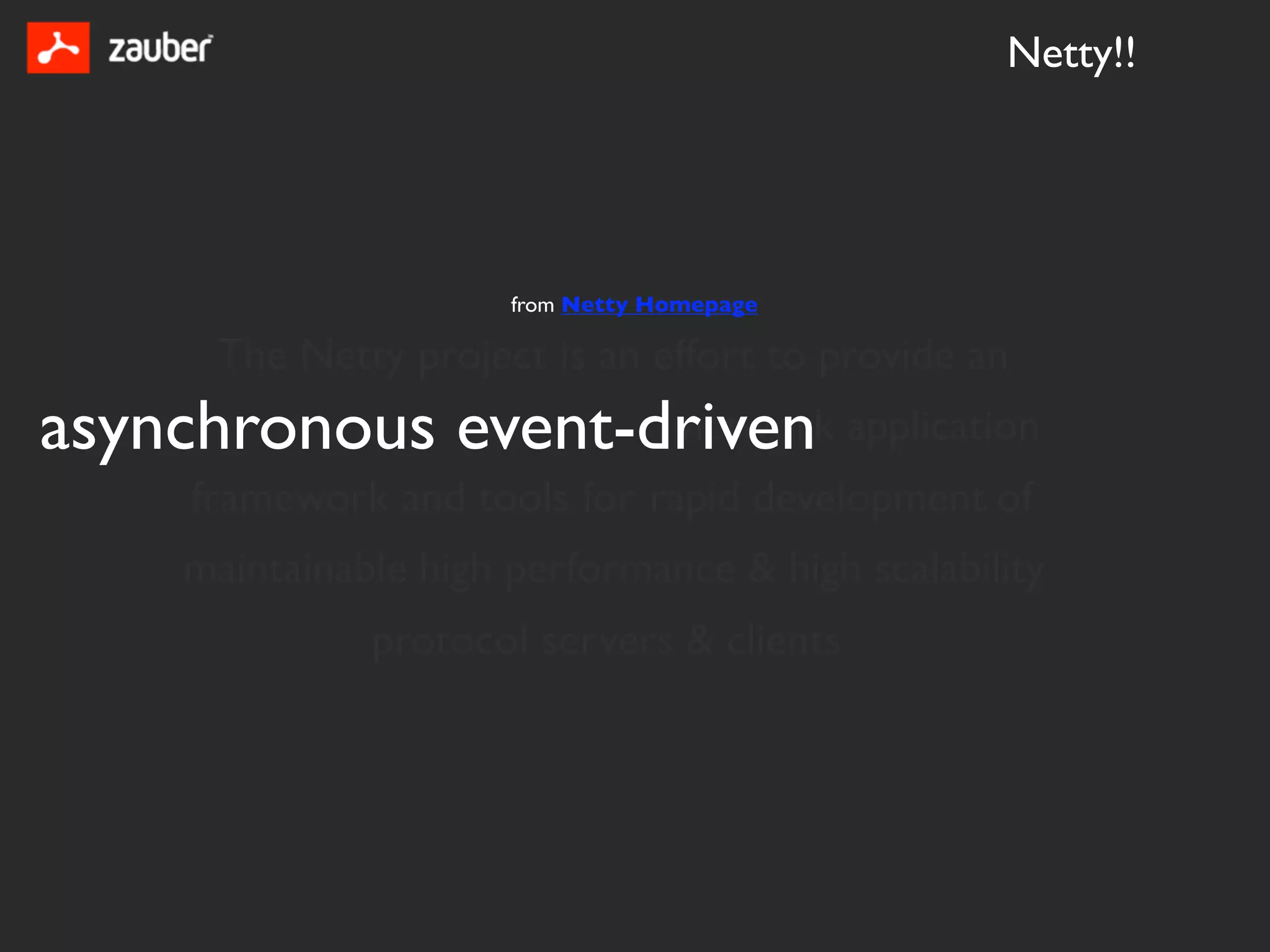
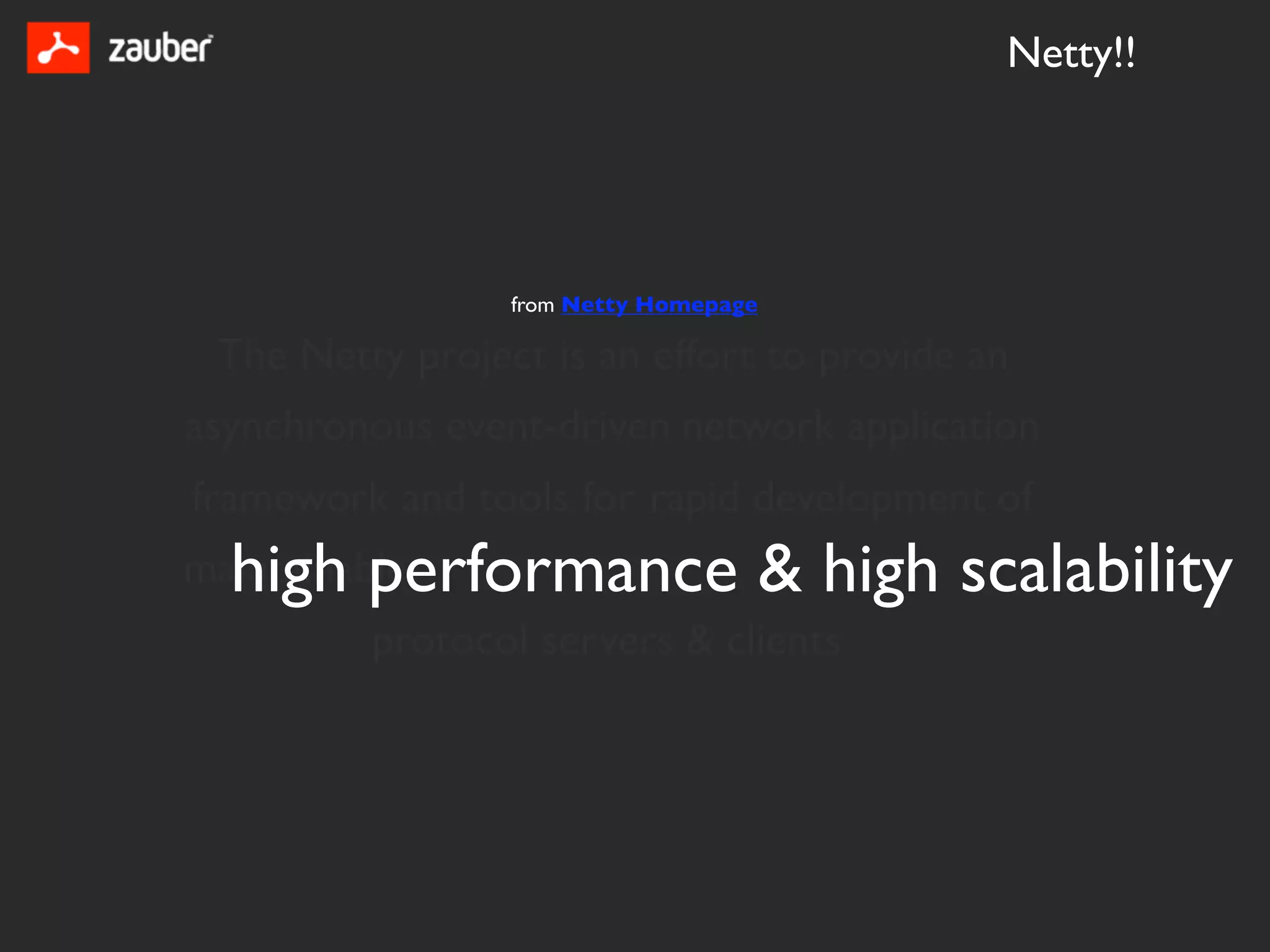
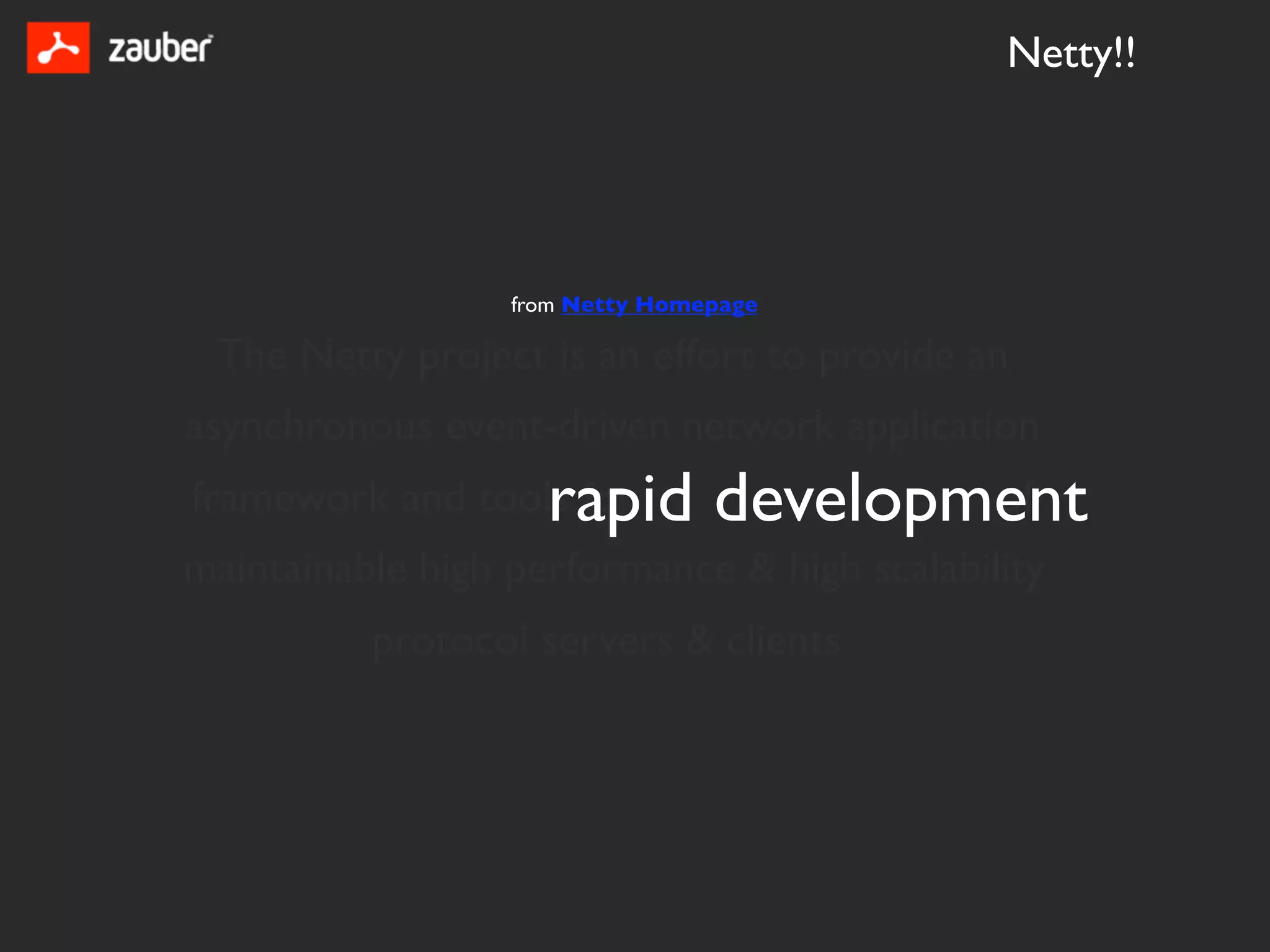
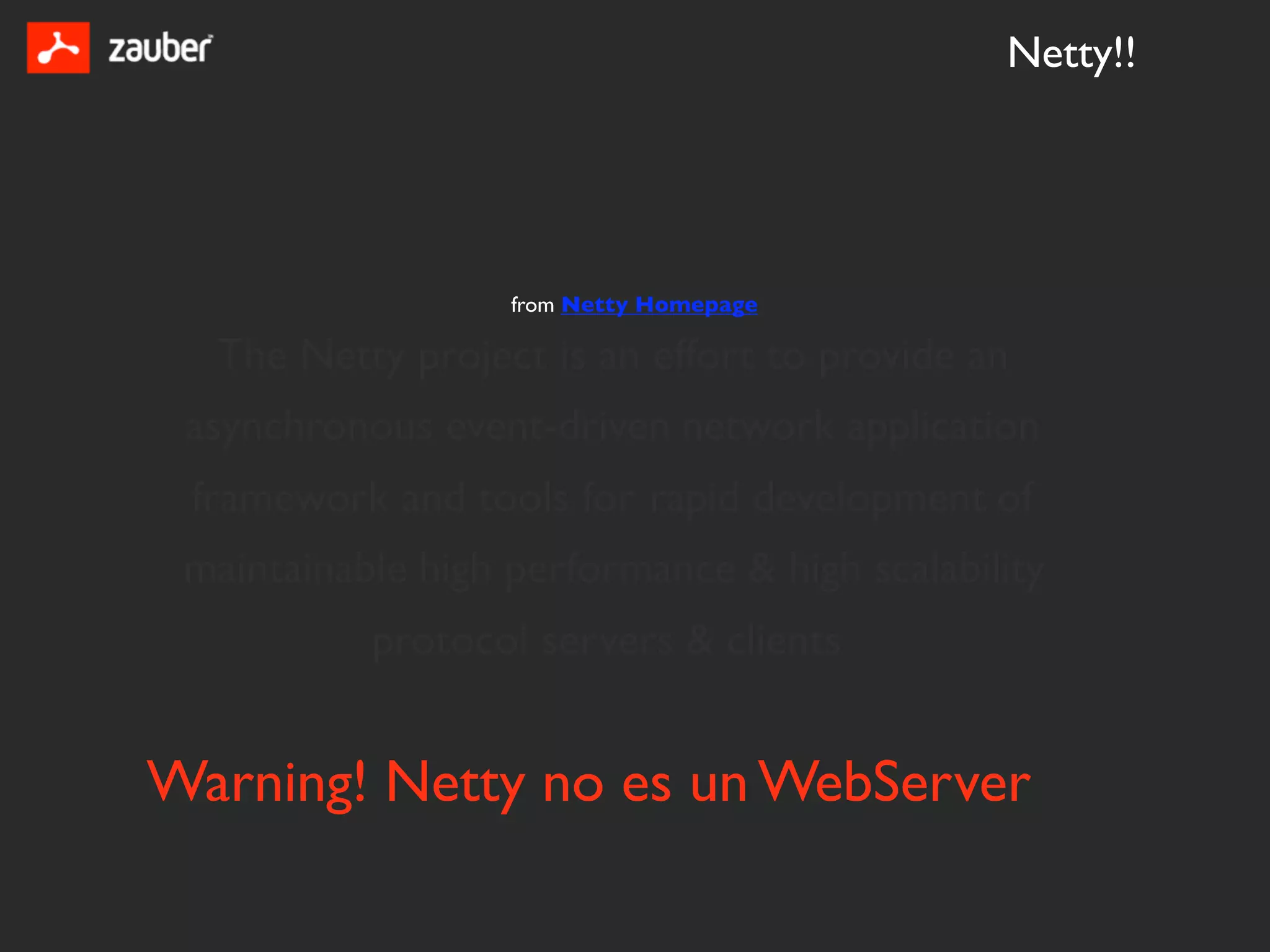
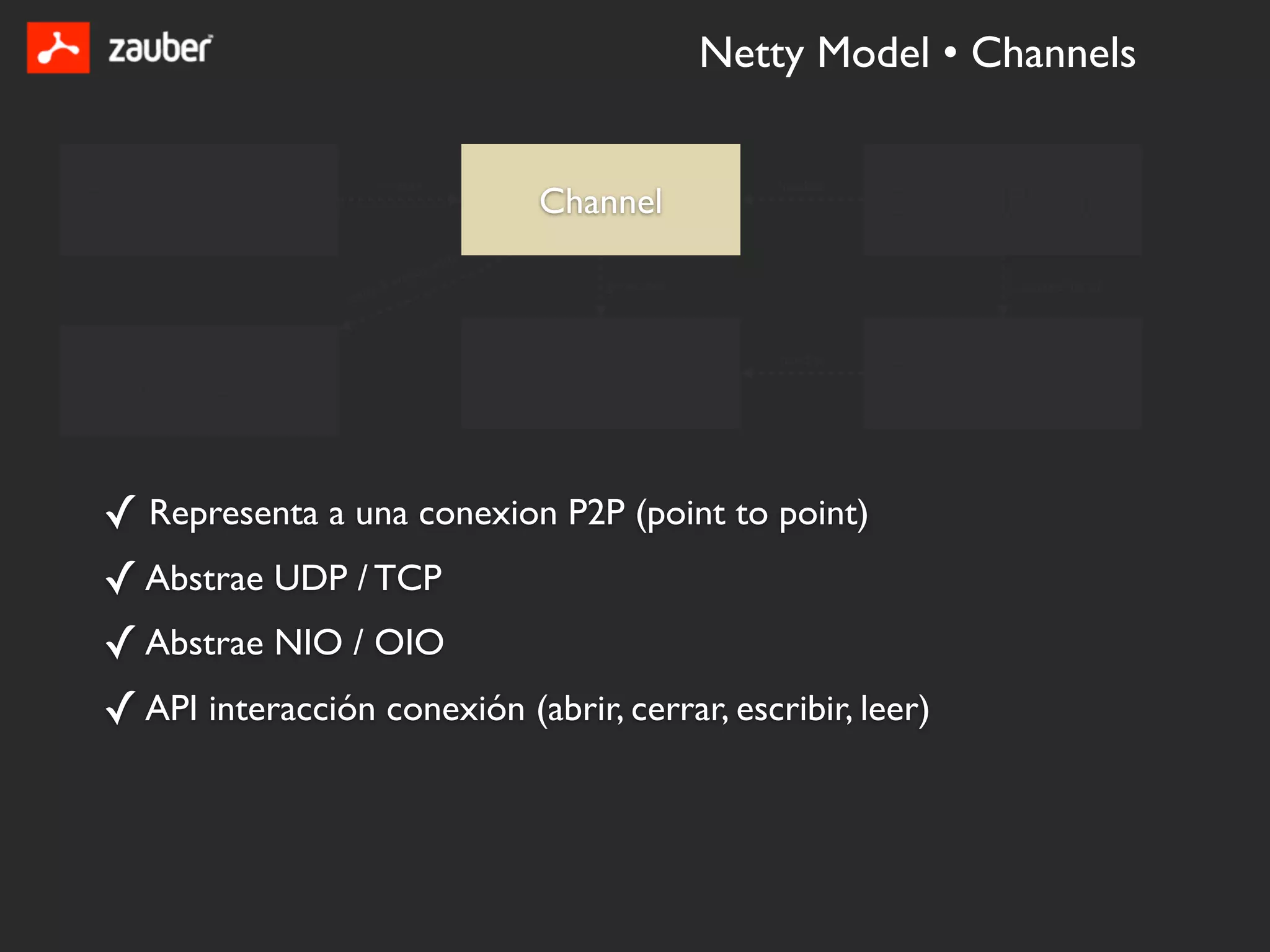
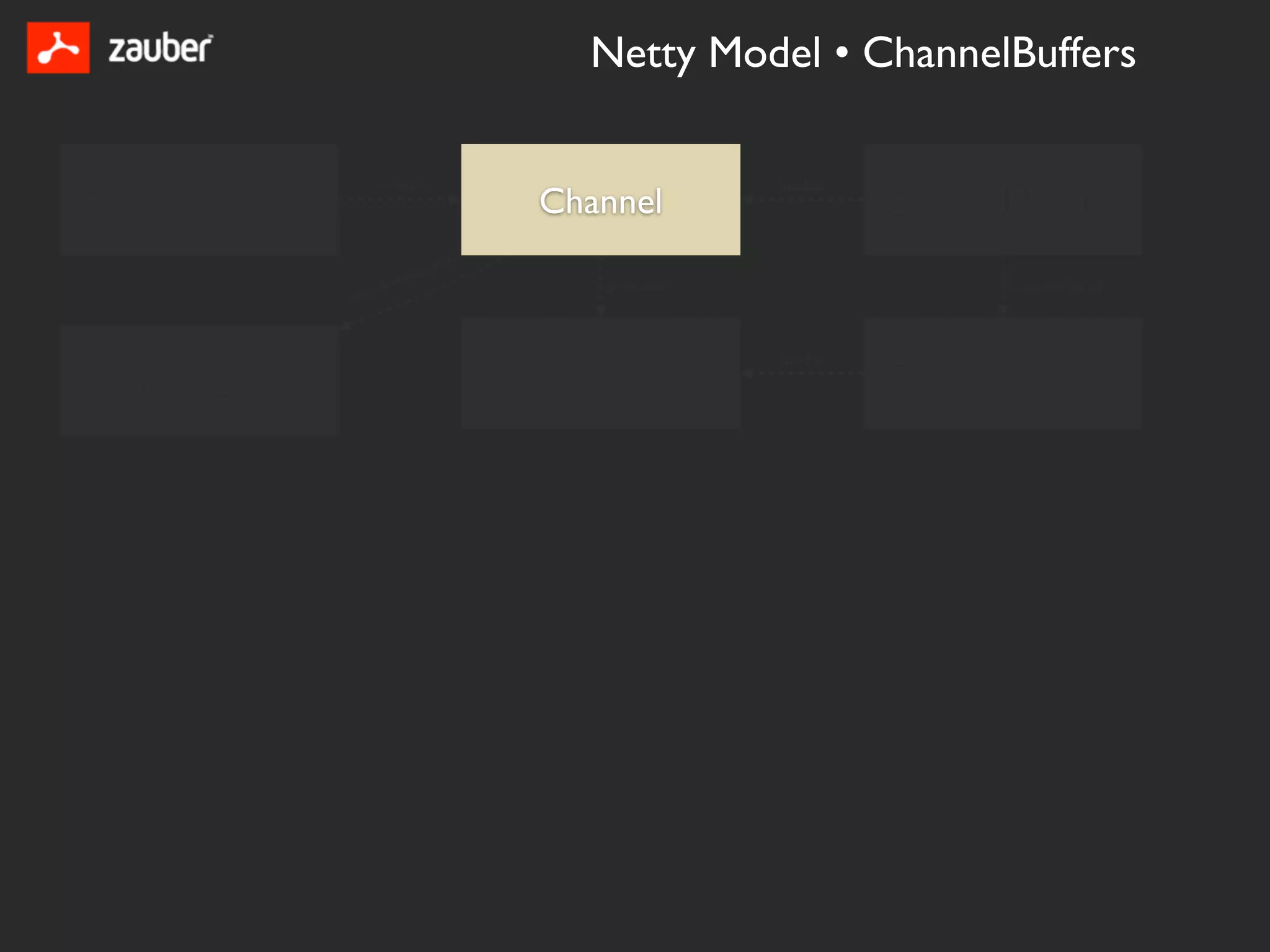
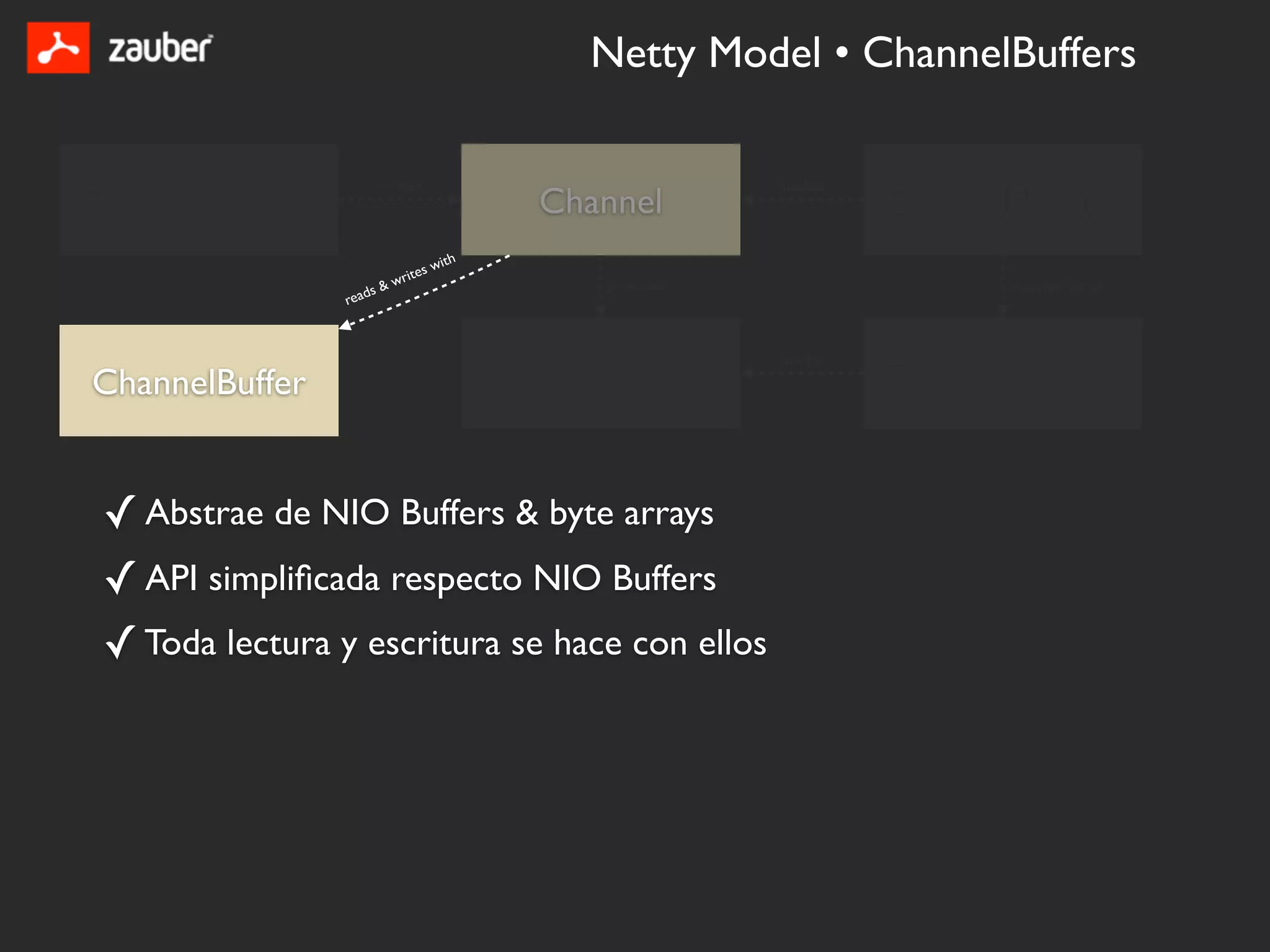
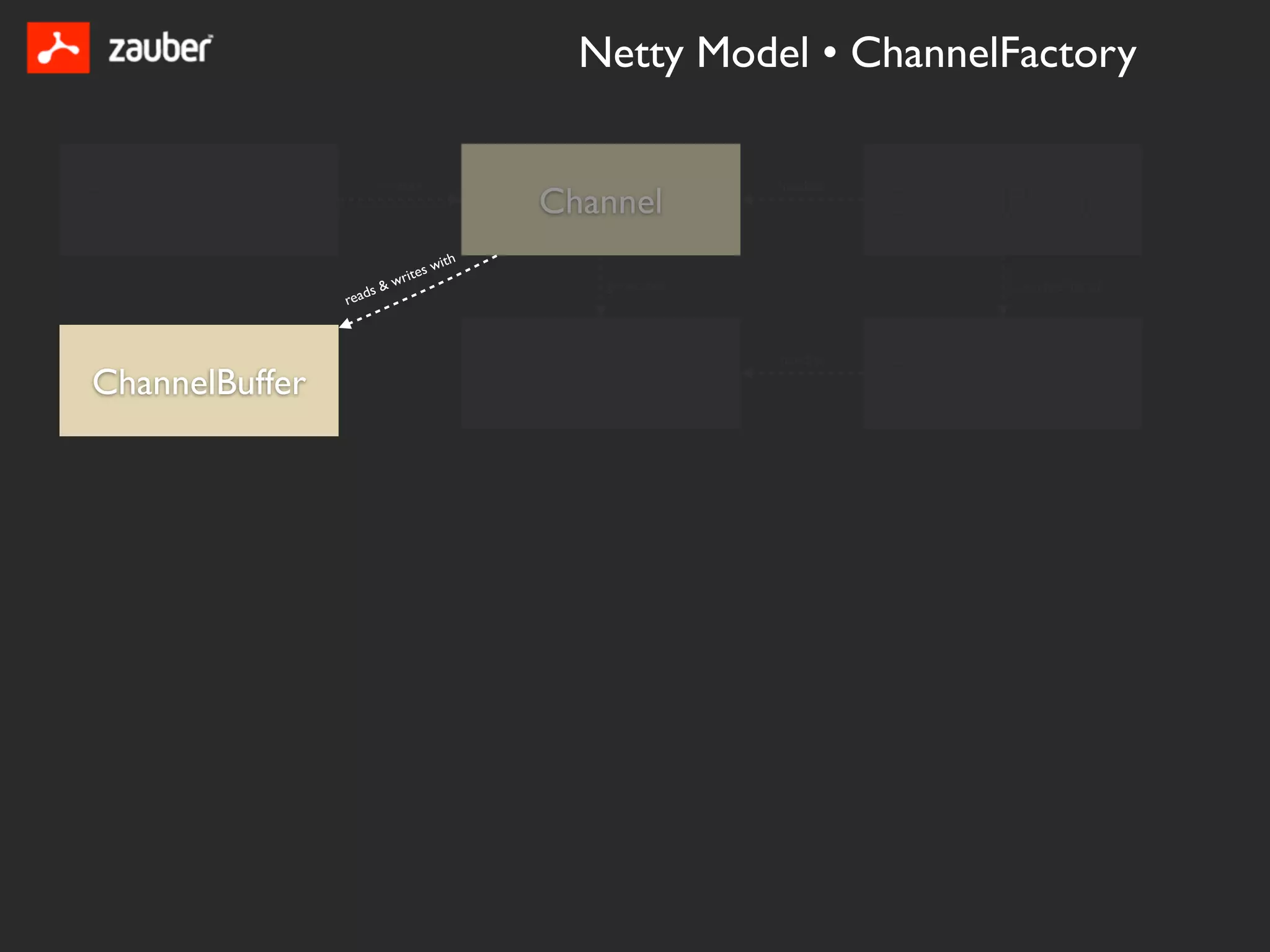
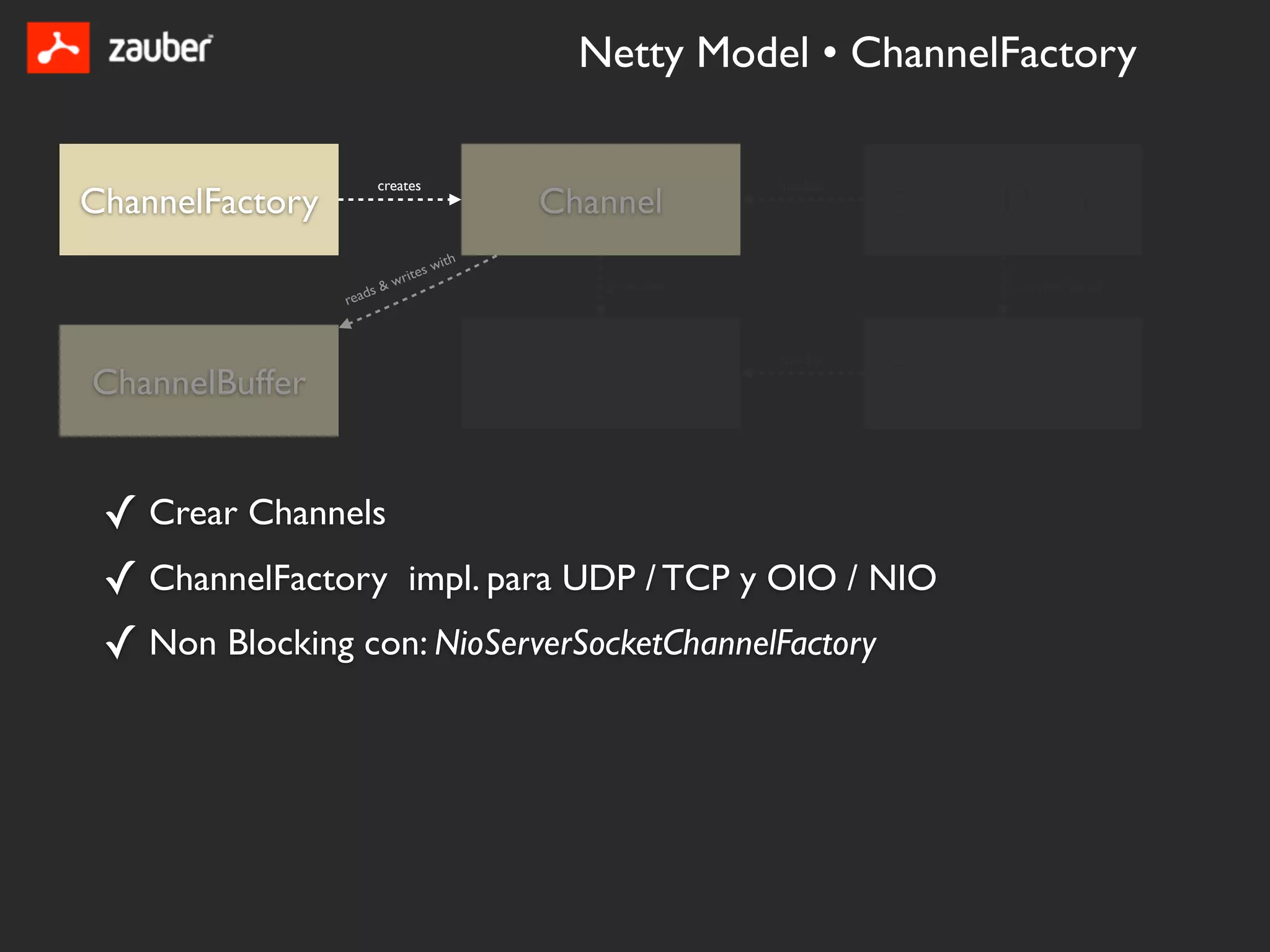

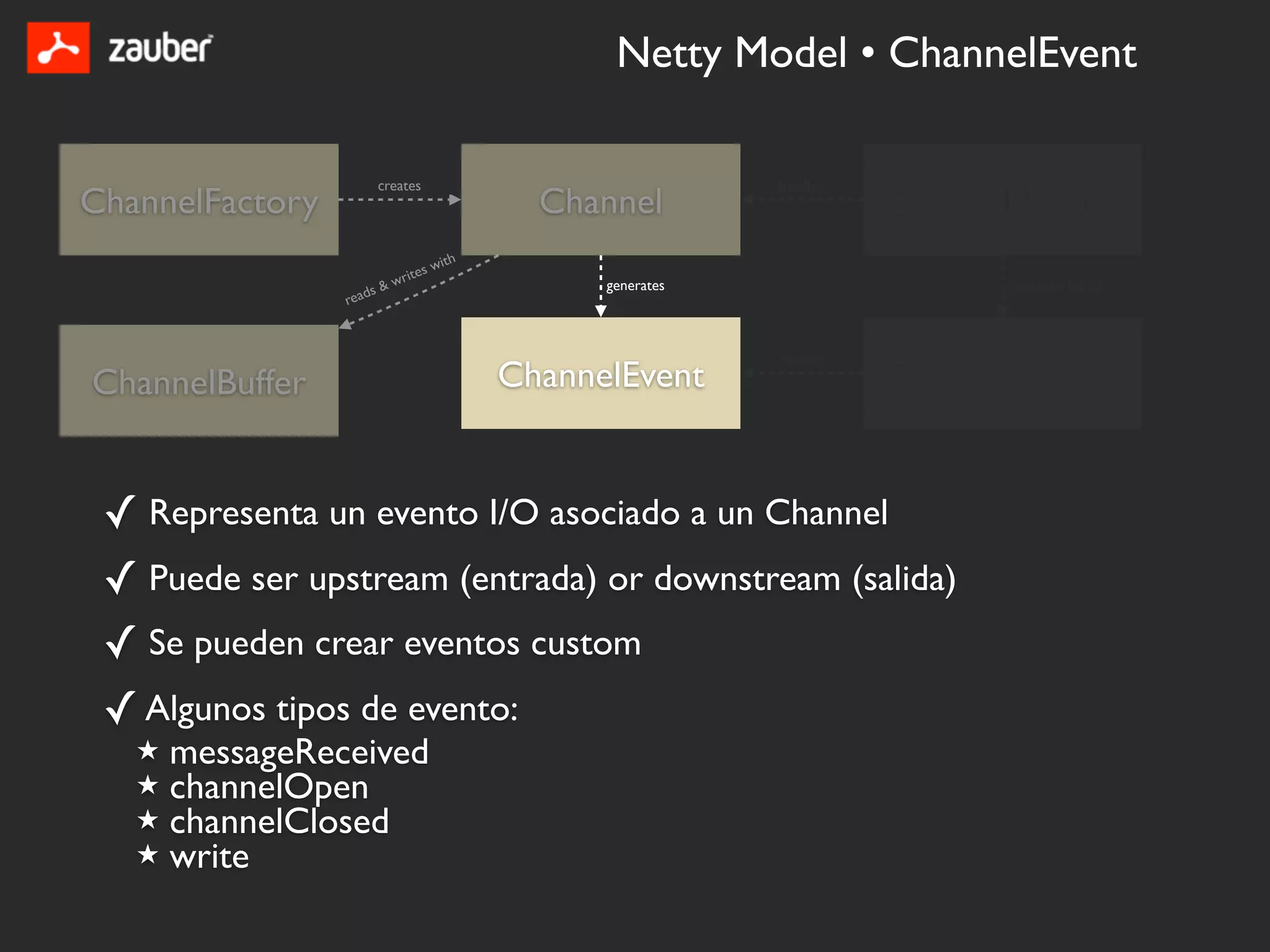
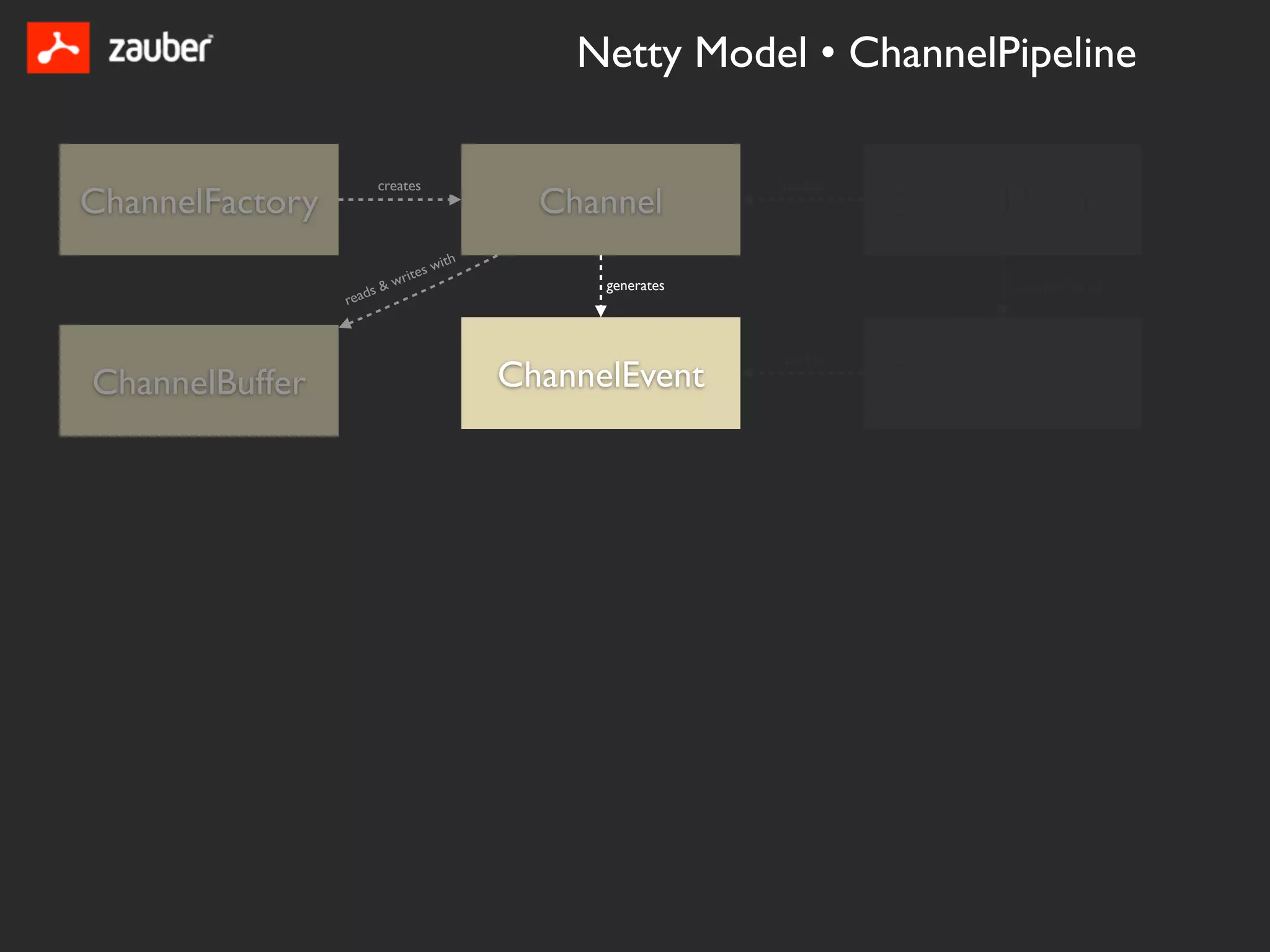
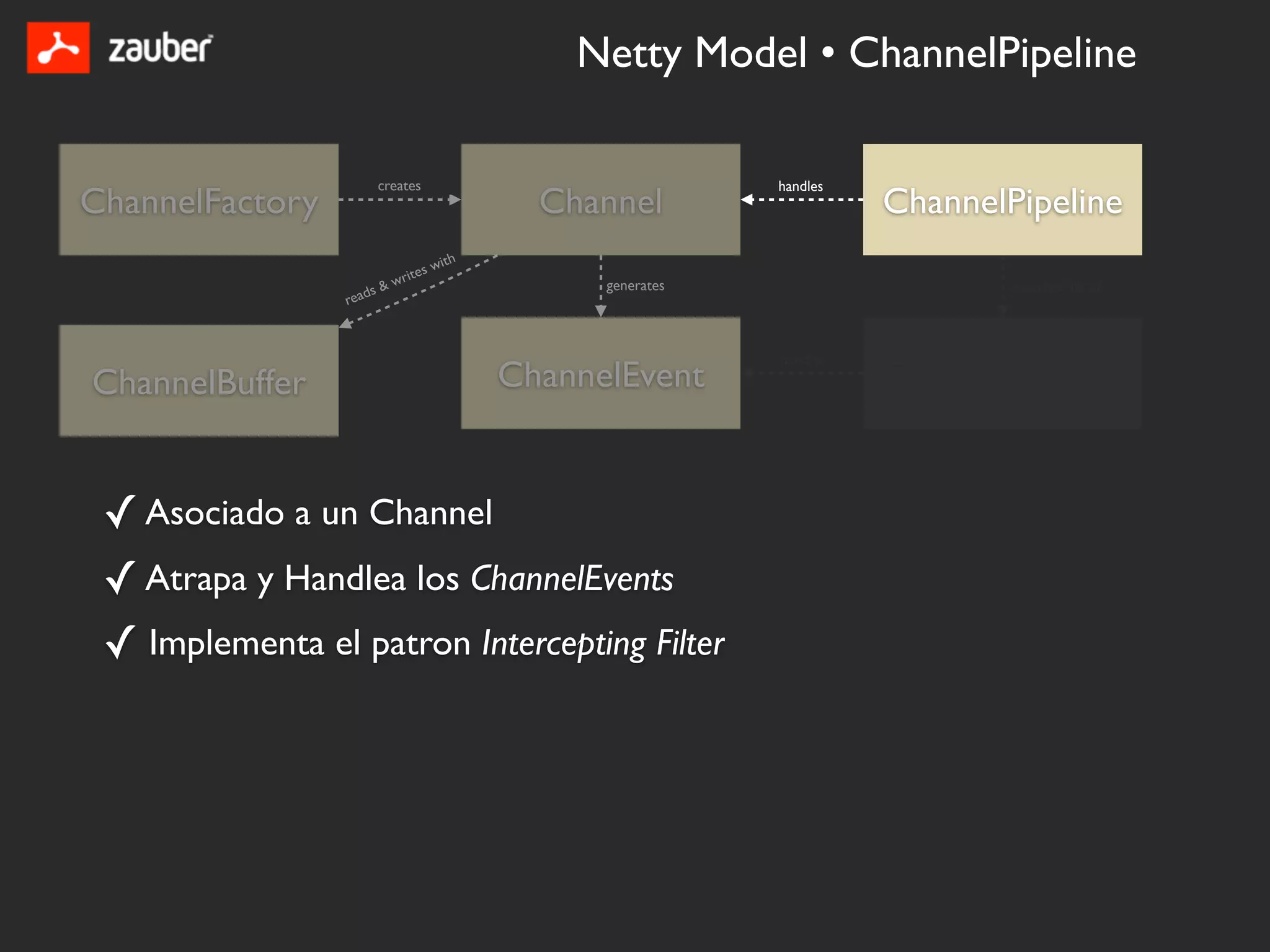
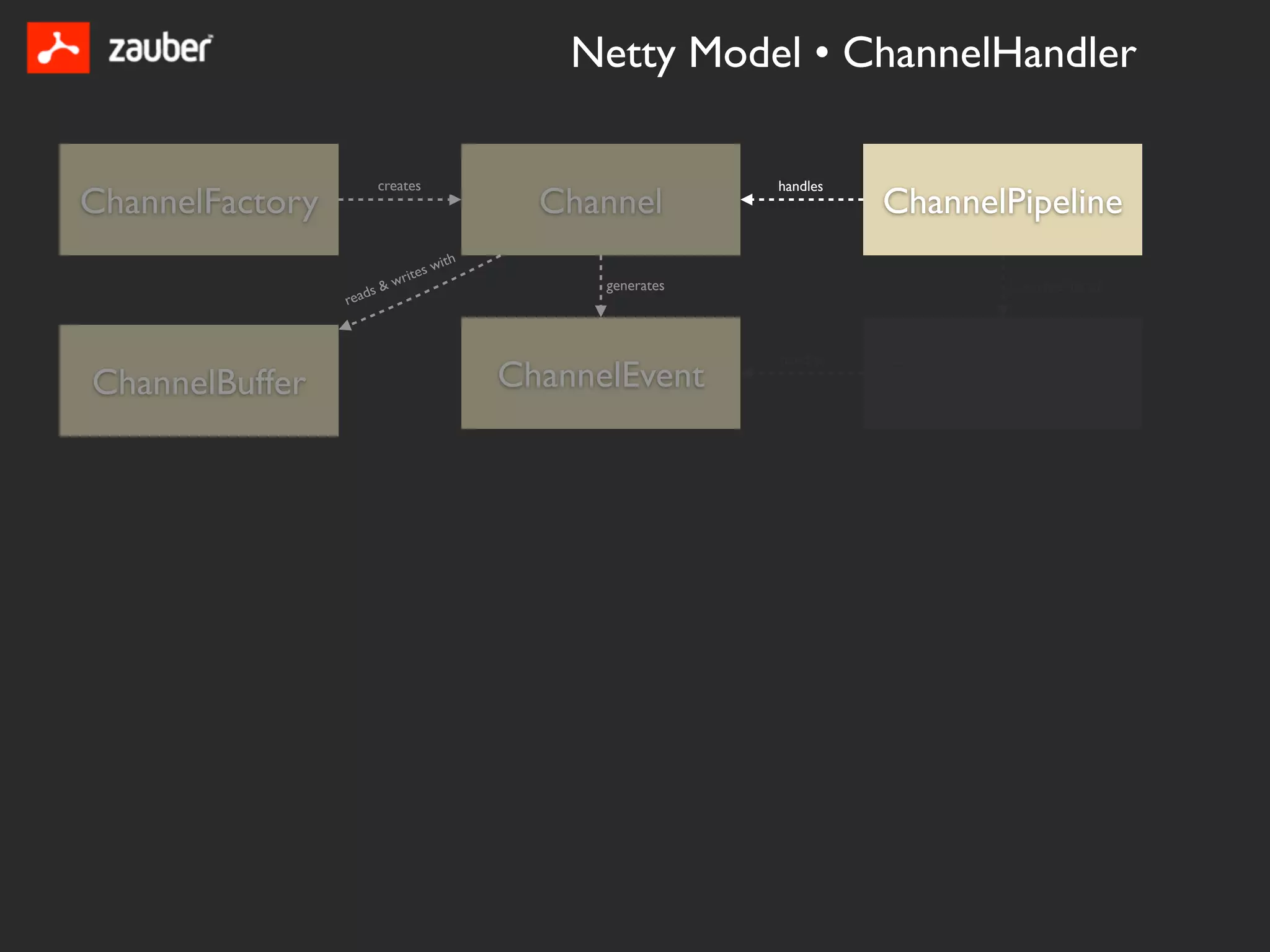
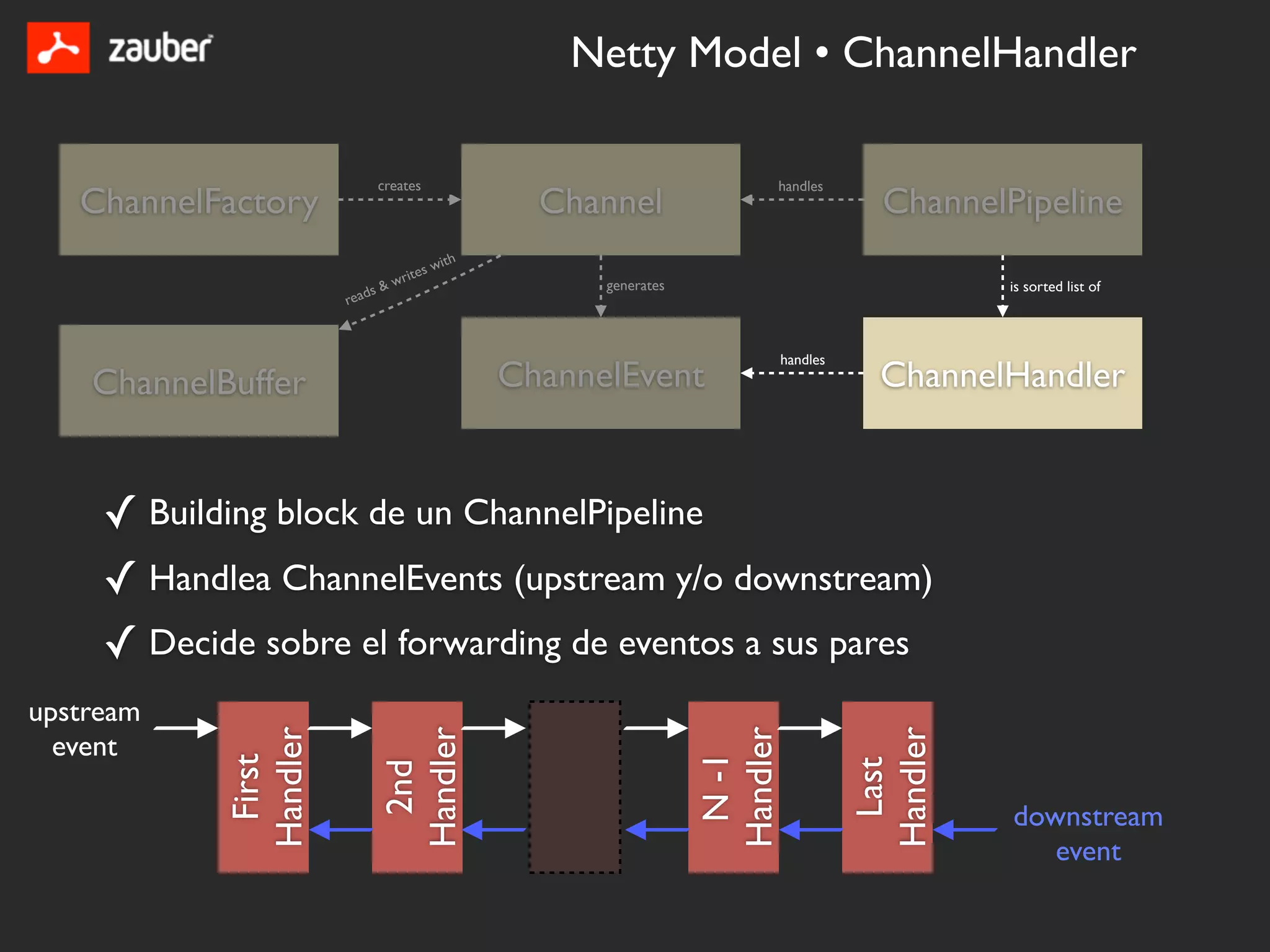
![An Echo Server • Netty NIO Main Class public class EchoServer { public static void main(String[] args) throws Exception { // Configure the server. ServerBootstrap bootstrap = new ServerBootstrap( new NioServerSocketChannelFactory( Executors.newCachedThreadPool(), Executors.newCachedThreadPool())); // Set up the pipeline factory. bootstrap.setPipelineFactory(new ChannelPipelineFactory() { public ChannelPipeline getPipeline() throws Exception { return Channels.pipeline(new EchoServerHandler()); } }); // Bind and start to accept incoming connections. bootstrap.bind(new InetSocketAddress(8080)); } } Ejemplo en: http://docs.jboss.org/netty/3.2/xref/org/jboss/netty/example/echo/package-summary.html](https://image.slidesharecdn.com/nonblockingiowithnetty-111102141510-phpapp02/75/Non-blocking-io-with-netty-70-2048.jpg)
![An Echo Server • Netty NIO Main Class public class EchoServer { Utility Class para public static void main(String[] args) throws Exception {inicializar un Server // Configure the server. ServerBootstrap bootstrap = new ServerBootstrap( new NioServerSocketChannelFactory( Executors.newCachedThreadPool(), Executors.newCachedThreadPool())); // Set up the pipeline factory. bootstrap.setPipelineFactory(new ChannelPipelineFactory() { public ChannelPipeline getPipeline() throws Exception { return Channels.pipeline(new EchoServerHandler()); } }); // Bind and start to accept incoming connections. bootstrap.bind(new InetSocketAddress(8080)); } } Ejemplo en: http://docs.jboss.org/netty/3.2/xref/org/jboss/netty/example/echo/package-summary.html](https://image.slidesharecdn.com/nonblockingiowithnetty-111102141510-phpapp02/75/Non-blocking-io-with-netty-71-2048.jpg)
![An Echo Server • Netty NIO Main Class public class EchoServer { public static void main(String[] args) throws Exception { // Configure the server. ServerBootstrap bootstrap = new ServerBootstrap( ChannelFactory para Tcp new NioServerSocketChannelFactory( w/ NIO Executors.newCachedThreadPool(), Executors.newCachedThreadPool())); // Set up the pipeline factory. bootstrap.setPipelineFactory(new ChannelPipelineFactory() { public ChannelPipeline getPipeline() throws Exception { return Channels.pipeline(new EchoServerHandler()); } }); // Bind and start to accept incoming connections. bootstrap.bind(new InetSocketAddress(8080)); } } Ejemplo en: http://docs.jboss.org/netty/3.2/xref/org/jboss/netty/example/echo/package-summary.html](https://image.slidesharecdn.com/nonblockingiowithnetty-111102141510-phpapp02/75/Non-blocking-io-with-netty-72-2048.jpg)
![An Echo Server • Netty NIO Main Class public class EchoServer { public static void main(String[] args) throws Exception { // Configure the server. Boss pool thread ServerBootstrap bootstrap = new ServerBootstrap( new NioServerSocketChannelFactory( Executors.newCachedThreadPool(), Executors.newCachedThreadPool())); Workers pool thread // Set up the pipeline factory. bootstrap.setPipelineFactory(new ChannelPipelineFactory() { public ChannelPipeline getPipeline() throws Exception { return Channels.pipeline(new EchoServerHandler()); } }); // Bind and start to accept incoming connections. bootstrap.bind(new InetSocketAddress(8080)); } } Ejemplo en: http://docs.jboss.org/netty/3.2/xref/org/jboss/netty/example/echo/package-summary.html](https://image.slidesharecdn.com/nonblockingiowithnetty-111102141510-phpapp02/75/Non-blocking-io-with-netty-73-2048.jpg)
![An Echo Server • Netty NIO Main Class public class EchoServer { public static void main(String[] args) throws Exception { // Configure the server. ServerBootstrap bootstrap = new ServerBootstrap( new NioServerSocketChannelFactory( Executors.newCachedThreadPool(), Executors.newCachedThreadPool())); // Set up the pipeline factory. bootstrap.setPipelineFactory(new ChannelPipelineFactory() { public ChannelPipeline getPipeline() throws Exception { ChannelPipelineFactory para cada nuevo Channel return Channels.pipeline(new EchoServerHandler()); establcido } }); // Bind and start to accept incoming connections. bootstrap.bind(new InetSocketAddress(8080)); } } Ejemplo en: http://docs.jboss.org/netty/3.2/xref/org/jboss/netty/example/echo/package-summary.html](https://image.slidesharecdn.com/nonblockingiowithnetty-111102141510-phpapp02/75/Non-blocking-io-with-netty-74-2048.jpg)
![An Echo Server • Netty NIO Main Class public class EchoServer { public static void main(String[] args) throws Exception { // Configure the server. ServerBootstrap bootstrap = new ServerBootstrap( new NioServerSocketChannelFactory( Executors.newCachedThreadPool(), Executors.newCachedThreadPool())); // Set up the pipeline factory. bootstrap.setPipelineFactory(new ChannelPipelineFactory() { public ChannelPipeline getPipeline() throws Exception { return Channels.pipeline(new EchoServerHandler()); } }); Un solo handler. El echo Handler // Bind and start to accept incoming connections. bootstrap.bind(new InetSocketAddress(8080)); } } Ejemplo en: http://docs.jboss.org/netty/3.2/xref/org/jboss/netty/example/echo/package-summary.html](https://image.slidesharecdn.com/nonblockingiowithnetty-111102141510-phpapp02/75/Non-blocking-io-with-netty-75-2048.jpg)
![An Echo Server • Netty NIO Main Class public class EchoServer { public static void main(String[] args) throws Exception { // Configure the server. ServerBootstrap bootstrap = new ServerBootstrap( new NioServerSocketChannelFactory( Executors.newCachedThreadPool(), Executors.newCachedThreadPool())); // Set up the pipeline factory. bootstrap.setPipelineFactory(new ChannelPipelineFactory() { public ChannelPipeline getPipeline() throws Exception { return Channels.pipeline(new EchoServerHandler()); } }); // Bind and start to accept incoming connections. bootstrap.bind(new InetSocketAddress(8080)); } } Finalmente inicializamos el servidor Ejemplo en: http://docs.jboss.org/netty/3.2/xref/org/jboss/netty/example/echo/package-summary.html](https://image.slidesharecdn.com/nonblockingiowithnetty-111102141510-phpapp02/75/Non-blocking-io-with-netty-76-2048.jpg)
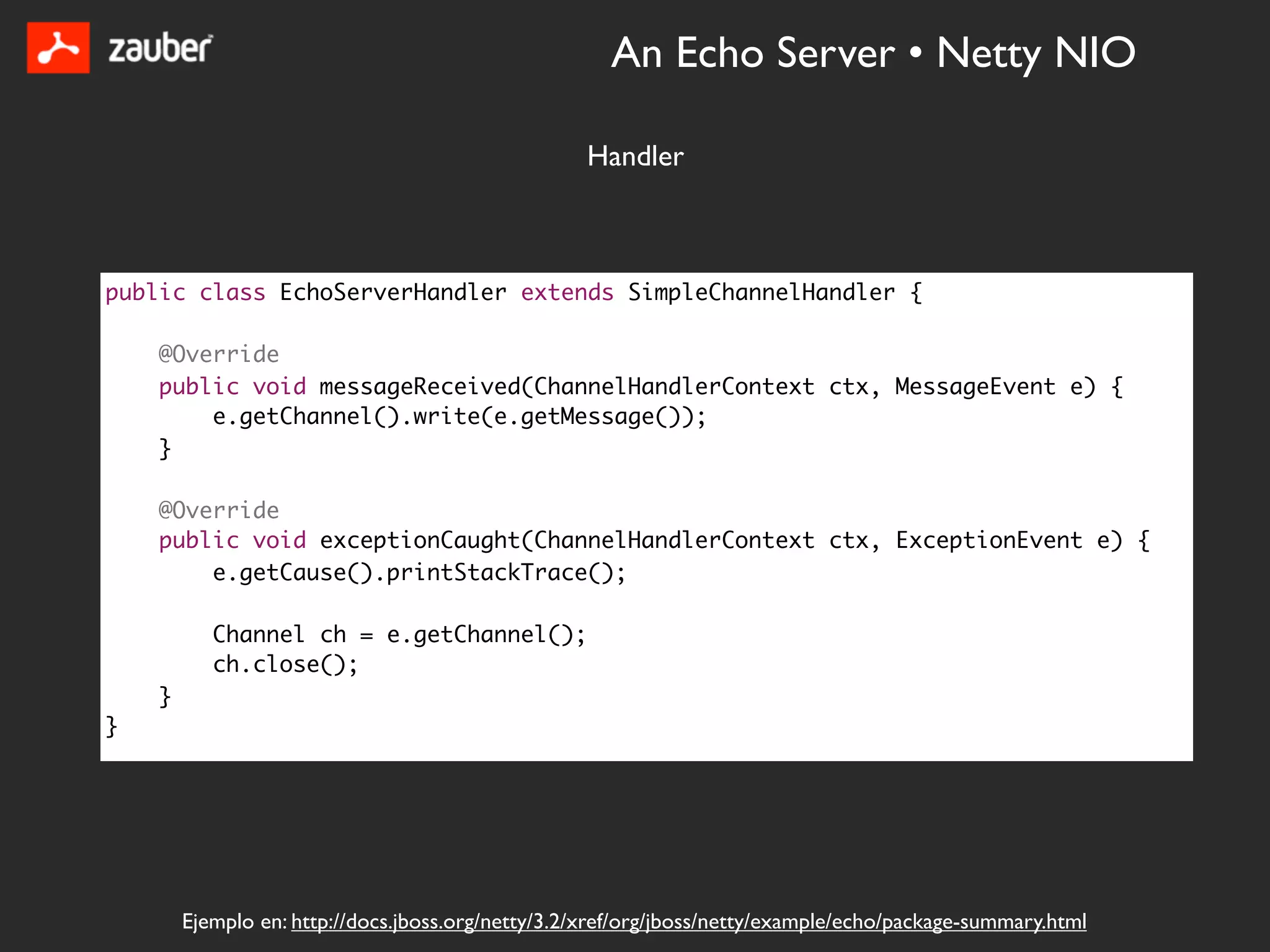
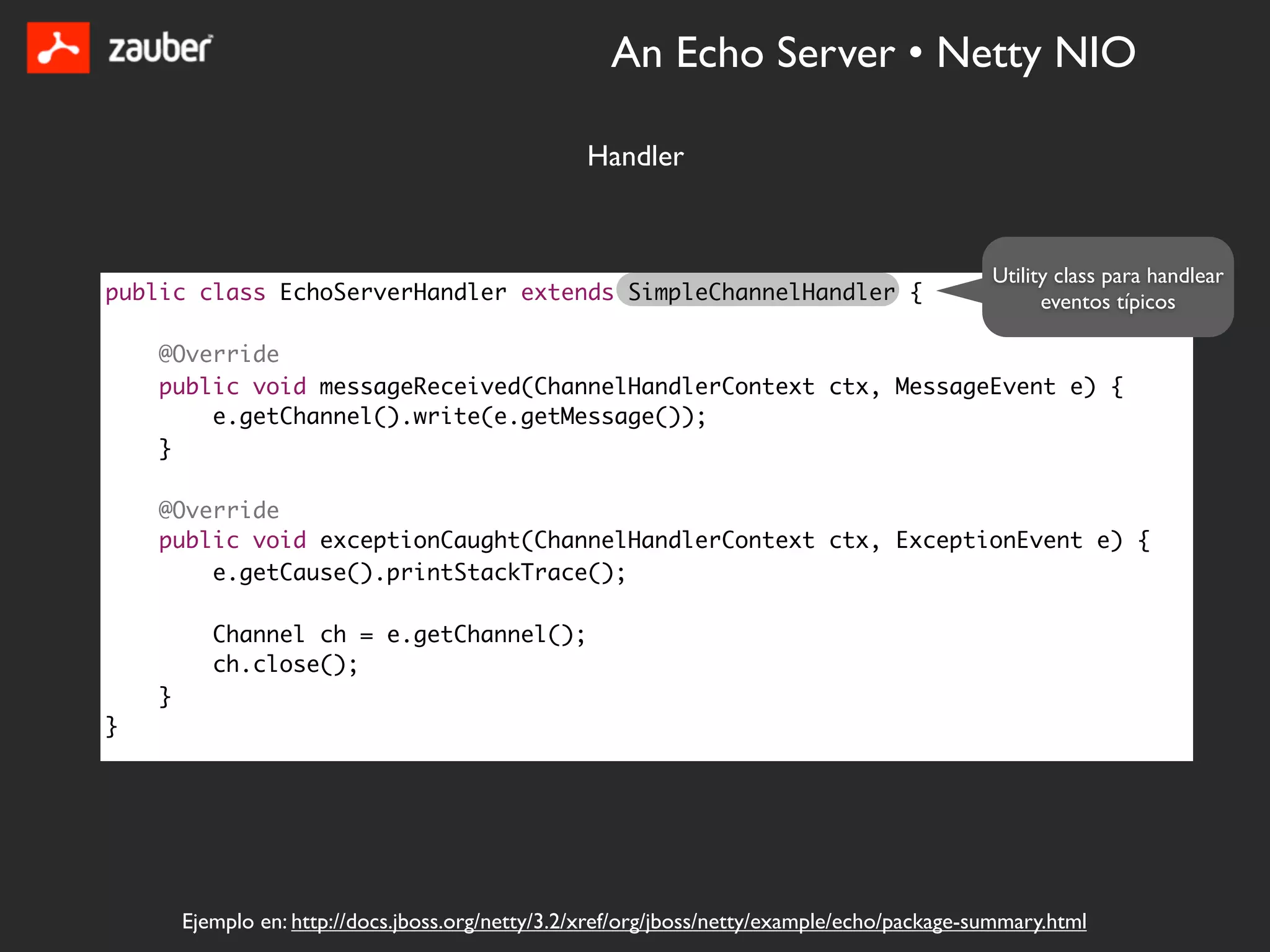
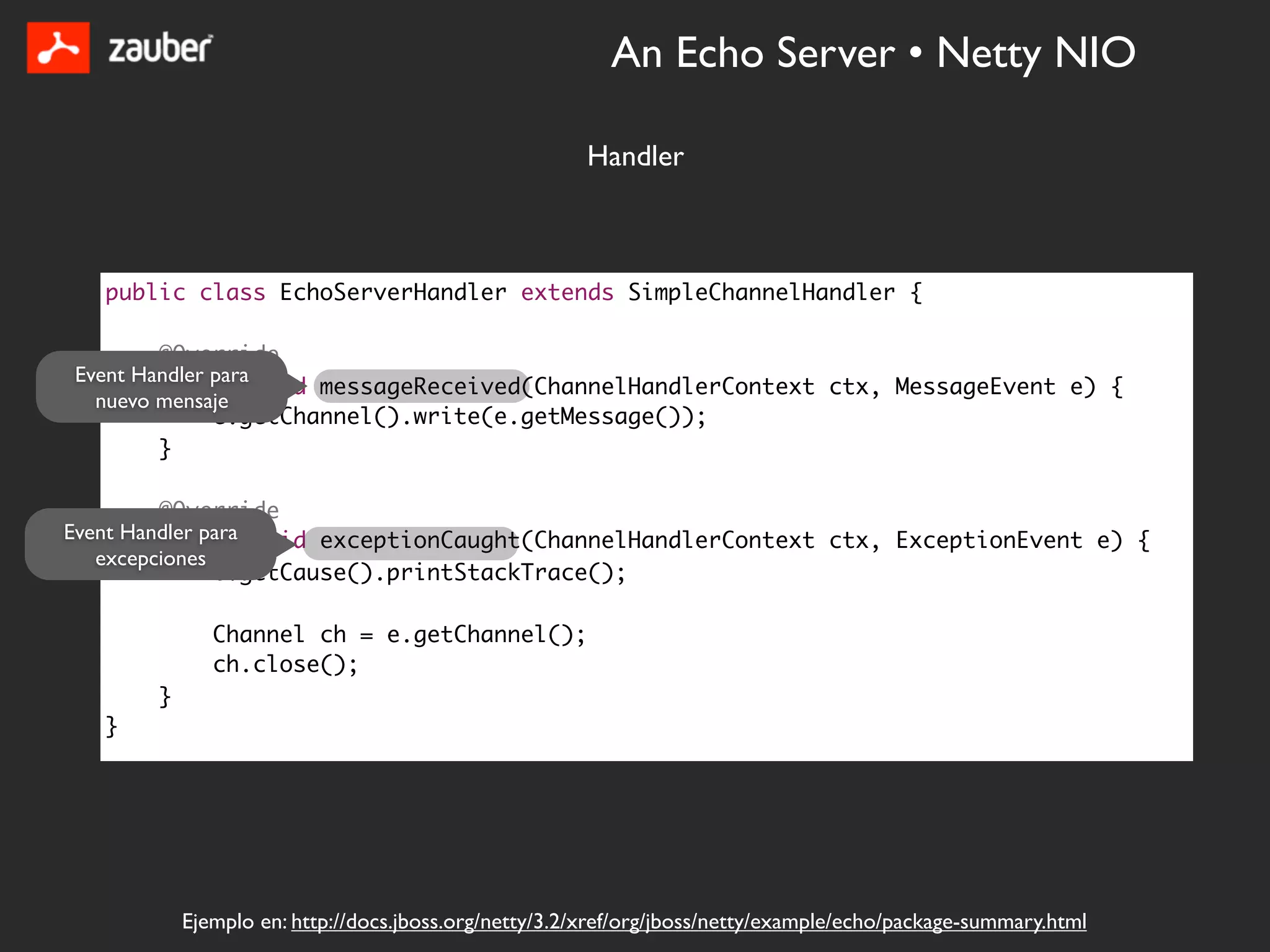
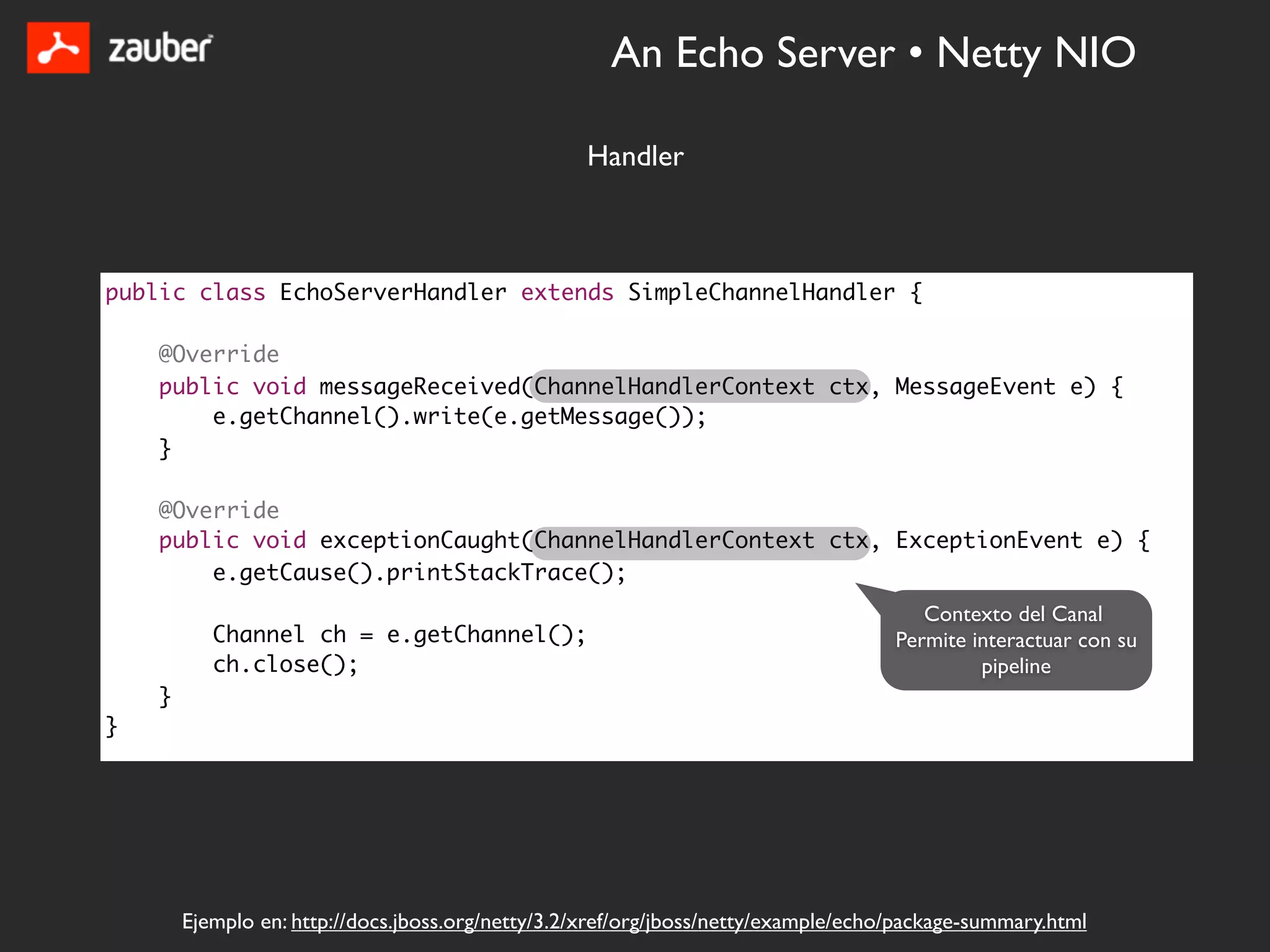
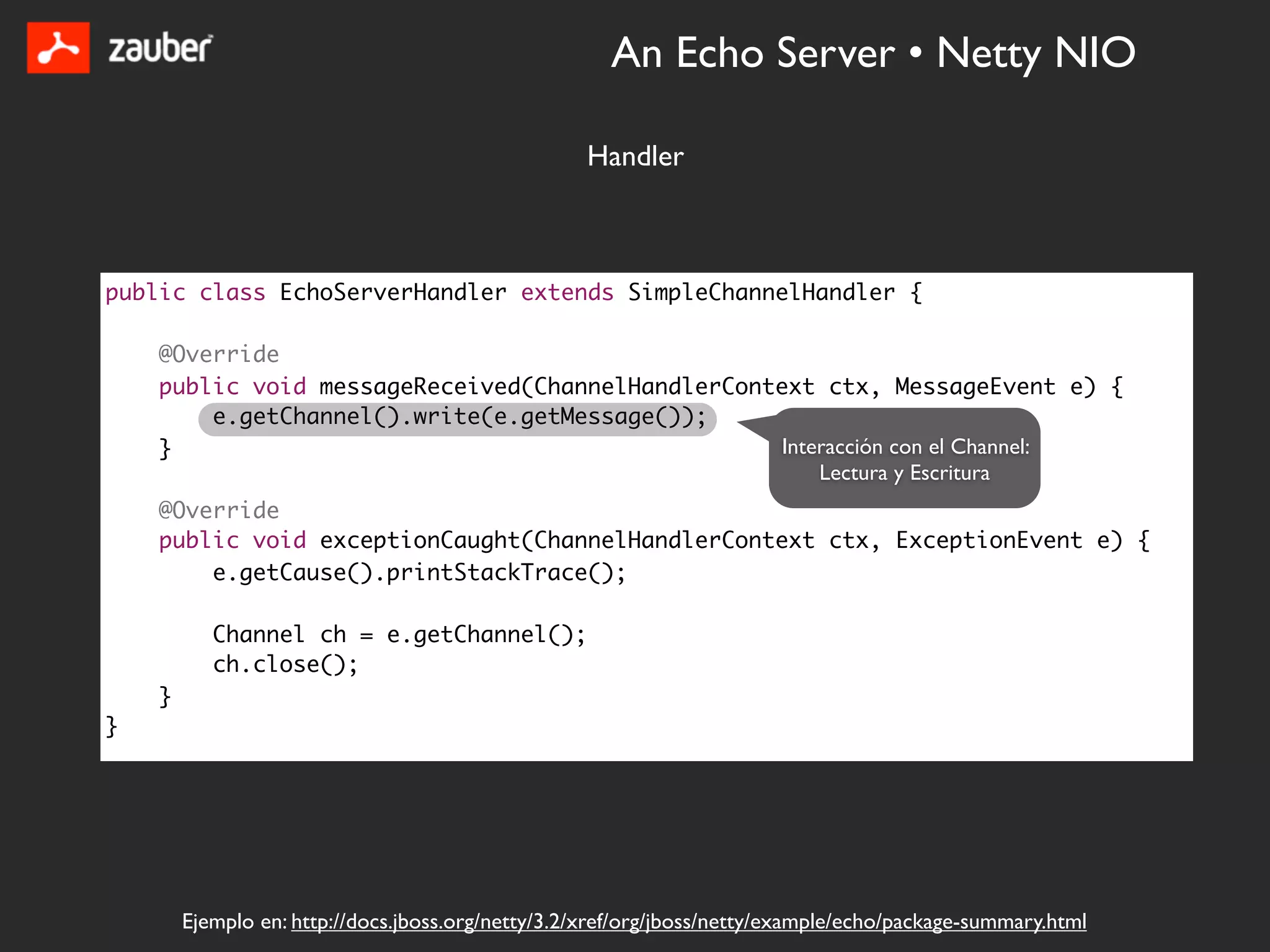
![An Echo Server • Netty OIO Vuelta a OIO! public class EchoServer { public static void main(String[] args) throws Exception { // Configure the server. ServerBootstrap bootstrap = new ServerBootstrap( new OioServerSocketChannelFactory( Executors.newCachedThreadPool(), Executors.newCachedThreadPool())); // Set up the pipeline factory. bootstrap.setPipelineFactory(new ChannelPipelineFactory() { public ChannelPipeline getPipeline() throws Exception { return Channels.pipeline(new EchoServerHandler()); } }); // Bind and start to accept incoming connections. bootstrap.bind(new InetSocketAddress(8080)); } }](https://image.slidesharecdn.com/nonblockingiowithnetty-111102141510-phpapp02/75/Non-blocking-io-with-netty-82-2048.jpg)
![An Echo Server • Netty OIO Vuelta a OIO! public class EchoServer { public static void main(String[] args) throws Exception { // Configure the server. ServerBootstrap bootstrap = new ServerBootstrap( ChannelFactory para Tcp new OioServerSocketChannelFactory( w/ OIO Executors.newCachedThreadPool(), Executors.newCachedThreadPool())); // Set up the pipeline factory. bootstrap.setPipelineFactory(new ChannelPipelineFactory() { public ChannelPipeline getPipeline() throws Exception { return Channels.pipeline(new EchoServerHandler()); } }); // Bind and start to accept incoming connections. bootstrap.bind(new InetSocketAddress(8080)); } }](https://image.slidesharecdn.com/nonblockingiowithnetty-111102141510-phpapp02/75/Non-blocking-io-with-netty-83-2048.jpg)
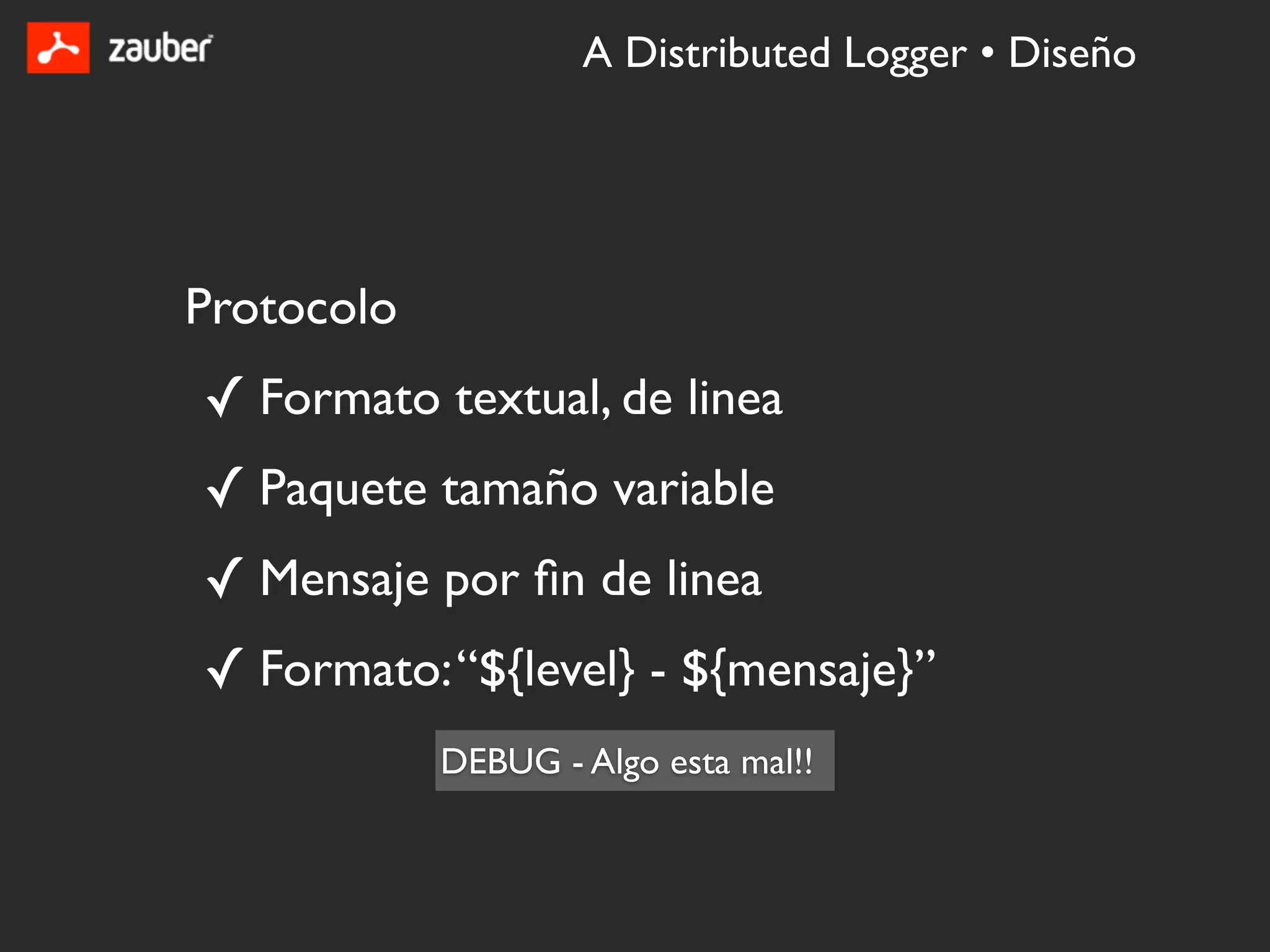
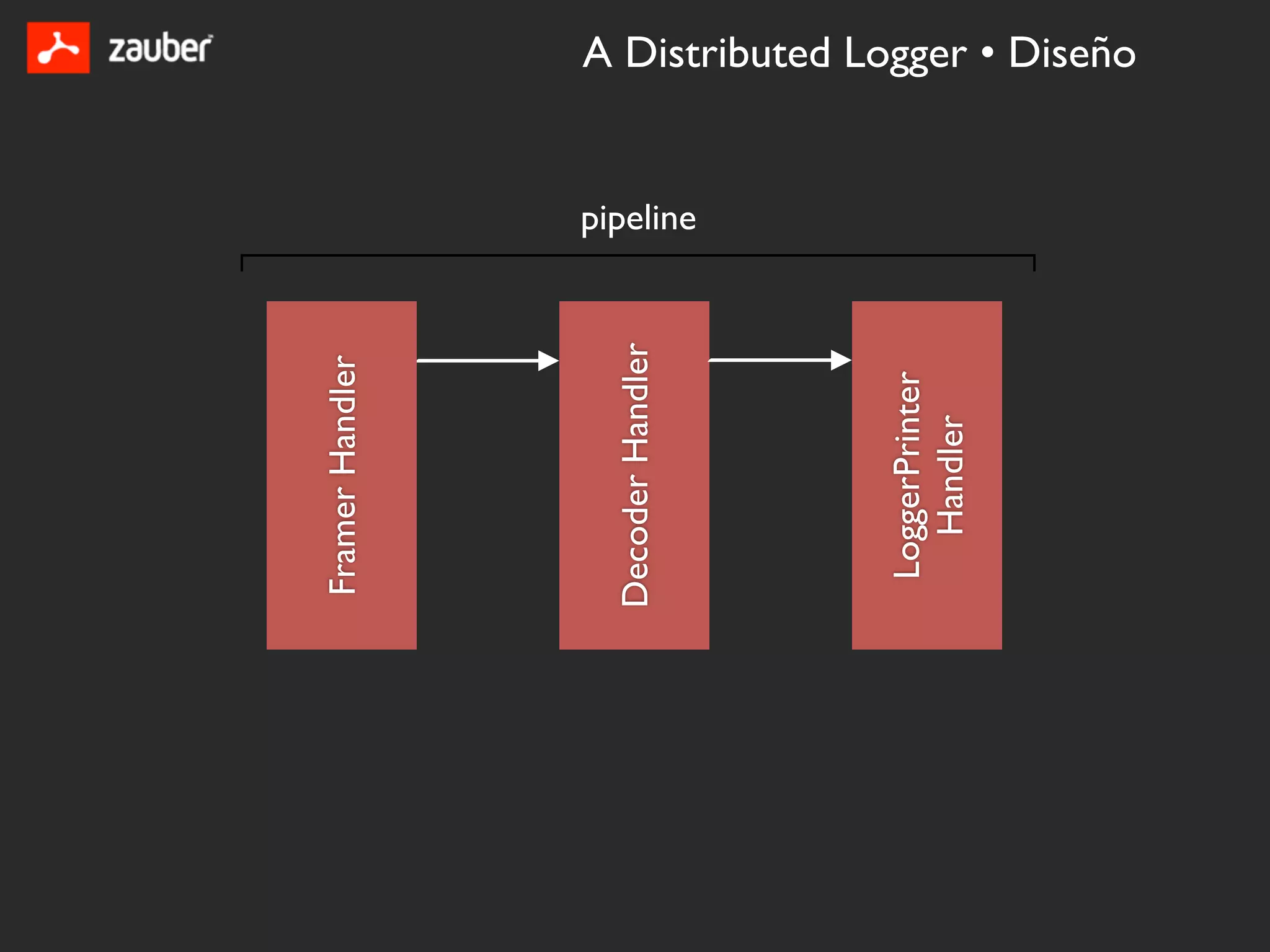
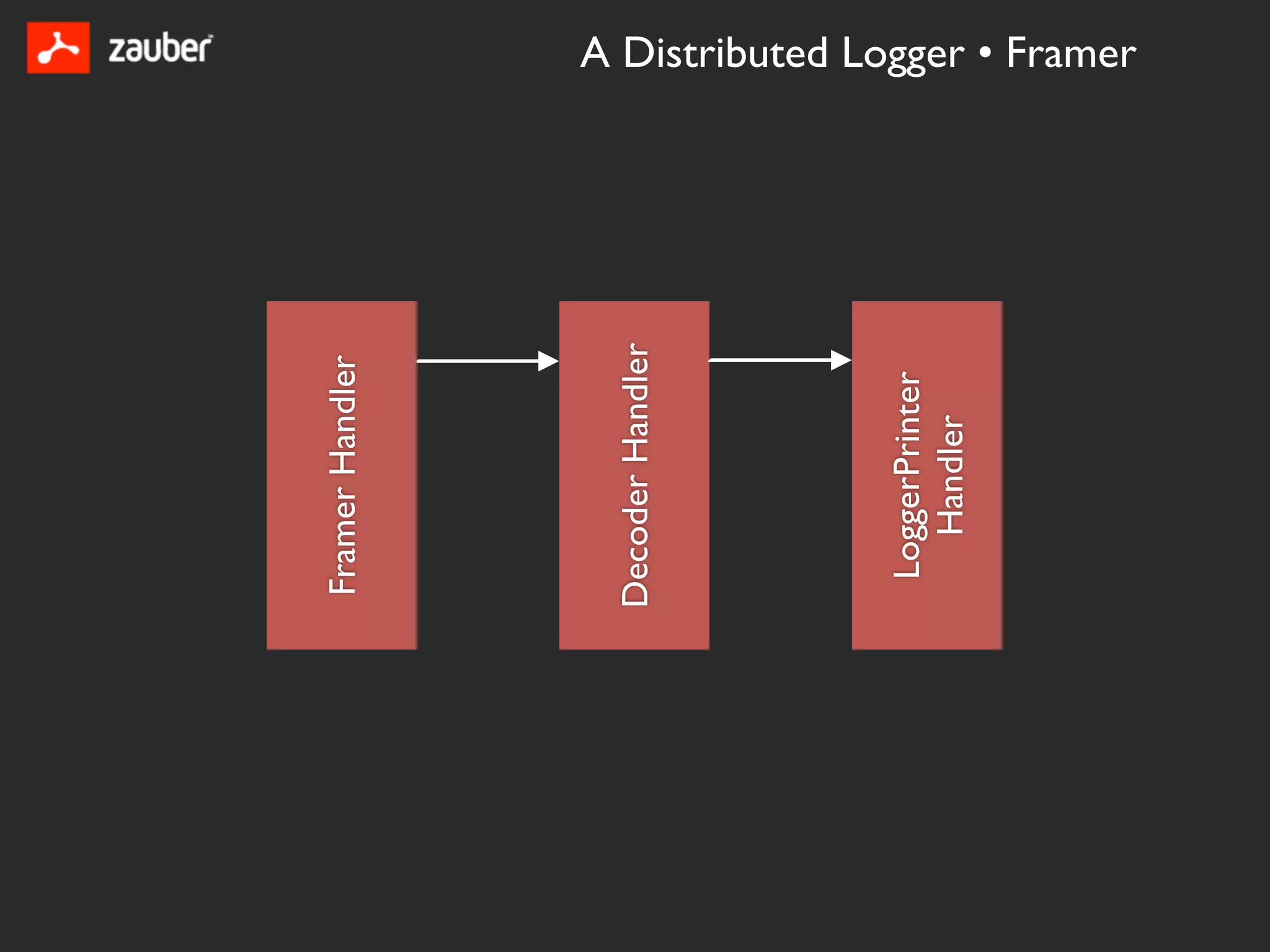
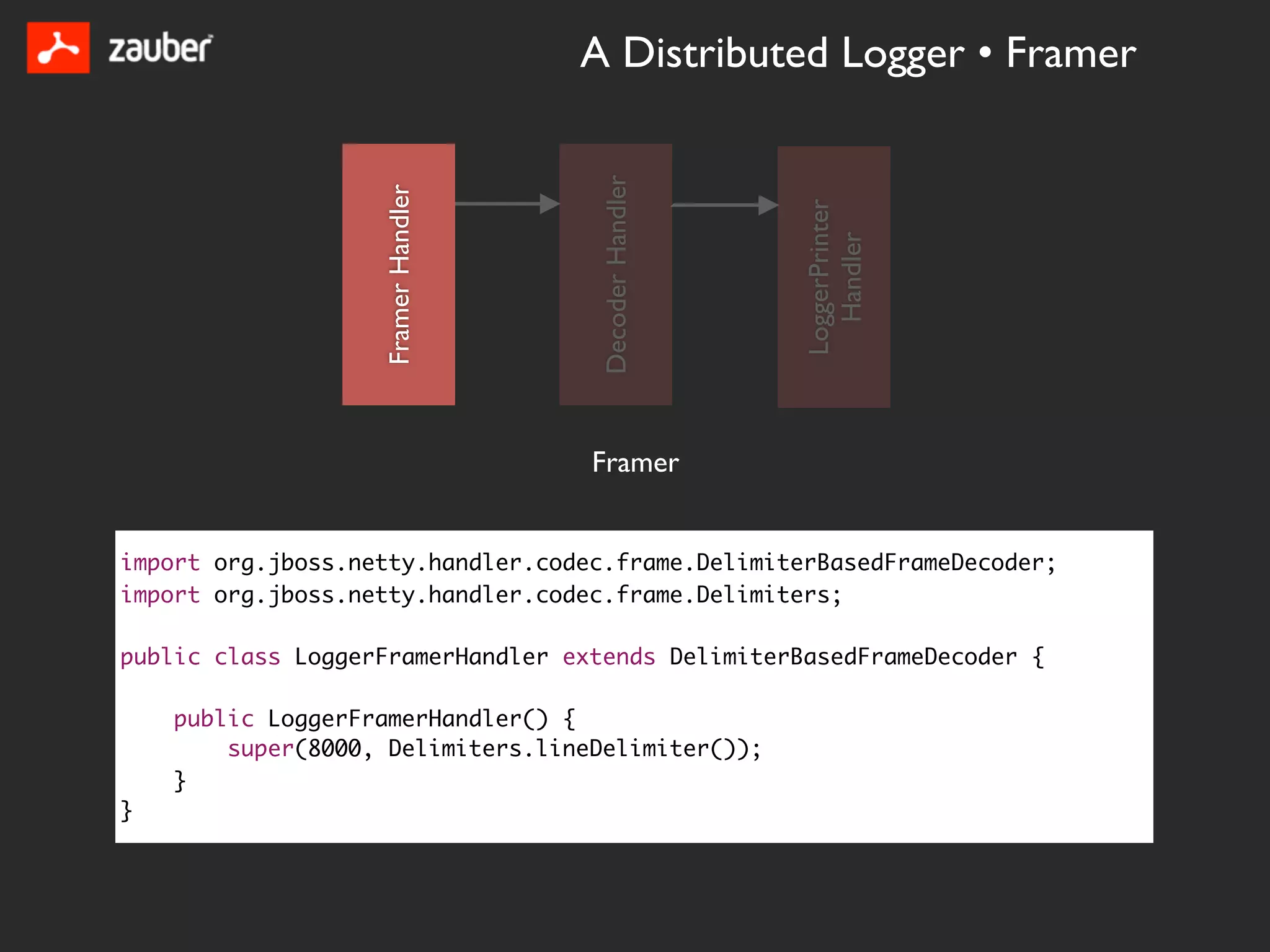
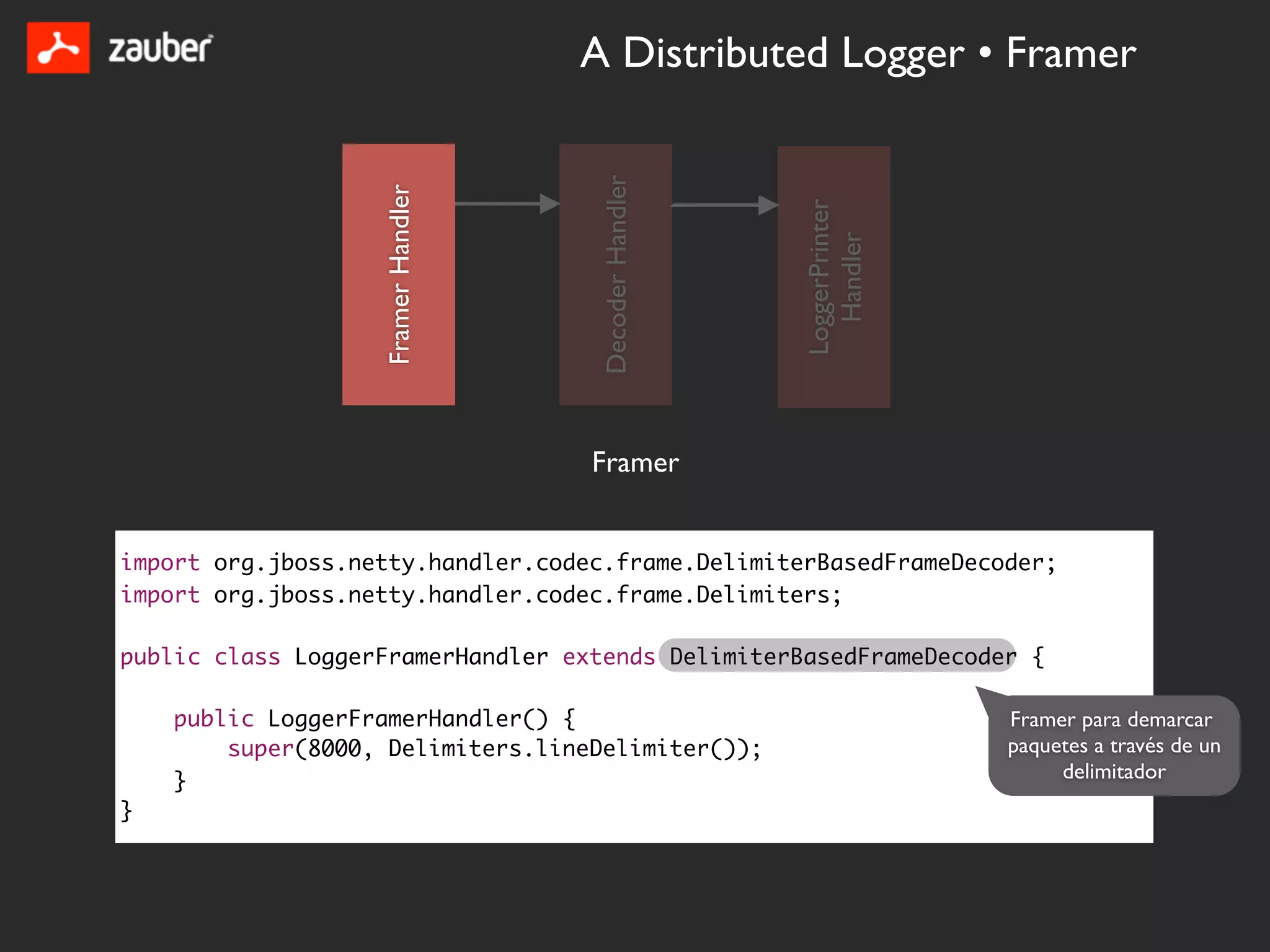
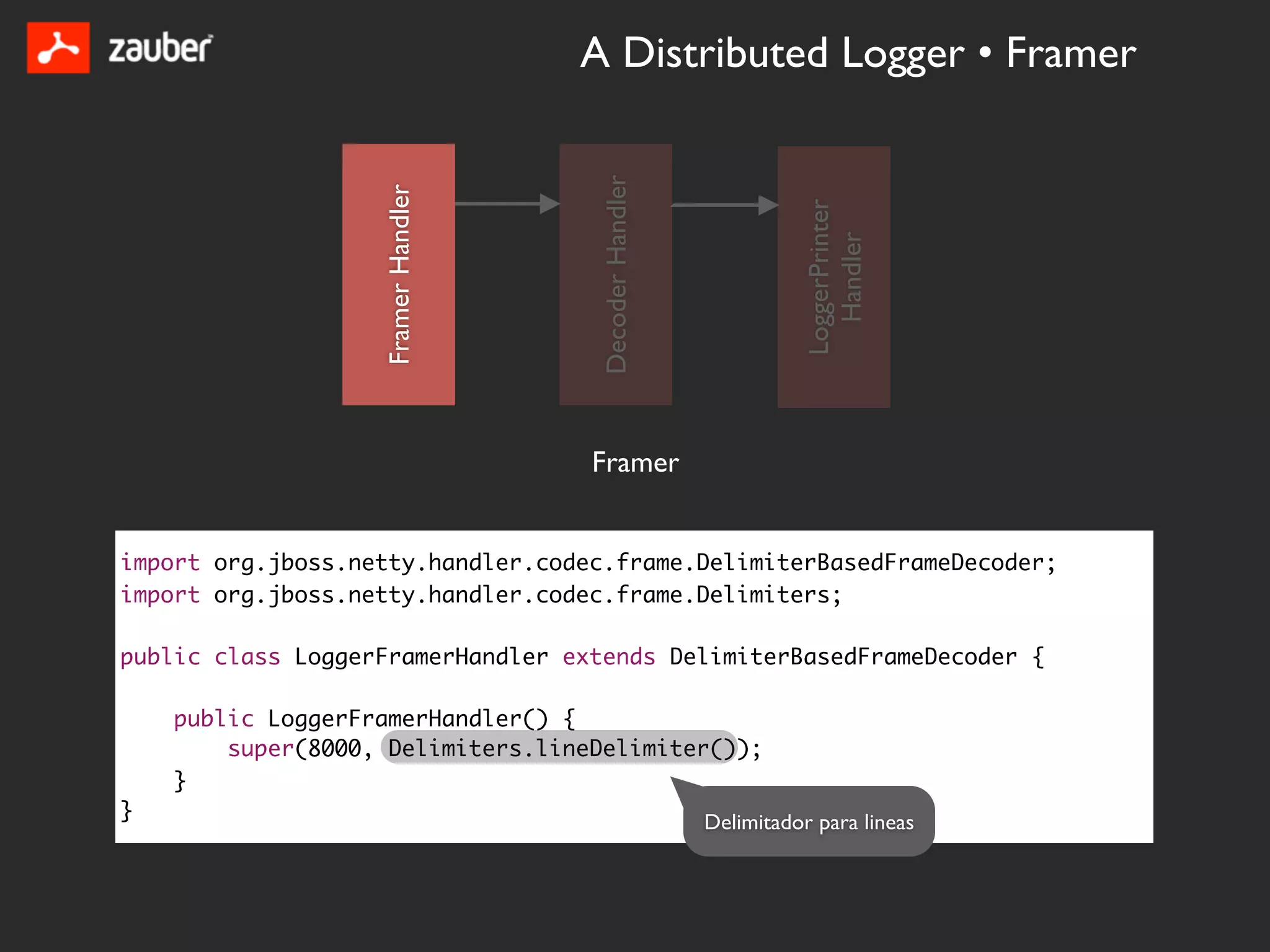
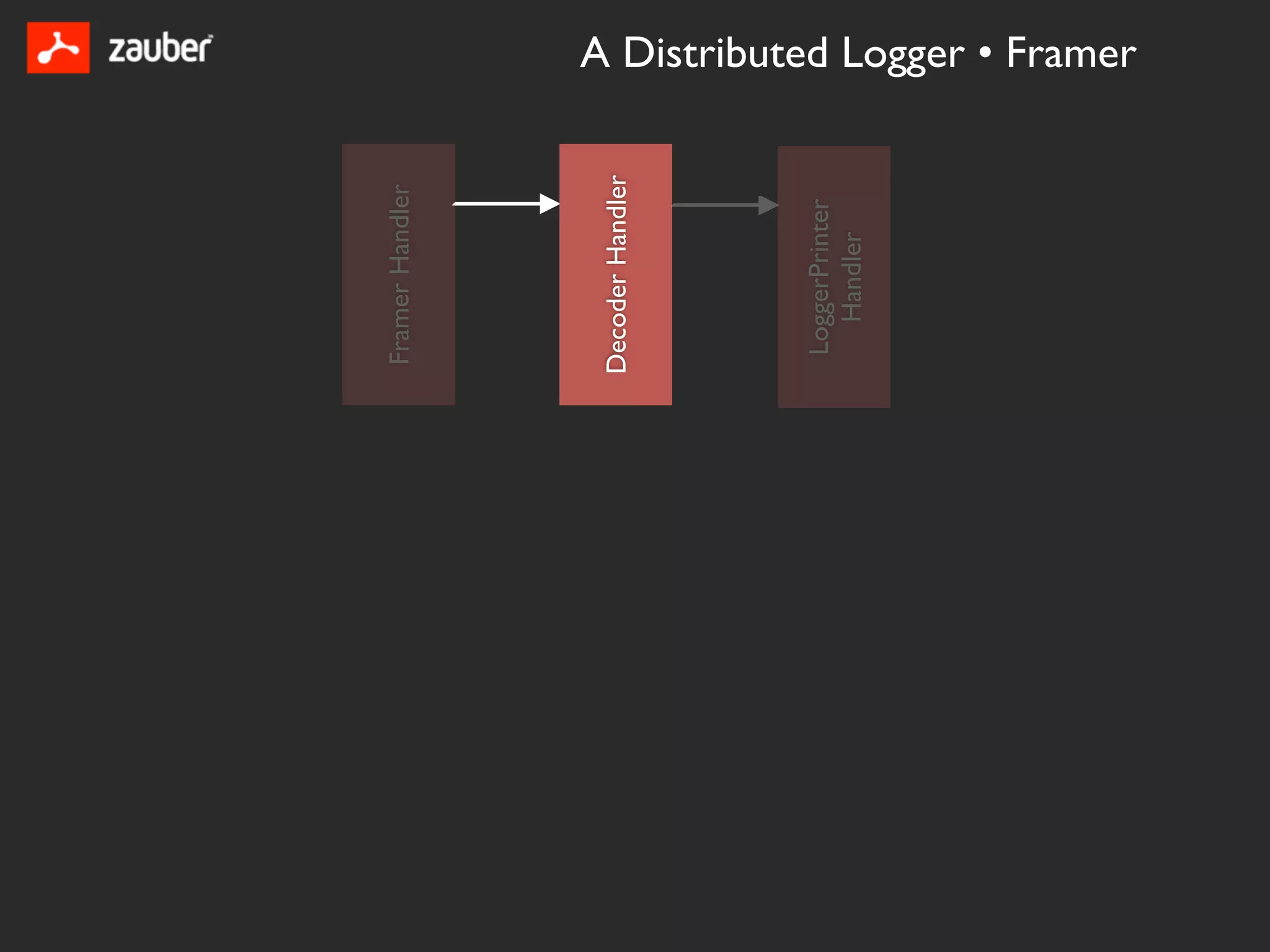
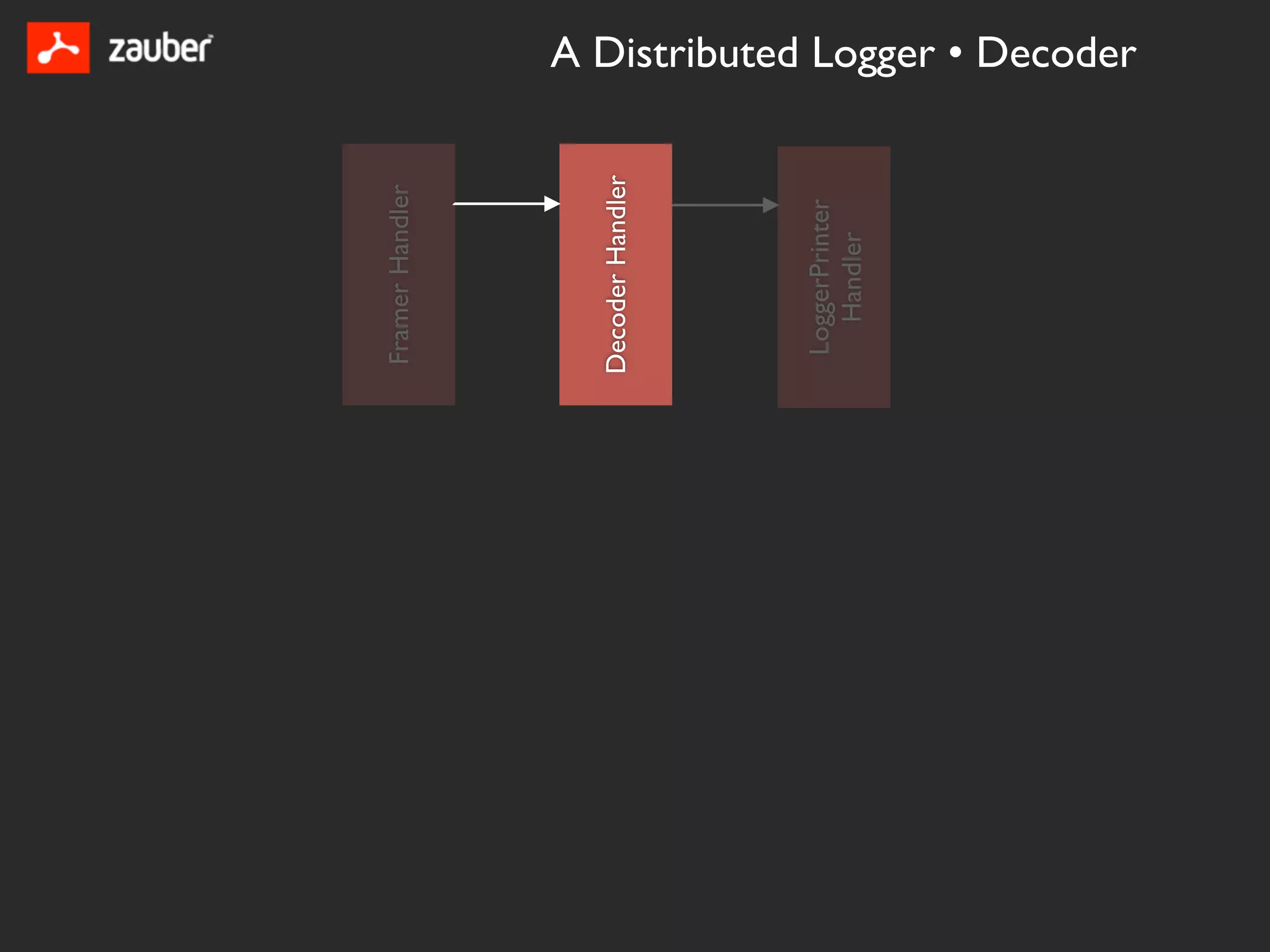
![A Distributed Logger • Decoder Decoder Handler Framer Handler LoggerPrinter Handler Decoder @Override public void messageReceived(ChannelHandlerContext ctx, MessageEvent e) { Charset ch = Charset.defaultCharset(); String msg = ((ChannelBuffer) e.getMessage()).toString(ch); String[] args = msg.split("-", 2); LogEvent logEvent = new LogEvent(Level.valueOf(args[0].trim()), args[1].trim()); Channels.fireMessageReceived(ctx, logEvent); }](https://image.slidesharecdn.com/nonblockingiowithnetty-111102141510-phpapp02/75/Non-blocking-io-with-netty-92-2048.jpg)
![A Distributed Logger • Decoder Decoder Handler Framer Handler LoggerPrinter Handler Decoder @Override El framer deja un public void messageReceived(ChannelHandlerContext ctx, MessageEventmsg { ChannelBuffer como e) Charset ch = Charset.defaultCharset(); String msg = ((ChannelBuffer) e.getMessage()).toString(ch); String[] args = msg.split("-", 2); LogEvent logEvent = new LogEvent(Level.valueOf(args[0].trim()), args[1].trim()); Channels.fireMessageReceived(ctx, logEvent); }](https://image.slidesharecdn.com/nonblockingiowithnetty-111102141510-phpapp02/75/Non-blocking-io-with-netty-93-2048.jpg)
![A Distributed Logger • Decoder Decoder Handler Framer Handler LoggerPrinter Handler Decoder @Override public void messageReceived(ChannelHandlerContext ctx, MessageEvent e) { Charset ch = Charset.defaultCharset(); String msg = ((ChannelBuffer) e.getMessage()).toString(ch); String[] args = msg.split("-", 2); parseo y creación de un LogEvent LogEvent logEvent = new LogEvent(Level.valueOf(args[0].trim()), args[1].trim()); Channels.fireMessageReceived(ctx, logEvent); }](https://image.slidesharecdn.com/nonblockingiowithnetty-111102141510-phpapp02/75/Non-blocking-io-with-netty-94-2048.jpg)
![A Distributed Logger • Decoder Decoder Handler Framer Handler LoggerPrinter Handler Decoder @Override public void messageReceived(ChannelHandlerContext ctx, MessageEvent e) { Charset ch = Charset.defaultCharset(); String msg = ((ChannelBuffer) e.getMessage()).toString(ch); String[] args = msg.split("-", 2); LogEvent logEvent = new LogEvent(Level.valueOf(args[0].trim()), args[1].trim()); Channels.fireMessageReceived(ctx, logEvent); } propago el mensaje, como LogEvent](https://image.slidesharecdn.com/nonblockingiowithnetty-111102141510-phpapp02/75/Non-blocking-io-with-netty-95-2048.jpg)
